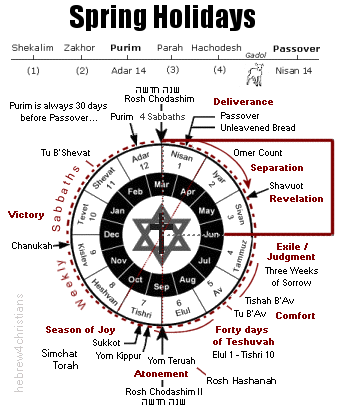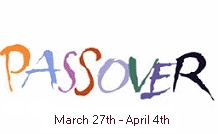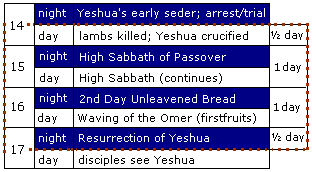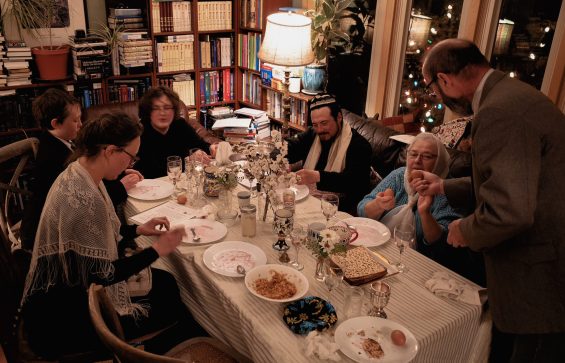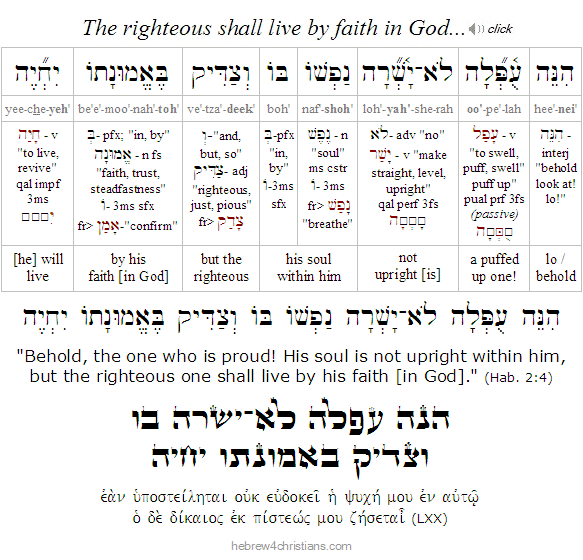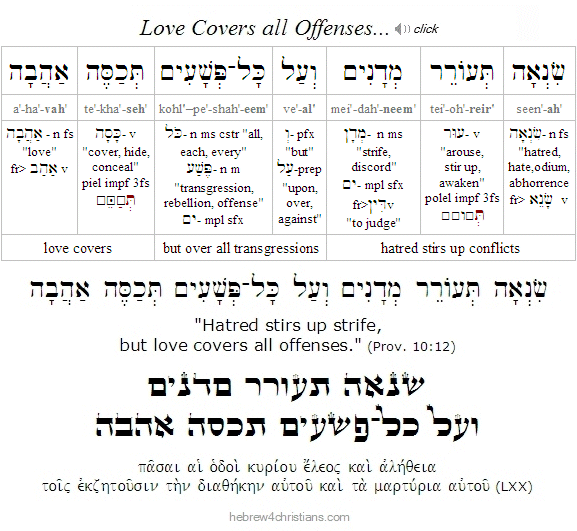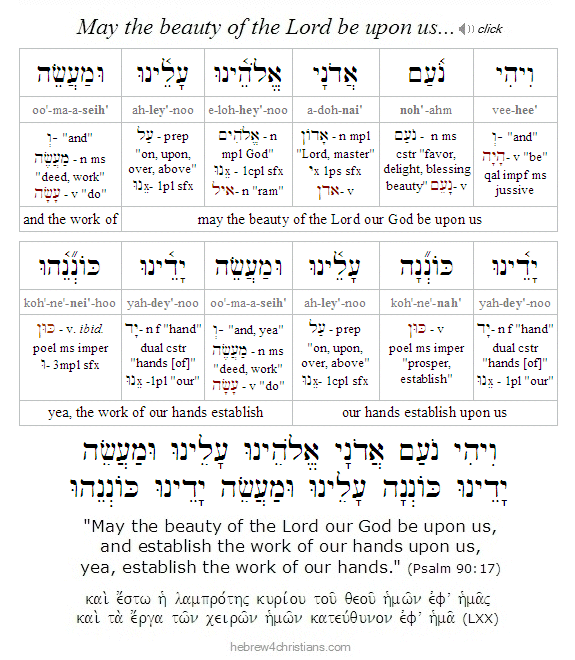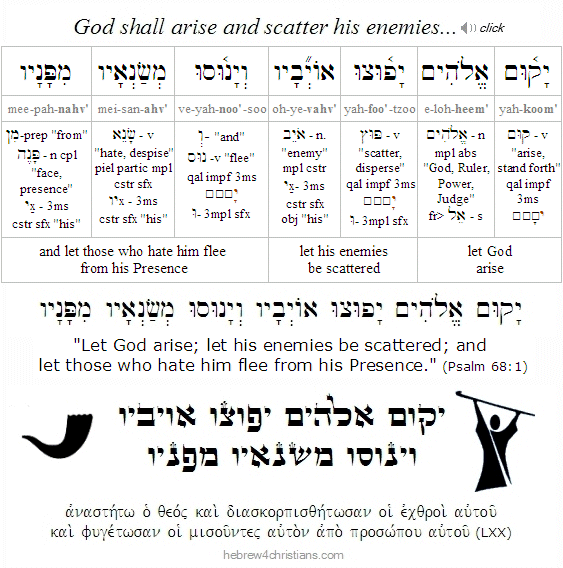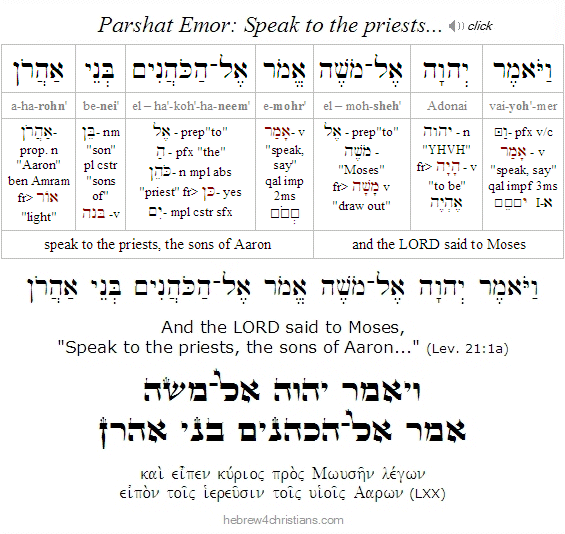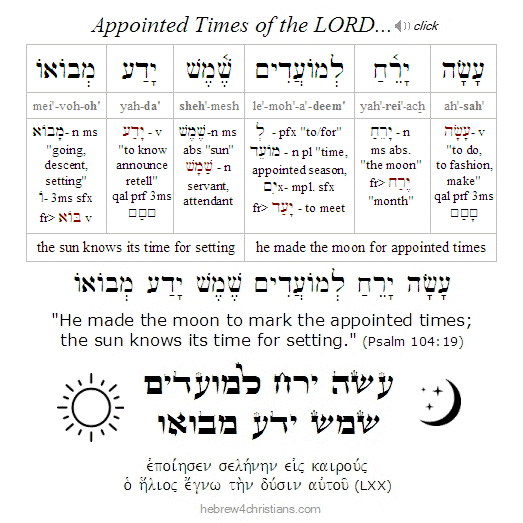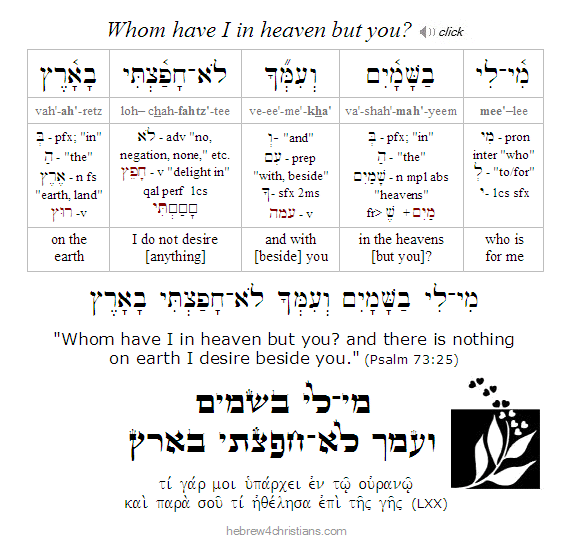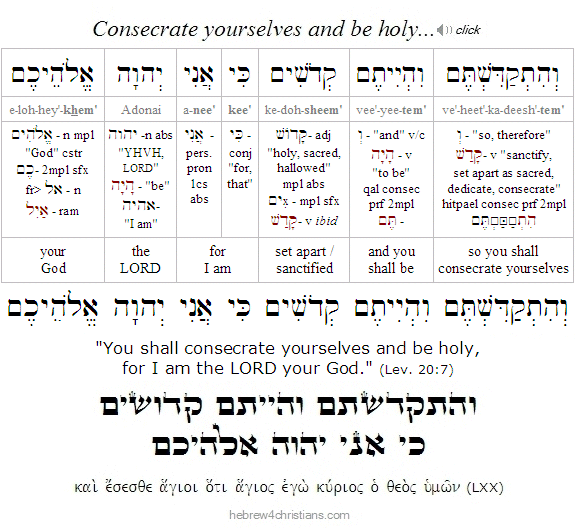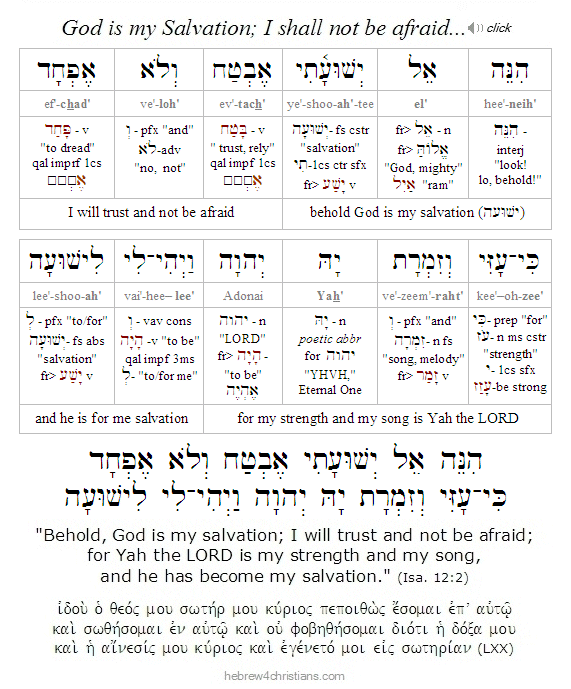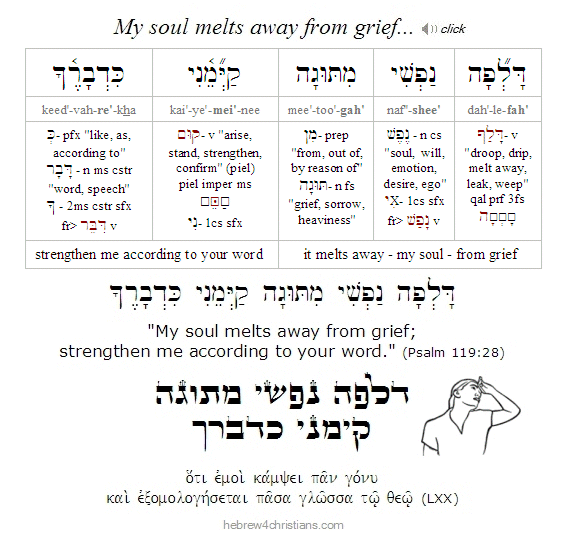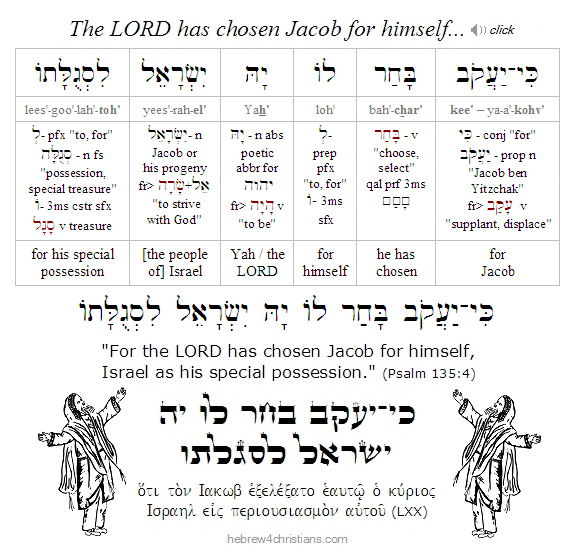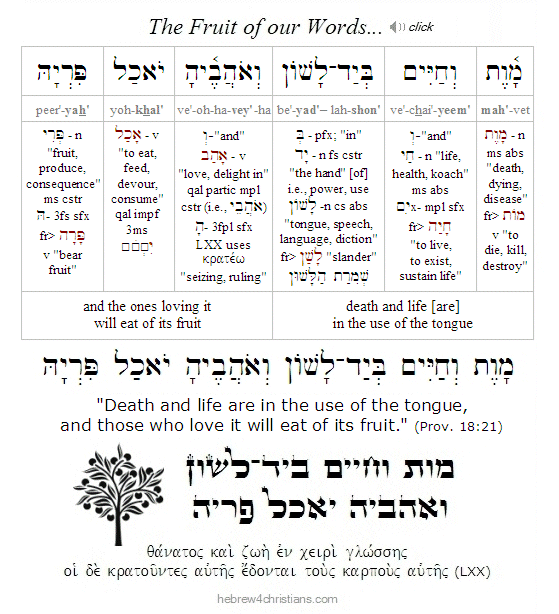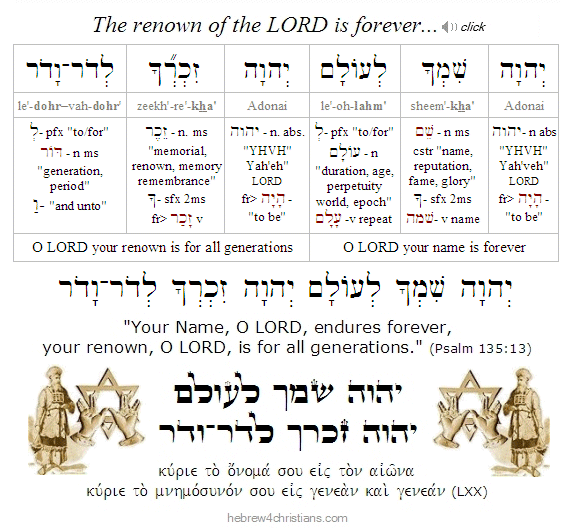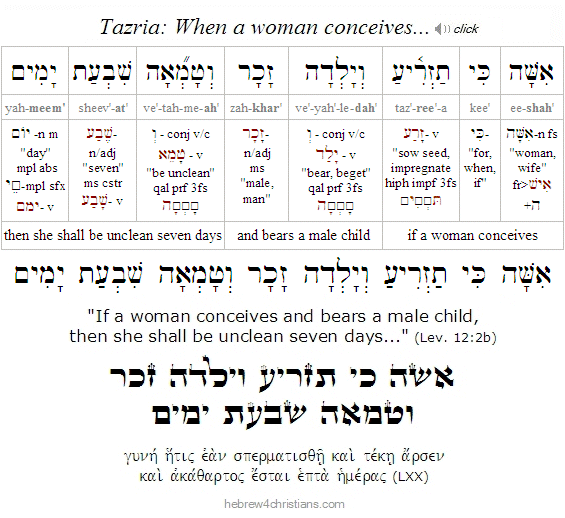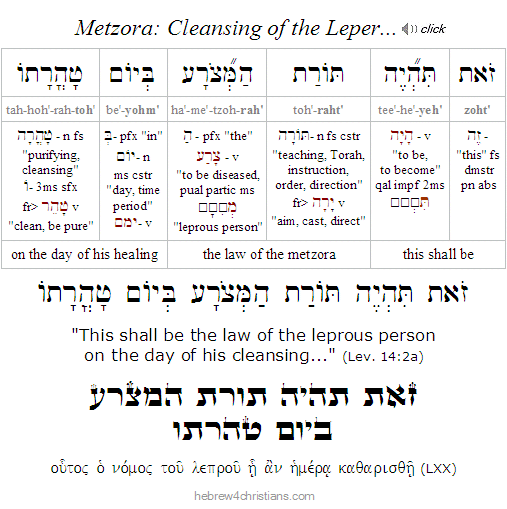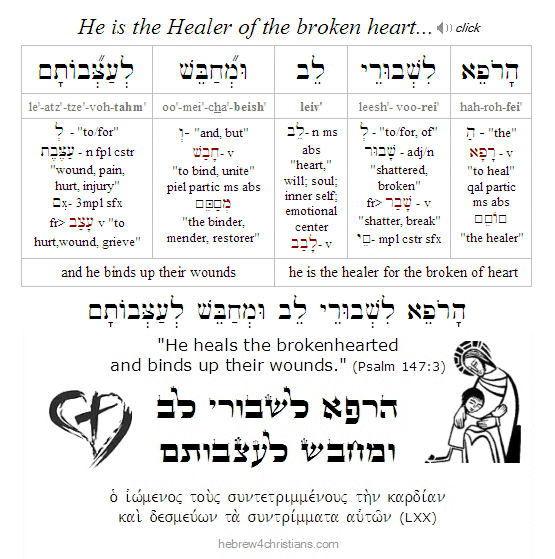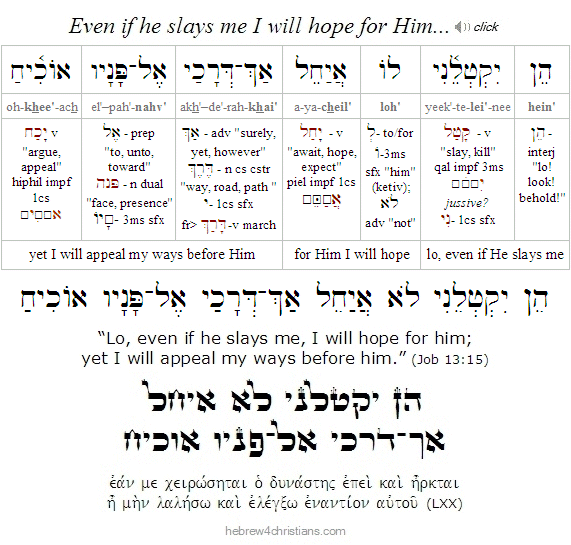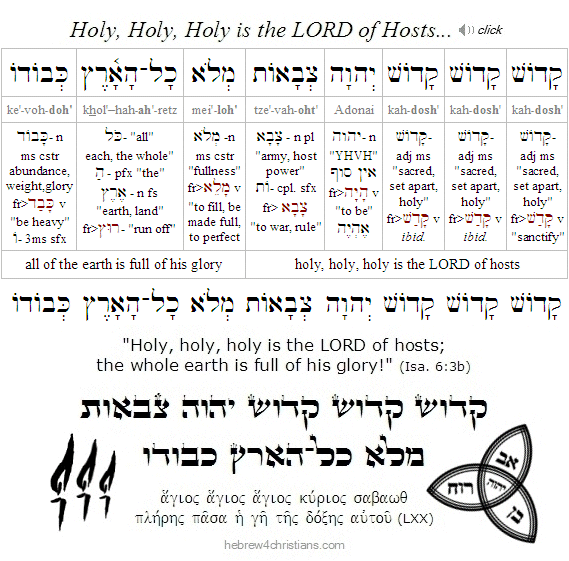|
Jewish Holiday Calendar
For April 2021 site updates, please scroll past this entry....
Spring is the start of the Biblical Year and is marked by two of the Shelosh Regalim (three annual pilgrimage festivals): Pesach (Passover) and Shavuot (Pentecost). The holiday of Shavuot is held seven weeks (or fifty days) following the morning after Pesach.
Dates for Passover 2021:
The Spring Holidays:

The spring holidays (חגי האביב) provide a portrait of the death, burial, and resurrection of the Messiah: Yeshua was crucified on erev Pesach (during the time of the sacrifice of the Passover lambs), buried during Chag Hamotzi (the festival of Unleavened Bread), and was resurrected from the dead on Yom Habikkurim (the Day of Firstfruits). Fifty days after Passover, on the climactic holiday of Shavuot (i.e., the feast of Pentecost), the Ruach HaKodesh (Holy Spirit) fell on the believers in fulfillment of the promise given by our Lord. Note that the giving of the Holy Spirit occurred precisely according to the calendar countdown given in the Torah (Lev. 23:15-16), and that it occurred after the resurrection of Yeshua -- just as our Messiah foretold (John 16:7; Acts 1:6-8, 2:1-4). This proves that the feasts of the LORD (מוֹעדי יהוה) were not abolished after the crucifixion. The meaning of the gospel is prefigured in the holidays given in Torah. See Luke 24:27, 24:44; John 5:46; Acts 26:22, etc.
Kindly note that in accordance with both Torah and Jewish traction, the following holiday dates begin at sundown (ויהי־ערב ויהי־בקר; Gen. 1:5):
- Month of Nisan (Sat. March 13th [eve] - Sun. April 11th [day])
- Month of Iyyar (Sun. April 11th [eve] - Tues. May 11th [day])
- Month of Sivan (Tues. May 11th [eve] - Wed. June 9th [day])
Note: Some calendars will list the first day of a holiday without indicating that the holiday actually begins sundown the night before. For more information see the Calendar pages...

Happy Passover, friends! (click photo for more)
April 2021 Updates
Note: If any page content appears to be missing, please refresh the page...
The Righteousness of God...

04.30.21 (Iyyar 18, 5781) It is not "I obey, therefore I am accepted," but rather, "I am accepted, and that is the obedience (ὑπακούω) of faith." The opposite of sin is not virtue but faith, as Paul said: πᾶν δὲ ὃ οὐκ ἐκ πίστεως, ἁμαρτία ἐστίν, "whatever does not proceed from faith is sin" (Rom. 14:23). Putting it the other way around, trust is the means of attaining God's righteousness and blessing (Eph. 2:8, Rom. 3:20-27). Paul calls this the "law of faith" (i.e., torat ha'emunah: תּוֹרַת הָאֱמוּנָה). Accepting that God is "for you" and "with you," and trusting that you are accepted -- despite your unacceptability -- is the first and most fundamental step of faith, since this honors the love and blessing of God. It is not your wisdom or cleverness that enlightens your way in the truth, however, but the miracle of disclosure from heaven. It is all a gift: you need God to even see that you need God! Right thinking is indeed a path to God, but it is the givenness of truth that enables the seeker to seek; it is the reality of the Teacher (the Savior) that is all-important. By itself true belief does not conjure divine favor, and indeed it may hide the deeper truth that the heart exists in untruth despite the head's "true" doctrine. Likewise, while goodness is indeed a path to God, true goodness is found in God's righteousness that makes the way right for the trusting heart... Genuine obedience to the truth of God - inner connectedness rather than merely outer obedience - marks the divine mercy of transformation.
"Not by works of righteousness (מַעֲשֵׂי הַצְּדָקָה) which we have done, but according to his mercy he saved us (ἀλλὰ κατὰ τὸναὐτοῦ ἔλεον ἔσωσεν ἡμᾶς), by the washing of regeneration, and renewing of the Holy Spirit (רוּחַ הַקּדֶשׁ), whom he poured out on us richly through Yeshua our Savior, so that being justified by His grace we might become heirs according to the hope of eternal life" (Titus 3:5-7). The meaning of the gospel is, among other things, that you believe in the love of God that forever heals us through the life of Yeshua. To those who have ears to hear, this is the deeper meaning of "shabbat" (שַׁבָּת), chaverim!
Note: Of course(!) moral obedience is necessary for us, but that obedience is manifested by the life of Messiah, by our union with Him, by our love relationship, our connection to Him, and by the blessing from heaven (i.e., the Spirit of God).... We "do" Torah truth by means of the One who is the Living Torah, the Heart of Torah, and the Goal of Torah. Shabbat Shalom!
Hebrew Lesson:
The Yoke of Messiah...

04.30.21 (Iyyar 18, 5781) What is the goal of your relationship with God? Is it the hope of paradise where pleasures abound and all your desires are fulfilled? Yeshua taught that the purpose of a relationship with God was to discover divine life by knowing the truth of God revealed in him. He said to his disciples: "This is eternal life (חַיֵּי עוֹלָם) that they may know you the only true God, and Yeshua the Messiah whom you have sent" (John 17:3). Knowing God in this way means understanding his heart and character, and learning to become "mature" (i.e., τέλειον, "complete, whole, finished") through your union with the Messiah (Col. 1:28; Eph. 4:13). Practically speaking we "put on" a new spiritual nature (our "new self") which is created after the likeness of God (כִּדְמוּת אֱלהִים) in true righteousness and holiness (Eph. 4:24). We know and believe who we are as God's beloved children (Rom. 8:29). This is a matter of faith, indeed, but it is also a matter of the will. We must line up our attitudes and emotions in light of the truth of reality...
Immature emotions are out of alignment with what is real, evidencing disordered affections based on illusions. "Putting away childish things" (1 Cor. 13:11) means surrendering or letting die (καταργέω) self-centered emotions and desires, letting go of self-pity or bitterness, and refusing to blame others. Spiritual maturity implies humility, denying yourself, a word that means to stop thinking about yourself (from α-, "not," +ῥέω, "to speak"), and living the truth by sharing God's redemptive vision and mission for others. We must be careful, however, not to drift away, since it is possible to "forget" the truth that once guided our way; and it is possible to become dull of hearing, shortsighted, and to stop growing in relationship with God (Heb. 2:1). Spiritual truth is not merely intellectual but existential: we must earnestly pursue (διώκω) our heavenly calling (Phil 3:14) and this requires the daily and ongoing decision to live before the LORD our God (Psalm 16:8). The invitation to "choose this day whom you will serve" (Josh. 24:15) implies that is your choice - and your responsibility - to draw near to God (James 4:8). We can do this by studying and memorizing Scripture, meditating, praying, and sharing our hope with others. Above all we must ask God for the gift of the Holy Spirit to "bear us up into maturity" (i.e., ἐπὶ τὴν τελειότητα φερώμεθα, Heb 6:1) so that we may learn from our Master who calls us to be joined to his yoke and learn from him (Matt. 11:29).
Hebrew Lesson:
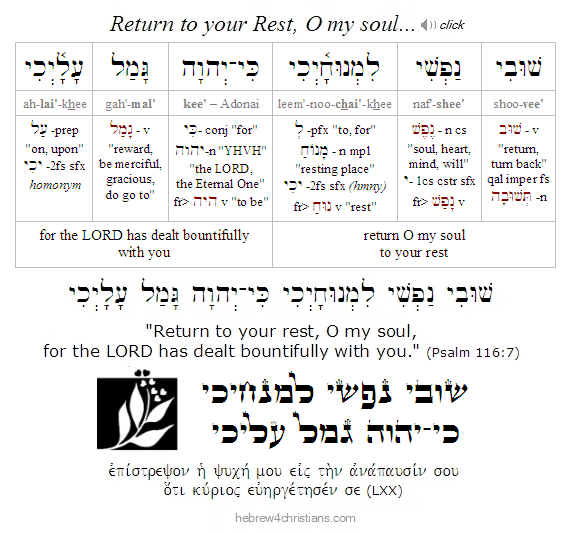 |
Note: A "yoke" is a wooden crosspiece fastened over the necks of two animals that is attached to a plow they pull together... Yokes are used to train one animal in the work of plowing or pulling a cart. When Yeshua says "take my yoke (i.e., עוֹל / ζυγός) upon you, and learn from me, for I am gentle and lowly in heart, and you will find rest for your souls" (Matt. 11:29), the metaphor implies that you will be joined together with him to cultivate the kingdom of God. Yeshua's yoke, however, is not like the yoke of "religion" that leads to slavery, but the yoke of life that leads to love, joy, and peace....
You shall be made whole...

04.30.21 (Iyyar 18, 5781) The Scriptures admonish us to be transformed by "renewing our minds" (Rom. 12:2), though exactly how we are to do this remains an open question. Our perspectives and attitudes are shaped by assumptions we make about life, many of which are "preconscious" or hidden from our awareness. Habitual thoughts, biases, prejudices, fears, and so on, all affect (and can distort) the way we see and understand reality. In light of this, then, how can we change? How can we overcome our habitual negativity, misery, and general unhappiness? How can we develop right thinking power? How can we learn to apply our minds to perceive the good, instead of responding in unreflective and negative ways to our circumstances? How can we discipline our will so that "if there is anything worthy of praise, think about these things" (Phil. 4:8)?
There are countless books on the subject of logic, detecting fallacies, and using sound reasoning techniques, but there are not many that discuss the "morality" or "rightness" of our thinking, that is, our God-given responsibility to perceive the truth and to consistently express it in our everyday actions. And since our thinking invariably leads to practical choices, we have an essential duty to know the truth and live out its implications in our lives. The failure to do so is not only inconsistent, logically speaking, but immoral, ethically speaking (and dangerous, spiritually speaking, since bondage is ignorance of the truth). If the truth bears witness that there is a personal God who creates each soul in the world, for instance, this should affect how we value and respect others, and the failure to do so will result in cognitive dissonance and internal contradiction that will yield mental suffering, misery, emotional pain, and insecurity in our lives. A "double-minded" person is "two-souled" (δίψυχος), unstable (i.e., ungrounded, restless, unbalanced) in all his ways (James 1:8).
Delieverance comes from receiving the light of truth, being "single-minded," with our eye focused on what is real. "If your eye is "single" (i.e., ἁπλοῦς, sincere, focused)," Yeshua said, "your whole body will be filled with light" (Matt. 6:22). This is the "deeper seeing" of faith to discern the truth that underlies existence itself. Likewise the Torah commands: "You shall be made whole (i.e., tamin: תָּמִים) with the LORD your God" (Deut. 18:13). We are made "whole" or "perfect" (i.e., complete) when we resolutely turn to God for healing of our inner dividedness, as it says: "The Torah of the LORD is perfect (תָּמִים), returning the soul" (Psalm 19:8). And where it is written, "Let us hear end of the matter: Fear God and love his commandments, the text adds: ki zeh kol-ha'adam (כִּי־זֶה כָּל־הָאָדָם), "for this is the whole man," suggesting that those who return will be healed of double-mindedness (Eccl. 12:13). Ultimately we are made whole when we are united to God in Messiah, for then we are "with the LORD our God" and the Spirit writes Torah within the heart of faith (Jer. 31:33).
The heart of truth sees beyond the present to find meaning in the Eternal, yet it refocuses on the present to endow it with sacred significance... "Love hopes all things" (1 Cor. 13:7). To rightly see the present moment, in other words, we must first look to the Eternal, since that grounds our perspective and contextualizes our hope: "For this light momentary affliction is preparing for us an eternal weight of glory beyond all comparison, as we look not to the things that are seen but to the things that are unseen. For the things that are seen are transient, but the things that are unseen are eternal" (2 Cor. 4:17-18).
Hebrew Lesson:
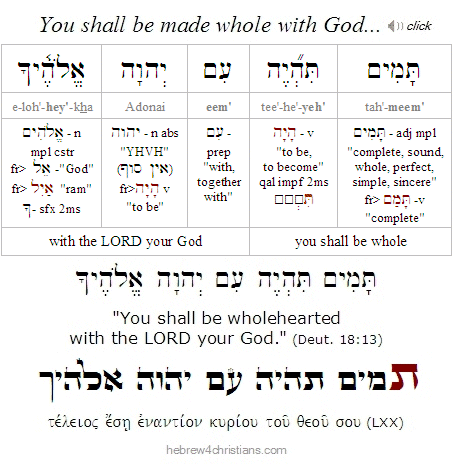 |
Regard this as a prophecy for your life: "You shall be made whole with the LORD your God" (Deut. 18:13). God's love heals the inner brokenness of our hearts. When we accept this, we discover that surrendering to God's will truly makes us "whole." "As many as I love, I reprove and correct: be zealous therefore, and turn. Listen! I stand at the door and knock. If anyone hears my voice and opens the door I will come into his heart and share a meal with him, and he with me" (Rev. 3:19-20). These are words of our Lord Yeshua, who speaks to those who "hear his voice." May we open the door of our hearts and turn to Him now...
Clear Thinking and Teshuvah...
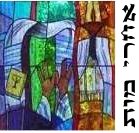
04.30.21 (Iyyar 18, 5781) Consider for a moment how your thinking defines your inner reality and the quality of your spiritual life. Thinking is inextricably linked to faith, and therefore we are responsible not only for what we believe, but for how we think (Acts 17:30-31). Sinful thinking creates "negative energy" that brings pain to yourself and others. Left unchallenged, such impaired cognitive function leads to slavery of the mind, hopeless addictions of thought, and distressing captivity. The first step to freedom is to confess our sin, acknowledging the reality of our own negativity – and bringing that truth to the light. Therefore teshuvah - turning to God - involves cheshbon hanefesh (חֶשְׁבּוֹן הַנֶּפֶשׁ), accounting for our soul and yielding it to the love of God for rectification: "If we confess our sins, he is faithful and just to forgive us our sins and to cleanse us from all unrighteousness" (1 John 1:9). For freedom we have been set free, and that means freedom from the power of the lie. If we are blind to our own sin, we cannot confess the truth to find healing (James 5:16).
Hebrew Lesson:
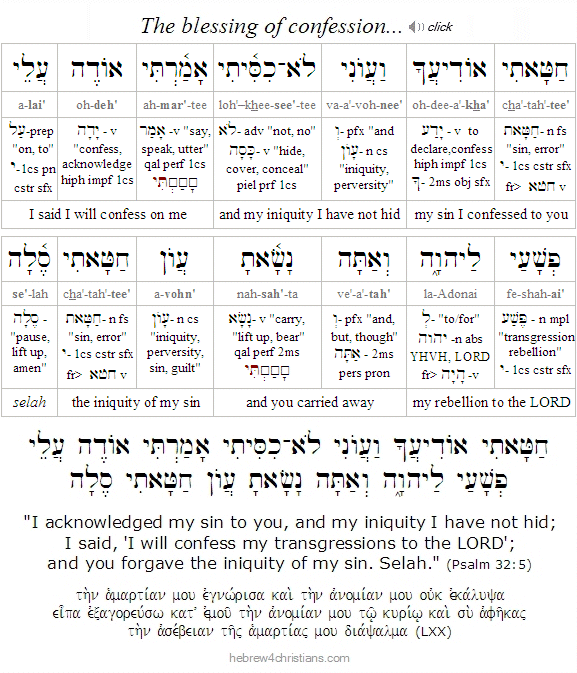 |
What We Really Need...

04.29.21 (Iyyar 17, 5781) "Your heavenly Father knows what you need before you ask him" (Matt. 6:8). We sometimes pray for what we think we need but overlook what we really need. For instance, we may pray for health, material blessing, and opportunity, but what we really need is the ability to trust, the willingness to surrender our lives to God without qualification, and the grace to see the good in others and not their faults. These needs are just as real as our need for food and clothing, since apart from grace to extend empathy and love toward others, we will never be truly happy. Love "overlooks" a multitude of sins; it looks beyond the present moment to see with compassion, kindness, and empathy... What we really need, then, is to be after God's own heart, to see other people as God sees them, and to overlook matters that offend or feed our sense of pride. This is what we truly need, and therefore we trust that the Lord our God mercifully "decodes" our apparent petitions to express what the Spirit of God groans and sighs on our behalf (Rom. 8:26).
Hebrew Lesson
Psalm 109:22 reading (click):
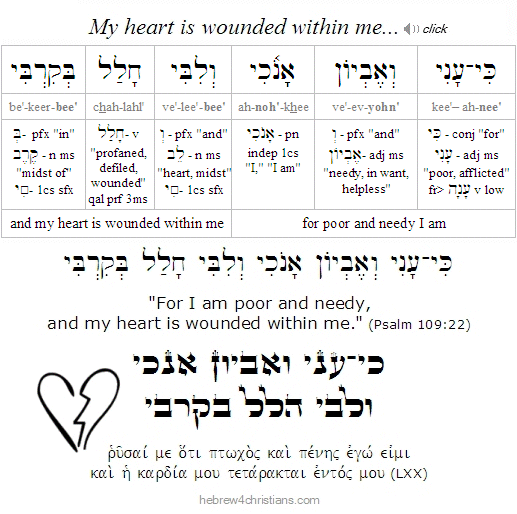 |
Note that the word translated as "wounded" is challal (חָלַל), meaning "stricken, polluted, defiled, pierced, or broken." This is the condition of heart that is prerequisite for doing real business with heaven. "God has not been trying an experiment on my faith or love in order to find out their quality. He knew it already. It was I who didn't. In this trial He makes us occupy the dock, the witness box, and the bench all at once. He always knew that my temple was a house of cards. His only way of making me realize the fact was to knock it down.... I need Christ, not something that resembles Him." (C.S. Lewis: A Grief Observed)
Commit your way to the LORD...
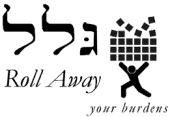
04.29.21 (Iyyar 17, 5781) It is written in our Scriptures: "Commit your way to the LORD, trust also in Him, and he will bring it to pass" (Psalm 37:5). In this verse, the word translated "commit" comes from the Hebrew root galal (גלל), which could be rendered as "roll away" or "heap upon" (the word gal means a heap or pile of stones). The LORD spoke this word when He said to Joshua, "This day have I rolled away (galal) the reproach of Egypt from off you" (Josh. 5:9) and named the place "Gilgal" (גִּלְגָּל), a word-play meaning a wheel or "rolling away." In great mercy the LORD "rolls away" the reproach of our sin.
The word galal can also mean to trust or to commit, with the connotation of "rolling one's trouble" away from oneself upon someone else who can help. Thus the Messiah entrusted (galal) His suffering unto the LORD (Psalm 22:8), and we are likewise encouraged to "commit" (galal) our way to his loving will. When we trust in His love, when we "roll away" the burden of our lives to His care, our thoughts will be "established" and we can freely enjoy the confidence that God Himself is directing our way (Prov. 16:9, Psalm 37:23). We can then experience genuine rest and shalom, despite the tumult of the world and its tribulations.
As the Lord Yeshua cried out, "Come unto Me all ye that labor and are heavy laden, and I will give you rest" (Matt. 11:28), so may we come, rolling away our burdens unto Him, and having our way established in His shalom (1 Pet. 5:7; Psalm 55:22). Amen.
Hebrew Lesson:
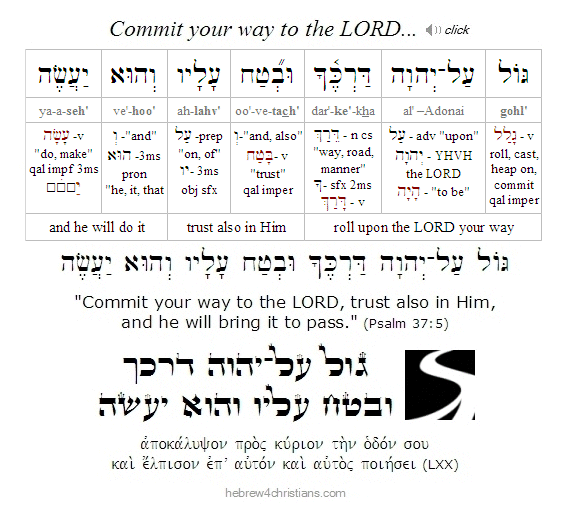 |
Ground of our Spiritual Life...

04.28.21 (Iyyar 16, 5781) Simply knowing about God is insufficient for a transformed life; something more is needed, namely, receptivity of the heart - a sense of concern, a hunger and a thirst for life, and the willingness to believe in the truth of love. Yeshua taught that the condition of our heart is revealed by how we hear. Without charity and a deep sense of concern, loss will inevitably occur: "Take heed therefore how you hear: for whoever has will be given more, but whoever does not have, even what he thinks he has will be taken from him" (Luke 8:18). Like the "good eye" (העין הטובה) that searches for what is good, so the "good ear" listens to the word of hope; yet like the evil eye (העין הרעה) searches for what is evil, so the "evil ear" attends to the message of loss and despair. As we inwardly receive the truth of Yeshua, more truth is revealed; but if we resist, untruth will take root and grow....
Yeshua often employed parables (משׁלים), or analogical stories, in his teaching because they simultaneously conceal and reveal spiritual truth. A parable obscures the truth to those who don't really want it, so that "seeing they may not see, and hearing they might not understand" (Luke 8:9-10; Isa. 6:9-10), and yet it reveals truth to the humble of heart. Since Yeshua's whole life was a parable of sorts - a "disguise" that led to the victory of our deliverance (Phil. 2:7) - it is not surprising that he regularly used "figures of speech" to provoke people to examine their own heart condition and the quality of their faith... In this connection note that Yeshua never explained the "mysteries of the kingdom of God" directly to the crowds, nor did He ever pander to the crowd's clamor or interests. God's word is freely "sown" to all, but it is received only by those who are willing to hear. The message is always directed to the individual willing to follow Him -- to the one who has "ears to hear."
For example, the famous "Parable of the Sower" (Luke 8:4-8) teaches us that God is like a farmer who sows seed upon the "soil" of the human heart, the quality of which may be hard, shallow, choked, or good:
- A "hard heart" (לב קשה) is likened to impenetrable soil that repels the "seed" of the promise of God (ὁ λόγος τοῦ θεοῦ, Luke 8:11). Because of bitterness, a person can become indifferent and numb inside, and this heart condition enables the devil to snatch the seed of hope from the heart like a ravenous bird (Luke 8:12).
- A "shallow heart" (לב רדוד) is likened to topsoil that overlays bedrock. At first the soil receives the seed and quickly begins to grow, but since there is no depth of soil, the growth fails to take root and the growth withers for lack of nutrients and moisture. When tested, the shallow heart reveals its lack of commitment and does not persevere (Luke 8:13).
- A "choked heart" (נחנק לב) is likened to weedy soil that hides other roots that exhibit "thorns," namely worldly fears, the desire for riches, and the pursuit of comfort or pleasures. Such people are double-minded and their spiritual life becomes obstructed, throttled by busyness, distracted by desires for comfort, security, and worldly vanities. They are full of inner conflict and despair and consequently become stunted in their growth (Luke 8:14).
- Finally, a "good heart" (לב טוב) is likened to tilled and receptive soil that receives the seed to yield an abundant harvest: "yielding thirty, sixty, or a hundredfold." Because the righteous honor the seed and nurture its presence, the hidden power of the Life is powerfully released (Luke 8:15). They are also likened to a tree planted by rivers of living water that bring forth fruit in their season (Psalm 1:3). In this connection it is helpful to remember that fruit does not immediately crop up but requires time and its own season... The process of spiritual growth is ultimately mysterious and divine: "The kingdom of God is like someone who spreads seed on the ground. He goes to sleep and gets up, night and day, and the seed sprouts and grows, though he does not know how. By itself (αὐτομάτη, "automatically") the soil produces a crop, first the stalk, then the head, then the full grain in the head. And when the grain is ripe, he comes in with his sickle because the harvest has come" (Mark 4:26-29). With God all things are possible, and the life of God is a miracle that comes from God's own source of Life. It is the fruit of the Spirit, after all, and not the result of human effort or moral reformation...
So the "parable of the sower" teaches us that how we hear will determine the quality of the ground of our spiritual life. If we are honest with ourselves, we will see our own hardness, shallowness, and selfishness in contrast to the fruitfulness marked by the good heart, and this should provoke us to seek God for help... Again, only a new heart (לב חדש) created by power of God's Spirit can possibly yield the fruit of the Spirit (פרי הרוח). "Take care then how you hear, for to the one who has, more will be given, and from the one who has not, even what he thinks that he has will be taken away" (Luke 8:18).
Believers are likened to earthen vessels that hold the treasure of God's truth, and therefore they are in constant need of God's grace to persevere. Therefore Yeshua told his disciples: "I am the true vine, and my Father is the gardener. Every branch in me that does not bear fruit he takes away, and every branch that does bear fruit he prunes, that it may bear more fruit" (John 15:1-2). Note that it is the healthy branch that will be cut back - not the withered one that will be altogether removed – and this purging process may be painful at times. The heavenly Gardener's goal is for the fruitful branch to reveal more and more the connection to the heart of the Vine, so that God is glorified (see John 15:8). The end here is the beatific vision: "Blessed are the pure in heart, for they shall see God" (Matt. 5:8). The goal of "purging" is fruitfulness and blessing, but the agency is not the will of man but the power of God. You are made "clean" through the word of God spoken within your own heart (John 15:3). This is the acceptance of the Messiah's life within you. Your sanctification, however, depends on your communion with God, staying connected to what is real, central, vital, the core truth of God's Presence and love, the ultimate Reality of Life itself.
In light of these things I hope we might better appreciate and understand Yeshua's admonition: "Abide in me, and I in you. As the branch cannot bear fruit by itself, unless it abides in the Vine, neither can you, unless you abide in me. I am the vine; you are the branches. The one who remains in me – and I in him – bears much fruit, because apart from me you can accomplish nothing" (John 15:3-5). Our connection to Yeshua is intended to bear fruit that glorifies God, but if we refuse to find life in him, we would wither and die (John 15:6). We find sustenance and healing only as we remain connected to the Source and Conduit of life, who is the Messiah, the Savior and LORD. True life grows out a heart connection with Him, and without that connection our lives become vain and yield no eternal significance. Nevertheless we must remain encouraged, friend, since God calls us to Himself. This is "the work of faith." Look to heavenly reality and not to the vanity and deceits of this world (Col. 3:1-4). Find life in connection with Yeshua, drawing strength and vitality from your relationship with Him. The fruit of the Spirit is produced as we open our hearts and yield ourselves to the love and presence of the Lord. May you grow in grace and be fruitful in God's love. Amen.
Hebrew Lesson:
Loving the Stranger (אהבת הגר)...

[ The following is related to our Torah reading for this week, Parashat Emor.... ]
04.28.21 (Iyyar 16, 5781) Did you know that one of the most frequently occurring commandments of Torah is to love the stranger? The commandment is repeated in various forms over 30 times in the Jewish Scriptures, for instance: "You shall love your neighbor as yourself: I am the LORD" (Lev. 19:18); "You shall treat the stranger who sojourns with you as the native among you, and you shall love him as yourself, for you were strangers in the land of Egypt: I am the LORD your God" (Lev. 19:34); "Love the stranger, therefore, for you were sojourners in the land of Egypt" (Deut. 10:19); "You shall not wrong a sojourner or oppress him, for you were sojourners in the land of Egypt" (Exod. 22:21); "When a stranger sojourns with you in your land, you shall not do him wrong" (Lev. 19:33); "Do not oppress the stranger" (Zech. 7:10); "Cursed be anyone who perverts the justice due the stranger" (Deut. 24:19); "The stranger shall be as the native born children of Israel among you" (Ezek. 47:22), "There shall be one law for the native and for the stranger who sojourns among you"(Exod. 12:49; Num. 15:16), and so on. Clearly the LORD does not want people to feel ostracized, excluded, or otherwise left out of His providential and loving plans... Indeed, the message of the universal love of God is at the heart of the gospel itself, hearkening back to God's earliest promises to redeem humanity and restore paradise lost. "Religion," tribalism, prejudice, ethnic pride, and so on, are anathema to the Kingdom of God.
Hebrew Lesson:
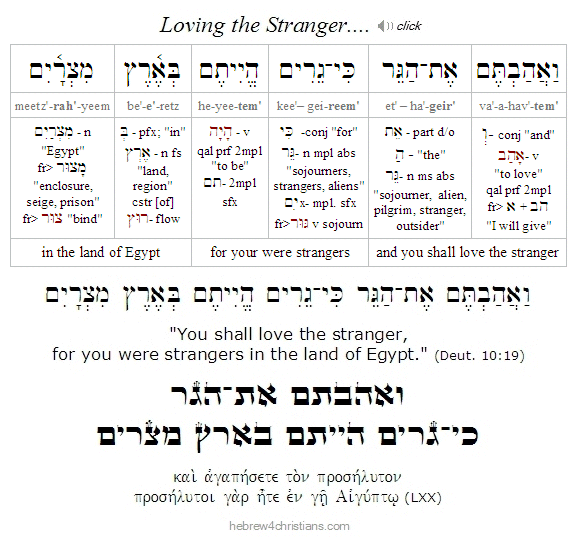 |
Jewish tradition says that King David was born on Shavuot ("Pentecost"), the holiday of shtei ha-lechem, the "two loaves" that prophetically foretold of the advent of the "one new man" (Eph. 2:14-22) and of the mysterious inclusion of the Gentiles into the covenant promises of God (Eph. 3:6). God has a great compassion for the outsider, for the lost, for the orphan and those who are without inheritance in this world. During Shavuot it is customary to read the Book of Ruth which tells the story about redeeming love and the advent of King David. Recall that King David was a direct descendant of Ruth, who as a Moabitess was an outsider and "stranger" to the promises of God (Ruth 4:17). Despite being part of an despised and rejected group of people (see Deut. 23:3), Ruth overcame the law's demand by believing in the love and acceptance of a redeemer of Israel (Ruth 3:9). Ruth's great grandson was named David (דָוִד), meaning "beloved," which has the same numerical value as the word "hand" (יָד). It is no wonder that the LORD chose David to represent God's extended hand of love for the stranger, for the convert, for the outsider, the leper, and the lost, since his descendant Yeshua the Messiah came to love and redeem the entire world by means of His outstretched hands. ברוך הוא יהוה ישוע
"I was a stranger and you welcomed me" (Matt. 25:35). We are commanded (i.e., blessed) to practice ahavat ha'geir (אהבת הגר), the "love of the stranger." This means showing compassion and empathy to an "outsider" who may question their worth and place in your midst... On a somewhat deeper level, the duty to "love the stranger" applies not only to someone whom we regard as an "outsider," but more radically to the "stranger within ourselves," that is, to those aspects of ourselves we censor, deny, or reject. Self-hatred is a spiritual dead-end, chaverim.... Like the prodigal son, we have to "come to ourselves" to return home (Luke 15:17), yet we can't know that we are unconditionally loved until we venture complete disclosure and seek acceptance - despite the mess of our lives. That is the great risk of trusting in God's love for your soul. Those parts of ourselves that we "hide" need to be brought to the light, healed, and reconciled. After all, if we don't find healing for our self-rejection and pain, how can we hope to love and accept others? Dear Lord, deliver us from the torment of self-hatred, in the Name and passion of your love, amen..
 |
A Blessed Recompense...
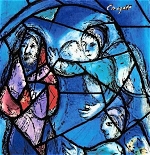
04.28.21 (Iyyar 16, 5781) Our Torah for this week (i.e., parashat Emor) contains more mitzvot (i.e., commandments, blessings) regarding holiness than any other Torah portion (the sages cite no less than 63 distinct commandments). In addition, the portion provides a list of the eight main holidays, or "appointed times" (i.e., mo'edim: מוֹעֲדִים), found in the Jewish Scriptures. These "festivals of life" are sometimes called mikra'ei kodesh (מִקְרָאֵי קדֶשׁ), "times in which holiness is proclaimed" (Lev. 23:2). Note that this is the first time that the Torah reveals a comprehensive description of the festivals of the year, which include the following:
- The Sabbath (יום השבת) - The weekly observance of Shabbat that commemorates God as the Creator of the world. According to the sages, Shabbat is the most important of the appointed times, even more important than Yom Kippur and the Ten Days of Awe. There are 54 weekly Sabbaths in a "leap year" and 50 for regular years... In addition to the Sabbath are monthly Sabbaths (שבתות חודשיות) called Rosh Chodeshim.
- Pesach (חג פסח), also called Passover. This reveals the redemption from death that comes from the sacrificial blood of the Lamb of God...
- Unleavened Bread (חג המצות) - This denotes the sanctification of the people of God, the "crossing over" into the realm of Promise. Note that the Counting of the Omer (ספירת העומר) is also first mentioned in this section of Torah (Lev. 23:9-16).
- Firstfruits (ום בכורים), also called Yom HaBikkurim or Reishit Katzir. This marked the first wave offering (תנופת העומר) of the new harvest which symbolized the time of the resurrection of Messiah and the victory of Life over the powers of hell and death.
- Shavuot (חג השבועות), also called "Weeks" or "Pentecost." This marks the climax of the Passover Season, the giving of Torah at Sinai and the giving of the Ruach (Spirit) at Zion. It is the advent of the New Covenant for all nations, tribes, and tongues...
- Yom Teru'ah (יום תרועה), also called "Rosh Hashanah" (note that this is the first time this is revealed in Torah). This marks the start of the final "week of years" of the End of Days and time of worldwide judgment... the "Great Tribulation."
- Yom Kippur (יום כיפור) also called the Day of Atonement. This denotes the national cleansing and restoration of the Jewish people at the end of the Tribulation Period.
- Sukkot (חג סוכות) also called "Tabernacles" (note that this is the first time the commandments to dwell in a Sukkah and to wave the arba minim (four species) are mentioned in the Torah). This denotes the Millennial Kingdom and Sukkah of God established as Zion. (The two winter holidays of Chanukah and Purim are alluded to in this portion as well: see the parashah summary for more information.)
Notice that there is a restatement of the commandment to leave food for the poor and the stranger (called "pe'ah," "leket," "shikhah") that appears right in the midst of the list of the Biblical holidays (see Lev. 23:22), which the sages said was intended to remind us to help those in need, especially during these times. Hence the giving of tzedakah is a regular part of the Jewish holidays (e.g., giving ma'ot chittim [מַעוֹת חִטִּים] "money for wheat" during Passover, matanot la'evyonim [מַתָּנוֹת לָאֶבְיוֹנִים] for Purim, and so on). The sages ask, "Why did God place the mitzvah of helping the poor while speaking about the holidays and their particular sacrifices? To teach us the greatness of charity: 'God credits whoever gives charity to the poor as if they built the Holy Temple and presented offerings therein to God.' Indeed, Yeshua taught us that giving a gift to the poor is giving a gift to God Himself (Matt. 25:40).
מלוה יהוה חונן דל
וגמלו ישׁלם־לו
mal·veh · Adonai · cho·nein · dahl
oo·ge·moo·lo · ye·sha·lem-loh

"Whoever shows pity to the poor lends to the LORD,
and his kindness will be repaid to him."
(Prov. 19:17)

Hebrew Study Card
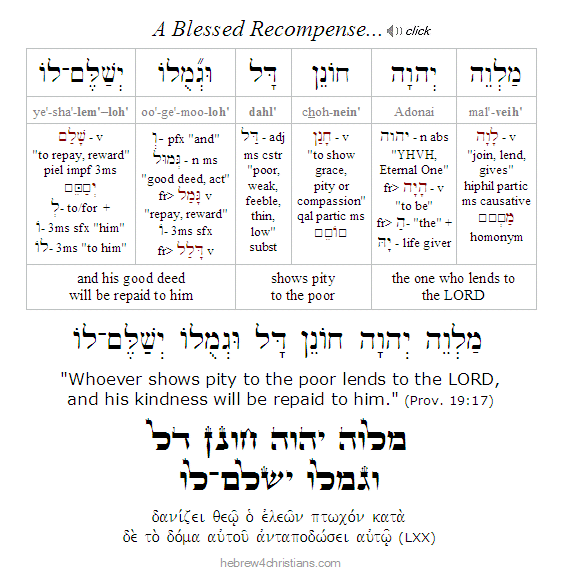
Since there are at least 50 weekly Sabbaths in a Jewish year in addition to the seven prescribed holidays (not to mention Rosh Chodesh and the other holidays such as Purim, Chanukah, Israel Independence Day, etc.), it is no wonder that the Scriptures declare: "A person with a cheerful heart has a continual celebration" (Prov. 15:15). The moedim are times to cheerfully give thanks to the LORD for all He has done.... Amen.
Mercy's Like-for-Like...

[ The following is related to our Torah reading for this week, Parashat Emor.... ]
04.28.21 (Iyyar 16, 5781) In our Torah portion this week we read, "whatever injury he has given a person shall be given to him" (Lev. 24:20). Some of the sages comment that this is not so much about "eye for eye, tooth for tooth" retributive justice as it is about the reciprocity of the will. As you see others, so you will see yourself; as you cause a defect in another, so it will be given to you, as you forgive, so you will be forgiven... Therefore the Baal Shem Tov observed, "Other people are like mirrors: the faults we see in others our own," and the corrective approach is therefore to use the "good eye." As Yeshua taught us: "condemn not and you will not be condemned; release, and you will be released" (Luke 6:37). As we forgive others, so we will find our own forgiveness. "Love covers all offenses (Prov. 10:12).
Hebrew Lesson:
Torah for Life...
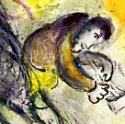
04.27.21 (Iyyar 15, 5781) The receiving of the Torah (מתן תורה) must take place each and every day, as it says, "Trust in the LORD 'bekhol libekha' (בְּכָל־לִבֶּךָ) - with all your heart; and know Him 'bekol derakhekha' (בְּכָל־דְּרָכֶיךָ), in all your ways" (Prov. 3:5-6). The revelation of Torah is described as a "loud and never-ending voice" (Deut. 5:22), though it is our constant responsibility to shema – to receive the invitation of God's heart.
"Trust in the LORD with all your heart and do not rely on your own understanding" (Prov. 3:5). The Hebrew word for trust is "bittachon" (בִּטָחוֹן), from a root word (בָּטָח) that means "to lean upon," to feel safe and secure (Psalm 31:19). Bittachon expresses the emotional acceptance of the goodness of the Lord. Some of the sages have said that while emunah (אֱמוּנָה), or "faith," means rationally understanding that God is involved in all the events of the universe, bittachon means emotionally trusting that the God is present in every situation for your good.... Rabbi Bechaya noted, however, that while everyone with bittachon has emunah, not everyone with emunah has bittachon. In other words, those who genuinely trust the Lord have faith, but not everyone who has faith genuinely trusts the Lord... Trust, or bittachon, is earnest surrender to God's heart and truth. We trust when we let go of our need to control and no longer rely on our own understanding. Walking in bittachon means having an intuitive awareness of the personal love of God for your life, coupled with full assurance that He deeply cares for you (Rom. 8:28). It is an expectation that the love of God is "for you" -- and that you are made safe in his love....
"In all your ways know Him, and he will direct your paths" (Prov. 3:6), and that means knowing God in whatever way you find yourself in, which of course includes the way of your struggles, your transgressions, your fears, and your heartaches, as well as the way of your deepest longings and hope... As you know God in all your ways, as you pray and reach out in trust for his guidance and will, he will guide you on the way of life (Psalm 23:3). Amen.
Hebrew Lesson
Proverbs 3:5-6 reading (click):
A Living Faith...

04.27.21 (Iyyar 15, 5781) We read in our Scriptures: "You shall keep my decrees and my judgments, the pursuit of which man shall live: I am the LORD" (Lev. 18:5). The Kotzker Rebbe advised reading this verse as "You shall keep my decrees and judgments to bring life into them," meaning that we should bring all our heart, soul, and strength into the teaching of Torah. The commandments nourish the soul as food does the body. Just as we seek to season our food to make it flavorful, so we seek to observe the truth with conviction and joy. "May the beauty of the LORD our God be upon us: and establish the work of our hands upon us; yea, establish the work of our hands" (Psalm 90:17).
ויהי נעם אדני אלהינו עלינו
ומעשׂה ידינו כוננה עלינו
ומעשׂה ידינו כוננהו
vee·hee · no'·am · Adonai · e·lo·hey'·noo · a·ley'·noo
oo·ma·a·seh · ya·dey'·noo · ko·ne·nah · a·ley'·noo
oo·ma·a·seh · ya·dey'·noo · ko·ne·nei'·hoo

"May the beauty of the Lord our God be upon us,
and establish the work of our hands upon us;
yea, establish the work of our hands."
(Psalm 90:17)
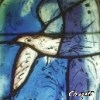
Hebrew Lesson:
Miracle of a New Heart...

04.27.21 (Iyyar 15, 5781) In the Sermon on the Mount Yeshua warned that our righteousness should exceed that of the religious leaders of his day (Matt. 5:20), and he went on to say: "be perfect, as your heavenly Father is perfect" (Matt. 5:48). Here we note that the Greek word translated "perfect" (τέλειος) may mean "mature" or "fully developed" more than morally flawless, though regarding moral and spiritual practice this distinction is not clear cut, especially if by "mature" we mean godly in character, as the context of Yeshua's statement clearly implies (see Matt. 5:1-48). The Hebrew word translated as "perfect" (תָּמִים) can also mean "complete," but it can connote being "wholehearted," "sound," or even healed (שָׁלֵם). So the question arises, does the word "perfect" mean "flawless" or "healed" -- or perhaps both?
Of course we affirm that God alone is truly perfect (Deut. 32:4; Psalm 18:30), completely good (Matt. 19:17), flawlessly righteous (Psalm 145:17), entirely holy (Isa. 6:3; Rev. 15:4), and peerlessly unique (Exod. 15:11; Jer. 10:6-7), but how can we relate to God's overmastering perfection in the midst of our daily flaws and chronic imperfections? How dare we approach "to offer the bread of God" (Lev. 21:17)?
Followers of the LORD are called to be a nation of priests, a "select people," set apart to serve God in holiness (Exod. 19:5-6; 1 Pet. 2:9; Lev. 11:45), but it is clear we are blemished, imperfect, blind, halt, needy, and unclean... This is common to the human condition: all of us, Jew or non-Jew alike, are broken, flawed, and in the midst of the inevitable flow of life that leads to death and decay (Rom. 3:23). We are sick with sin and unable to heal ourselves, and therefore we need a radical transformation - "deliverance from ourselves" – that must come through divine intervention and the miracle of spiritual rebirth (John 3:3,7).
Nevertheless in this world the paradox still remains: we are finite yet long for the undying, the infinite; we are in flux yet anchored in hope; we are a "new creation" yet still saddled with the old nature; we are made holy yet we live in the midst of the profane; we are purified yet still need cleansing; we are healed yet are still wounded; we are redeemed of God yet still need to turn to God in teshuvah; we die daily yet have eternal life. Our hearts are to be a divine sanctuary, yet we are powerless to make God appear in our midst...
Perfection haunts us; we often confuse the ideal and the real. Our romantic visions fail us; all of us are strangers, wanderers, in lonely exile. And the question then becomes – how do we embrace the "already-not-yet," the process, the fleeting days with their poignant moments – within the context of real hope, a vision that heals and brings us real comfort? How do we make peace with our imperfections, our present darkness, and our hunger for deliverance? How do we envision healing in the midst of our brokenness?
Ironically those defects that disqualify us as priests can be transformed (by grace) into compassion for others, and this can enable us to reach out to God in the midst of our flawed existence... After all, the deepest role of the priest is to draw others near to God, but this requires empathy and awareness of the needs of others. Therefore God clothed himself with our frailty, our infirmities, and the brokenness of our sin in order to redeem us in Yeshua. As it is written, we have a high priest who is able to sympathize with our weaknesses (Heb. 4:15). The priest of the New Covenant is a mediator through through poverty of spirit and mourning (Matt. 5:3-8). Just as Joshua the high priest was graciously given robes of righteousness in exchange for his filthy garments (Zech 3), so we are given an imputed righteousness that comes through trusting in "the One who justifies the ungodly" (Rom. 4:5). "For our sake God made Him (i.e., Yeshua) to be sin who knew no sin, so that in him we might become the righteousness of God" (2 Cor. 5:21). This is a righteousness that is "apart from the law, though the law and prophets testified of it; namely, the righteousness of God given through the faithfulness of Yeshua the Messiah" (Rom. 3:21-22). Our present groaning for the complete deliverance is a gift given by the Spirit of God crying out within our hearts (Rom. 8:22-23).
C.S. Lewis once remarked, "God doesn't love you because you are good, but He will make you good because He loves you." This goodness is the miraculous inner working of an imparted godliness, the divine gift of a new heart and spirit (Ezek. 36:26). Awaken to your eternal perfection in the world to come: "You shall be perfect even as your heavenly Father is perfect" can be read as a prophecy. Do not give up, friends; do not succumb to despair. We must learn to endure ourselves and believe in the healing to come. "Do not lose heart. Though our outer self is wasting away, our inner self is being renewed day by day. For this light momentary affliction is preparing for us an eternal weight of glory beyond all comparison, as we look not to the things that are seen but to the things that are unseen. For the things that are seen are transient, but the things that are unseen are eternal" (2 Cor. 4:16-18). And may God help us walk in perfect faith in His unfailing love (Phil. 3:14).
Hebrew Lesson:
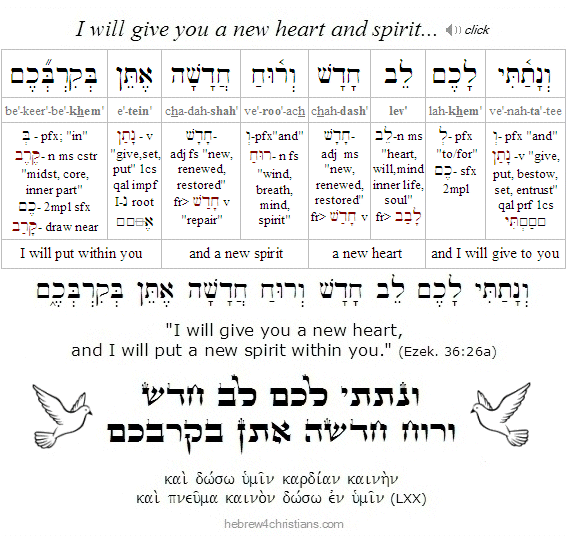 |
Honoring God's Name...

[ The following is related to our Torah reading for this week, Parashat Emor.... ]
04.26.21 (Iyyar 14, 5781) From our Torah this week we read: "You shall not profane my holy Name, that I may be made sacred among the people of Israel" (Lev. 22:32), which the early sages said provides the basis for "kiddush HaShem" (קידוש השם), or the duty to always honor God, even if that might mean accepting martyrdom for your faith. Jewish halakhah (law) furthermore says we are to think of kiddush hashem whenever we recite the Shema, that our inmost intent should be self-sacrifice (mesirat nefesh), or the willingness to give up your life to God in complete surrender. After all, if we are not willing to give up our lives for God, how can we be willing to genuinely live for him? The purpose or goal of our existence is to know and love God, to be sanctified in truth, but if we value our carnal lives on earth as more important, we exist in a state of contradiction. Therefore people obsessed with their own physical safety, health, pleasure, happiness, well-being, etc., do not know the true meaning of life. Our lives on this earth were not meant to be an end in themselves, but rather a means to the greater end of knowing and loving the Eternal God. Indeed, God's love is better than any sort of life this present world can afford. As Jim Elliot once said, "He is no fool who gives what he cannot keep to gain what he cannot lose."
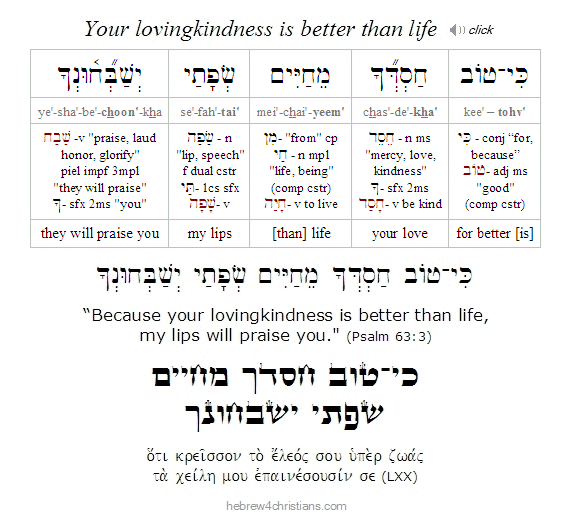 |
Sanctifying God's Name means we regard our relationship to God to be an end in itself - our ultimate concern - and there is therefore nothing higher that may challenge our duty before heaven. "Seek first the kingdom of God and his righteousness" (Matt. 6:33). Indeed our mortal life in this fleeting world is a means to the end of reaching our eternal destiny, and esteeming the means above the end is therefore idolatry (Rom. 1:25).
Our faith in the LORD may lead us into collision with the world and its spurious power structures, however "we ought to obey God rather than men" (Acts 5:29). Taking a stand for Torah truth will make you an outsider to the "crowd" and its endless idols and vanities. Indeed a person of genuine moral conviction may be labeled an "enemy of the state," may be persecuted as a "terrorist," and may even suffer martyrdom. Shadrach, Meshach, and Abednego rightfully defied the king's decree to bow down before the "golden image," and they confessed that they were willing to die rather than betray the truth of the LORD of Israel (see Dan 3). This is a prime example of kiddush HaShem, of honoring the truth of God even at the risk of losing our lives. For many Jews, reciting the Shema is a solemn declaration that we esteem the truth of God above all things, that God alone is our ultimate good, and that we must be willing to surrender our lives rather than to deny the greatness and glory of His Name. May tzaddikim have died with the Shema on their lips...
Kiddush HaShem may be understand both literally and metaphorically. Literally understood, kiddush HaShem (i.e., martyrdom) is a possibility, one of the severest tests that may be given to the soul, and the temptation is to shrink back from the threat of death by denying the faith... Metaphorically understood, kiddush HaShem is a necessity, an essential act of the will that decides to "take up the cross" and follow Yeshua, and the temptation is to minimize the truth, to compromise the faith, and to slowly fade away... Yeshua asks, "What will it profit a person if he gains the whole world and forfeits his soul?" (Mark 8:36). Indeed, finding your life, value, and "place" here is to exile yourself from the promise of heaven. As Yeshua said, "Whoever finds his life will lose it, and whoever loses his life for my sake will find it" (Matt. 10:39). What is required, in other words, is categorically everything, with nothing left over...
Hebrew Lesson:
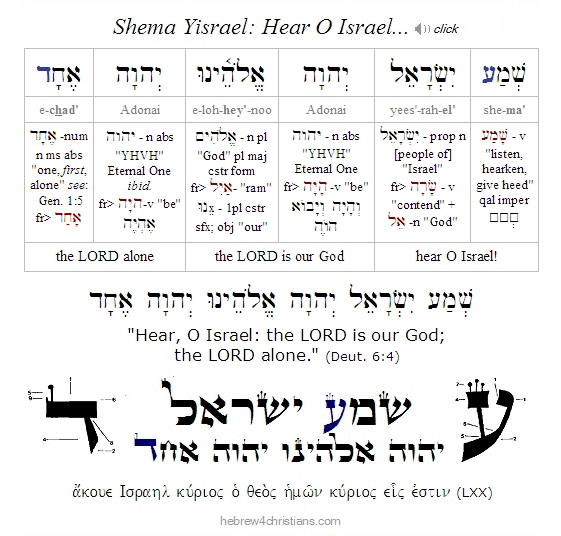 |
Signs of the Time...

04.26.21 (Iyyar 14, 5781) Despite the evident and manifold increase in the various prophetic "signs" that herald the return of Messiah, many people today seem apathetic and functionally agnostic regarding the imminence of the "End of Days..." Ironically, this indifference itself indicates the nearness of the hour, since Yeshua noted that just before the time of his return many would fall away because of a chosen ignorance of the truth and pervasive numbness of heart (Matt. 24:12). Therefore he rhetorically asked his followers, "When the Son of Man comes, will he find faith on earth?" (Luke 18:8). We are repeatedly urged to watch, to be vigilant, and to be ready: "Therefore you also must be ready, for the Son of Man is coming at an hour you do not expect" (Matt. 24:44).
יָקוּם אֱלהִים יָפוּצוּ אוֹיְבָיו
וְיָנוּסוּ מְשַׂנְאָיו מִפָּנָיו
yah·koom · e·loh·heem · yah·foo'·tzoo · o·ye·vahv
ve·yah·noo'·soo · mei·san·ahv · mee·pah·nahv

"Let God arise; let his enemies be scattered;
and let those who hate him flee from his Presence."
(Psalm 68:1)

Hebrew Lesson:
Parashat Emor - אמור

04.25.21 (Iyyar 13, 5781) Our Torah portion for this week (parashat Emor) lists the eight main holidays explained in the Jewish Scriptures. In the Torah, these "holidays" are called "appointed times" (i.e., mo'edim: מוֹעֲדִים), a word which comes from the Hebrew root meaning "witness" (עֵד). Other words from this root include edah (עֵדָה), a "congregation," edut (עֵדוּת), a "testimony," and so on. The related verb ya'ad (יָעַד) means "to meet," "to assemble," or even "to betroth." The significance of the holy days, then, is for the covenant people of the LORD to bear witness to God's love and faithfulness. As it is written:
כל־ארחות יהוה חסד ואמת
לנצרי בריתו ועדתיו
kohl - or·khot · Adonai · che'·sed · ve·e·met
le·no·tze·rei · ve·ree·to · ve·e·do·tahv

"All the paths of the LORD are compassion and truth
to those keeping his covenant and his testimonies."
(Psalm 25:10)

Hebrew Study Card
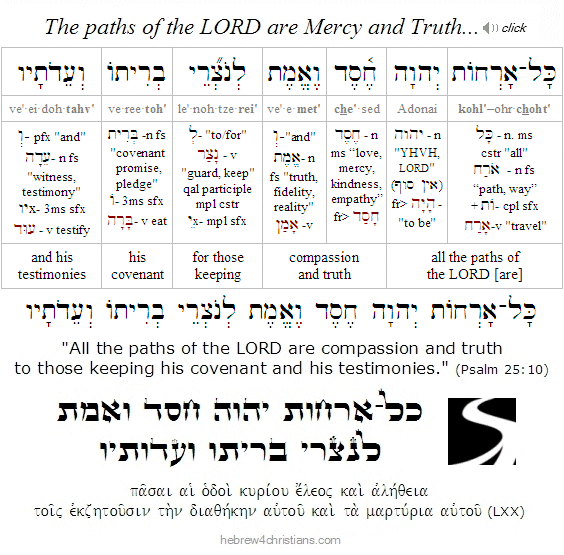 |
Metaphorically the "paths of the Lord" (i.e., orechot Adonai: ארחות יהוה) are likened to ruts or grooves created by the wheels of a caravan (i.e., orechah: ארְחָה) passing repeatedly over the same ground. These paths signify the Divine Presence journeying with God's children in this world. In temporal terms, we are able to discern the path by means of the divine calendar. God's love and faithfulness attend to His covenant (brit) and to the commemorations of the yearly "appointed times" that testify of God's faithful love. Keeping God's testimonies, then, means that we will be careful to observe the holidays in order to witness to God's truth...
"Speak to the people of Israel and say to them, 'These are the appointed times of the LORD (מוֹעֲדֵי יְהוָה) that you shall proclaim as holy convocations (מִקְרָאֵי קדֶשׁ); they are My appointed times'" (Lev. 23:2). Note that these hallowed times - the very first of which is the weekly Sabbath - are "of the LORD," and that means they should be regarded as appointments given by God Himself to help draw us closer to Him, to reveal His prophetic truth, and to remind ourselves of His great plan for our lives. God did not give us the Torah in vain, friends, neither does He speak out of two sides of his his mouth... Yeshua was the Voice of the LORD speaking the words of Torah to Israel at Sinai, and therefore every "jot and tittle" (קוֹצוֹ שֶׁל יוֹד) is indeed relevant to our lives as his followers (Matt. 5:18-19).
Appointed Times of the LORD...
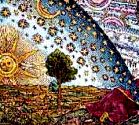
[ "The liturgy of the Jew is the calendar," Abraham Heschel... ]
04.23.21 (Iyyar 11, 5781) Our Torah portion this week (i.e., parashat Kedoshim) reveals that the "appointed times" (i.e., mo'edim: מוֹעֲדִים) were given by God to help us turn away from the omnipresent urge within the human heart to embrace vanity: "Every one of you shall revere his mother and his father and guard (שָׁמַר) my Sabbaths (שַׁבְּתתַי)... Do not turn to worthlessness (i.e., אֱלִיל) or make for yourselves any molten gods" (Lev. 19:3-4). In other words, the Biblical holidays - including the weekly Shabbat, the monthly Rosh Chodesh, and so on - were intended to help us to sanctify ("set apart," "make holy") the times and seasons in order to remind us of God's Presence (Psalm 104:19). Therefore they are called mikra'ei kodesh (מִקְרָאֵי קדֶשׁ), "times in which holiness is proclaimed" (Lev. 23:2).
The Torah's declaration that these days are holy implies that they are set apart for special activities, such as celebrating God as our Creator (Shabbat), our Redeemer (Passover), our Resurrection (Bikkurim/Firstfruits), our Lawgiver (Shavuot/Pentecost), our King (Teruah/Rosh Hashanah), our High Priest (Yom Kippur/Day of Atonement), our Shelter (Sukkot/Tabernacles), and so on. In this connection it should be noted that it is a mistake to assume that the divine calendar was somehow abrogated after the cross of Yeshua, since all of the Jewish holidays center on Him, and indeed the advent of the Ruach Ha-Kodesh (Holy Spirit) occured after his resurrection following the 49-day countdown to the jubilee of Shavuot (see Acts 1:8; 2:1-4).
Hebrew Lesson:
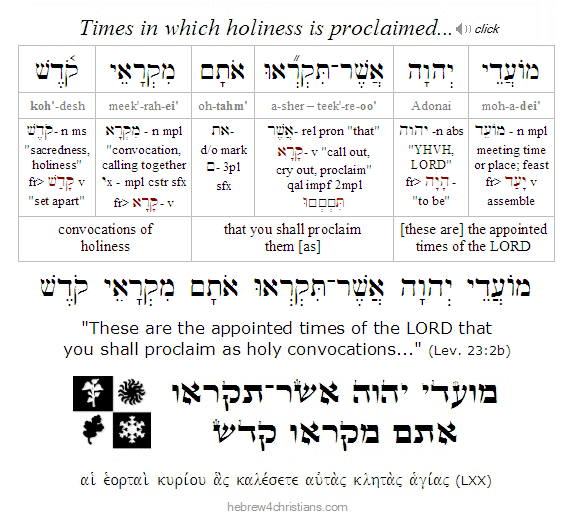 |
One aspect of holiness is a sense of "separateness" from the prevailing culture. Leviticus Rabbah states that God told Moses, "Tell the Israelites that just as I am separate, so you must be separate; just as I am holy, so you must be holy." Likewise the Apostle Paul taught that we to be "conformed" (σύμμορφος) to the Messiah (Rom. 8:29), but not "conformed" (συσχηματίζω) to the pattern of this fallen world (Rom. 12:2). The former word means to resemble or be made similar in form (μορφή), whereas the latter means to accept the world's scheme (σχῆμα) of understanding things, to passively go along with the world's lies, wishful thinking, fearmongering, propaganda, etc. Of course we need God's help to escape the "programming" of our age, and therefore the Holy Spirit helps us to become transfigured – "changed from the inside out" - by the renewal of our minds, enabling us to see things in light of the reality of our identity in the Messiah.
On the other hand, the duty to walk in personal holiness is not to "opt out" of life in this world by living as a monk or by withdrawing from others as an ascetic, much less having a "holier-than-thou" attitude that prides itself on religious scrupulosity... Yeshua routinely condemned those Pharisees who assumed that the meticulous "laws of purity" intended for the priests during their sacrificial service at the Temple applied to them in their daily life (e.g., some of these Pharisees formed "societies" whose members pledged to eat food only while in a state of ritual purity, to ritually wash their hands, and so on). Yeshua called this the "leaven of the Pharisees" which he said was hypocrisy (Luke 12:1). On the contrary, the Scriptures reveal that holiness is to be lived in the everyday experiences of life, in the context of community. Without humility and love, the practice of holiness is meaningless...
 |
Ultimately our lives "suspended" between two worlds - this phenomenal world with its illusions and the real world of spiritual substance and meaning... We exist in an "already-not-yet" state of expectation and yearning where we must consciously mediate the truth of heaven by bringing it "down to earth." This is a truth war, and by truth I do not mean intellectual knowledge as much as the living truth that marks the lifestyle of a follower of Messiah. We consciously remember Torah truth; we choose to always "set the LORD before us," and we take "every thought captive to the obedience of Messiah..." May God help each of us heed the call to walk in holiness by the power of His love and grace. Amen.
Hebrew Lesson:
Alongside the Fleeting...

04.23.21 (Iyyar 11, 5781) God's people are always "strangers" in this world; they are literally "e-stranged" -- living here, yet not here. We are outsiders and pilgrims, not at home in this world, and our faith therefore is both a type of "protest" against any interpretation of reality that excludes, suppresses, denies, or minimizes the Divine Presence as well as a longing for the place where we truly belong.... If you feel crazy in an insane situation, then you are really quite sane... The world will feel oppressive and strange once you have been awakened from its madness and refuse to be moved by the delusions of the crowd... Life in olam hazeh (this world) is a place of passing that leads to the world to come. Our faith affirms that underlying the surface appearance of life is a deeper reality that is ultimately real and abiding. It "sees what is invisible" (2 Cor. 4:18) and understands (i.e., accepts) that the "present form of this world is passing away" (1 Cor. 7:31).
Hebrew Lesson:
Personal Note: I have been sick the last week or so, and experiencing eye trouble. We have been praying for healing but at present I am just enduring. Thank you for your prayers.
Extraordinary Encounters...

[ The following is related to our Torah reading this week, parashat Acharei Mot-Kedoshim... ]
04.22.21 (Iyyar 10, 5781) We "sanctify" our hearts whenever we consciously focus on what is sacred, awesome, wonderful, and glorious about Reality, and in particular, on the Living God, oseh shamayim va'aretz (עשֵׂה שָׁמַיִם וָאָרֶץ), the Maker of Heaven and Earth, and the great salvation we have in Yeshua. In our Torah portion this week (Acharei Mot) we read: "You shall not do as they do (לא תַעֲשׂוּ) in the land of Egypt, where you lived, and you shall not do as they do in the land of Canaan, to which I am bringing you. You shall not walk in their statutes" (Lev. 18:3). In other words, we are not to follow the crowd, to appeal to the status quo, or to mimic the customs of the world we are a visionary people who walk by faith in the Torah of the LORD (Psalm 119:1-3). Being in a vital relationship with God means separating from the ordinary and mundane, leaving our "original homeland" behind us and crossing over to the realm of blessing. Abraham had to leave the land of his father before he could receive the promise; the Israelites had to trek far into the desert before they received the vision at Sinai, and we have to leave our old lives behind to partake of newness of life. There is a radical break from the past -- we are transformed, reborn, and made into new creations by the miracle of God (2 Cor. 5:17). "Being holy" therefore means coming alive and looking away from that which deadens the spirit (Col. 3:1-4). Behold, the LORD God of Israel makes all things new!
The call to be holy is radical and completely contrary to the world and its messages of conditional approval. Worldly culture flatters itself by making a pretense of true originality and genuine love. It imagines itself to be "cool," unconventional, creative, sophisticated, artistic, and so on, but really it is trite, uninspired, and cloyingly tragic. To be truly original means encountering God in your daily experience, struggling through the day in faith, disregarding the clamor and demands of popular culture and its idolatry (i.e., fads, fashions, trends, etc.). God calls his people to come alive, to be new, and to experience abundant life; we are to treasure the unseen, the possible, and to keep faith in the healing good that will overwhelm all darkness. Now that's radical; that's original; that's powerful.
Note the connection between worldliness and idolatry, since idolatry essentially involves trying to find your identity, your worth, your satisfaction, and your ultimate fulfillment in the realm of the transitory and the finite (i.e., the world) rather than in God.... We are (rightly) warned against the vices of "worldliness" and are admonished to abstain from popular culture and its spurious values, but note well that worldliness extends well beyond all this, since it concerns understanding the identity and nature of the person as a whole. The fruit of worldliness is the result of being rooted in this world rather than in God's kingdom. The various desires of the human heart - even the desire for "normal things" like personal happiness in this world - may be regarded as "worldly" if they are devoid of submission to God and His rule. Conversely, even Christian workers may be "worldly" if they base their identity in what they do rather than who they are in the Messiah...
We are "in" but not "of" the world; we are embedded within our culture to be salt and light, and that means we stay true to our vision and relationship with the LORD our God... We don't have to reinvent the wheel, however, since we learn from one another and especially from the testimony of our holy Scriptures, but nevertheless we must personally venture out and encounter God within our own hearts, trusting in his love for our everlasting healing. B'chol dor va'dor: in each generation an individual should look upon himself or herself as having been personally delivered from Egypt. To be efficacious, the message of the Passover Lamb must be personally received by the heart of faith.
Renew the affirmation of faith and know who you are: "If then you have been raised with Messiah, seek the things that are above (τὰ ἄνω ζητεῖτε), where the Messiah is seated at the right hand of God; focus your thoughts on the things above - not on things here on earth - for you have died, and your life has been hidden with Messiah in God. Then when the Messiah, who is your life, appears, you too will appear with him in glory" (Col. 3:1-4).
Hebrew Lesson:
Witness of the Spirit...
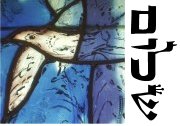
04.22.21 (Iyyar 10, 5781) "Because you are his children, God has sent the Spirit of his Son into your hearts, crying, "Abba! Father!" (Gal. 4:6). Note here the Spirit does not cry out using "esoteric" or magical names for God, nor does the Spirit refer to one of God's many titles based on the divine attributes, but instead uses a term of intimacy and profound trust. After all, the word "abba" (אַבָּא) is not so much a name for God as it is a claim about who you are -- it is a confession that you belong to the Lord as his beloved child... It has been noted that throughout his ministry Yeshua referred to the LORD simply as his "Father" though he used the intensive address "Abba, Father" (Ἀββᾶ, ὁ πατήρ) just before his arrest and crucifixion, that is, during his intercession at Gethsamane (גַּת שְׁמָנִים), near the olive oil press on the Mount of Olives where the anointing oil for the Temple (שֶׁמֶן הַמִּשְׁחָה) was made, and therefore he called upon "Abba, Father" while in deep suffering and tribulation of heart (Mark 14:36). "Take this cup away from me. Yet not what I will, but what you will..." The mixed dialect of Hebrew and Greek here (i.e., Ἀββᾶ, ὁ πατήρ) may indicate identification with both the Jewish people and the Gentiles who would be united in his passion, as it says, shalom shalom la'rachok vela'karov: "Peace, peace, to him who is far off and to him who is near," says the LORD; "and I will heal him" (Isa. 57:19, Eph. 2:15). Knowing God as your "father" is a matter of the heart, an inner cry or groan coming from the miracle of spiritual rebirth. "The Spirit himself bears witness to our spirit that we are God's children" (Rom. 8:16).
Hebrew Lesson:
Torah of Tears...
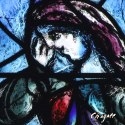
04.22.21 (Iyyar 10, 5781) The Scriptures are filled with desperate cries from the wounded of heart... "How long, O LORD? Will you forget me forever? How long will you hide your face from me? How long must I take counsel in my soul and have sorrow in my heart all the day?" (Psalm 13:1-2). "Make haste to help me, O LORD, my salvation!" (Psalm 38:22). "My soul melts away from grief; strengthen me according to your word" (Psalm 119:28). "Answer me quickly, O LORD! My spirit fails! Hide not your face from me, lest I be like those who go down to the pit" (Psalm 143:7). God know that "hope deferred makes the heart sick" (Prov. 13:12), so there can be no turning to God, no teshuvah, apart from the presence of real hope (תִּקְוָה). Indeed, as the Apostle Paul wrote: "We are saved by hope" (Rom. 8:24).
The apostle Peter wrote, "for a little while, if necessary, you have been grieved by various trials" (1 Pet. 1:6), which indicates that sorrow and grief are part of the walk of faith. Troubles, oppression, heartache, loneliness, loss, and so on, can grieve and seriously depress us. Lev yodea marat nafsho, "the heart knows its own bitterness" (Prov. 14:10). The cry of the heart is directed heavenward: "I am suffering terribly; O LORD, revive me according to your word" (Psalm 119:25); "for I am on the verge of collapse; my pain is always with me" (Psalm 38:17). We must be careful not to judge those who are hurting by regarding them as weak in faith or perhaps even deserving of their sorrows. On the contrary, the Lord sometimes allows the soul to be grieved by various trials; the heart is broken, the light of the eye grows dim... and there is no ready answer....
Your Heavenly Father sees in secret -- yea, even the secret sorrow and dread of your heart. You may languish and shed tears, but the pain drives you to lonely places of despair and darkness. Our Lord is present for those who are hurting; he heals the shattered of heart and binds up their wounds (Psalm 147:3). Tehom-el-tehom: "deep calleth unto deep." There are depths where we must be alone, but it there where our sorrows find voice to lament and cry out for God's comfort in the midst of our sorrows. "For in Thee, O LORD, do I hope; thou wilt hear, O Lord my God" (Psalm 38:15). Kiviti Adonai, kiviti nafshi: "I wait for the LORD, my soul doth wait, and in his word do I hope; my soul waiteth for the Lord more than they that watch for the morning: I say, more than they that watch for the morning" (Psalm 130:5-6).
We sometimes sigh: "O Lord, I know that Thou wilt help us; but wilt Thou help us before Thou wilt help us?" It's not always easy to wait for God, especially when we are in pain or anxiety, but we must never give up; we must never abandon our heart's longing for ultimate healing. Faith exercises hope in the reality of God's love and is captive to undying hope (Heb. 11:1). Therefore the Spirit cries out: "Hope to the LORD; be strong and strengthen your heart; and (again) hope to the LORD" (Psalm 27:14). "Blessed are you, LORD our God, King of the Universe, who walks with the wounded of heart".
 |
Hebrew Lesson:
Psalm 119:28 Hebrew Reading (click):
The Heart of Atonement...

04.21.21 (Iyyar 9, 5781) Many of our deepest anxieties come from the fear of death, whether we are conscious of this or not... Death represents fear of the unknown, fear of being abandoned, fear of being rejected, fear of being separated from others, and so on. I am so glad Yeshua gives us eternal life, which for me is not so much about immortality of the soul as it is being loved and accepted by God... That is what "at-one-ment" means, after all (John 17:22-23). Because God loves and accepts us, we trust Him to be present for us, even in the darkest of hours, on the other side of the veil, where he there "prepares a place for us" (John 14:2). As Yeshua said, "I tell you the solemn truth, the one who hears my message and believes the One who sent me has eternal life (חַיֵּי עוֹלָם) and will not be condemned, but has passed (i.e., μετά + βαίνω, lit., "crossed over" [עָבַר]) from death to life" (John 5:24). God's love "crosses over" from death to life and now forever sustains me.
Our Torah reading this week (Acharei Mot) provides details about Yom Kippur, or the "Day of Atonement," a special service that gave ritual expression of God's love by making purification for our sins. As I've explained before, the word for love (i.e., ahavah: אהבה) equals the number thirteen (1+5+2+5=13), but when shared it is multiplied: 13 x 2 = 26, which is the same value for the Sacred Name (יהוה), i.e., (10+5+6+5=26). Likewise the Hebrew word for "life" is chayim (חַיִּים), is written in the plural to emphasize that life cannot be lived alone but must be shared. Notice that within the word chayim are embedded two consecutive Yods (יי), representing unity in plurality (Yod-Yod is an abbreviation for YHVH, also indicating the "deep Akedah" of Father and Son). God gave up His life so that we can be in relationship with Him, that is, so that we can be "at-one" with His heart for us. Whatever else it may mean, then, the Hebrew word for "atonement" (i.e., kapparah, "covering," "protection," "purification," "cleansing," "forgiveness," and so on) is about accepting God's heart for you - being unified in his love - and if you miss that, you've missed the point of the Torah's teaching.. Thank God we are "sealed" in the book of life by the love of Yeshua!
Hebrew Lesson:
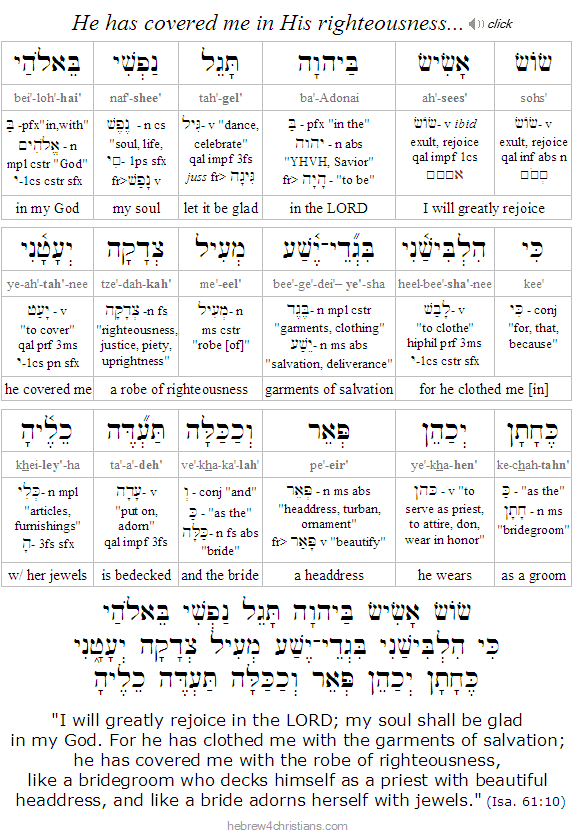 |
Truth of the Inward Being...
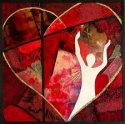
04.21.21 (Iyyar 9, 5781) It is written in our Scriptures: "As a man thinks in his heart, so is he." We often see what we want to see more than what is really there. That's called wishful thinking. We overlook much, and we often ignore what might challenge our own preferred interpretations. For example, we may think that we are trusting God for our lives, but we worry, we attempt to control others, we get angry, and so on. We have a blind spot regarding the question whether we really trust God, perhaps because seriously investigating what we really believe seems too threatening (John 16:31-32). After all, what if we don't really know what to believe? What if we struggle to believe? What if we are confused? What does that say about who we are? So we ignore the real problem (namely, our lack of truth and our little faith in God) and continue to think we are something we are not. We fool ourselves and trade a sense of "satisfaction" at the expense of truth. This is a common failing of human nature. During the Nazi years, many ordinary Germans refused to investigate reports of atrocities at the death camps because it was too costly to discover the truth (the same might be said about any patriotic citizens who rationalize the actions of their government regardless of the moral issues involved). By willfully hiding from the facts, we pretend we are not responsible, and therefore we justify passivity in the face of injustice and evil.
Yeshua warned that the time would come when those who kill others will delude themselves into thinking they are doing God a big favor (John 16:2). Think of how massively self-deceived such a thing is as that -- to murder someone as a so-called service to God! Many of the biggest enemies of the truth are often those who think they are doing God such favors.
Hebrew Lesson:
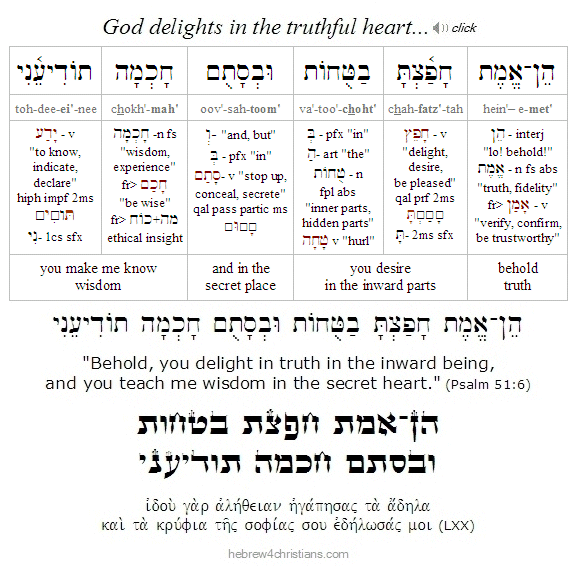 |
Often, however, the truth "of the inward being" must come at the expense of heartache, for surely the heart must ache, tremble, and despair before it comes to accept the truth about its condition. This sort of truth is "existential," meaning that it is known only through the process of living life itself. As Kierkegaard said, "There are many people who reach their conclusions about life like schoolboys: they cheat their master by copying the answer out of a book without having worked the sum out for themselves." Yes, and they cheat themselves, too, since they somehow believe that "knowing the answer" given by another is the same thing as "knowing the answer" of their own inward being... Kierkegaard continues this thought: "The truth is lived before it is understood. It must be fought for, tested, and appropriated. Truth is the way... you must be tried, do battle, and suffer if you are to acquire truth for yourself. It is a sheer illusion to think that in relation to truth there is an abridgment, a short cut that dispenses with the necessity of struggling for it."
A man who was afflicted with a terrible disease complained to Rabbi Israel that his suffering interfered with his learning and praying. The rabbi put his hand on his shoulder and said, "How do you know, friend, what is more pleasing to God - your studying or your suffering?" (Buber: Hasidim).
Note that the "inward being" (טֻחוֹת) refers to the "kidneys" which were thought to be "the reins" or the concealed (i.e., te'ach: טִיחַ) source of the will within the person. Interestingly, the word te'ach comes from the verb tachah (טָחָה) that means to "shoot with a bow," alluding to the idea of inner Torah as a directive power. God wants purity of the heart – passion, singleheartedness, and earnestness – as we live and practice the truth. God wants "the inner parts," the concealed parts of the soul, to be filled with his Torah, and therefore David asks God to make him to know wisdom there - in the "secret heart" - so that he might apprehend God's truth and do teshuvah that purifies the heart.
Hebrew Lesson:
Atonement and the New Covenant...

[ The following is related to our Torah reading for this week, parashat Acharei Mot... ]
04.20.21 (Iyyar 8, 5781) How are we to understand the apparent contradiction that Yom Kippur is to be observed as a "statute forever" (Lev. 16:29) while the New Testament emphatically states that Yeshua puts an end to animal sacrifice and now is our eternal atonement (Heb. 9:12; 24-26)? To begin we must note that this contradiction only arises when we make the (false) assumption that the Sinai covenant could never be abrogated, which would imply that a new covenant is logically impossible. If we can only relate to God through the covenantal terms given at Sinai, in other words, then the Levitical priesthood (alone) serves to mediate us before God, and there would be no need for a covenant based on the better priesthood and promises of the Messiah (Heb. 8:6). Nevertheless, the new covenant was clearly foretold throughout the Torah, the writings, and the prophets, and the assumption that the Sinai covenant is "immutable" is therefore false. We can understand this by an analogy: If an employer makes a contract with an employee with certain provisions and conditional benefits that are subject to annual review, but later rescinds that contact and offers a new one with far better benefits, there is no contradiction involved. In our case a real contradiction would be, "you must observe Yom Kippur forever," and then - in the very same contract - later read, "you no longer need observe Yom Kippur forever."
Since the Torah says of the Yom Kippur ritual, "this shall be a statute forever (חֻקַּת עוֹלָם) for you, that atonement may be made for the people of Israel once in the year because of all their sins" (Lev. 16:34), it is urgent for us to explore what "forever" might mean in this case, especially in light of the atonement given in Yeshua. First, we note that the Hebrew word translated "forever" is olam (עוֹלָם), which is derived from a root verb alam (עָלַם) that means "to conceal" or "to hide." Olam may have its origins using spatial imagery, a distance so vast that it is unseen, beyond the horizon, and therefore it can also mean "world." When it is applied to the terms of the Sinai covenant (and the Tabernacle represents the "ritual expression" of that covenant), the word means perpetual, ongoing, etc., in the horizon of domain or "world." It is interesting to note that the Jewish sages never regarded "olam" as unchangeable, since in the world to come Torah will come from Zion (Isa. 2:3). For more on this important point, see the article "Olam HaTorah: The World of the Torah."
Second, we must remember that Torah (תּוֹרָה) is a "function word" that expresses our responsibility in light of the covenantal acts of God, and if you choose to relate to God by means of the Sinai covenant, you are liable to the terms and provisions of that contract (e.g., niddah laws, blood ritual laws, tithing laws, agricultural laws, etc.), and this includes being liable to the enumerated curses for disobedience (tochachah). The covenant at Sinai is indeed eternal and never can change - it is brit olam, a perpetual covenant - but if you choose to abide by its terms, you are responsible for your side of the contract... The Book of Hebrews states: "When there is a change in the priesthood (הַכְּהוּנָּה), there is necessarily (ἀνάγκη) a change in the Torah as well" (Heb. 7:12). The Levitical priesthood expresses the Torah of the Covenant of Sinai (בְּרִית יְשָׁנָה), just as the greater priesthood of Yeshua expresses the Torah of the New Covenant (בְּרִית חֲדָשָׁה).
Third, Yeshua our Messiah came to deliver us from sin and to establish the new covenant with God, which both transcends the covenant given at Sinai and provides an entirely new way to be in relationship with God by the power of the Holy Spirit. The new covenant sets us free from the terms of Sinai (by the death of the Testator, Heb. 9:15) so that we might serve God in a new and better way (see Jer. 31:33; Rom. 7:1-6; Heb. 8:6; Rom. 9:31-32; Acts 13:39; Gal. 4:21-5:1). We "die" to the terms of the former contract to serve God in a new and powerful way (Rom. 7:1-4), with the inner intent of the law written upon our hearts (Jer. 31:31-33). This is the "deeper Torah" that goes back to the original covenant made in the Garden of Eden (for more on this, see "The Gospel in the Garden").
Fourth, Yeshua is the King, the Lawgiver of Torah, and its Substance: he did not come to destroy the Law and the Prophets, but to fulfill their message and meaning (Matt. 5:17-18; Rom. 10:4). As the King, he has the authority to annul contracts with his subjects, and he has the authority to implement new agreements based on his sovereign will... The Torah of Moses commanded, "Thou shalt not kill..." but the King of Torah (מלך התורה) went to the heart of the matter, explaining that murder was a symptom of the deeper sin of anger...
Finally, those who follow the law of Moses simply cannot keep the Day of Atonement as clearly commanded in the Book of Leviticus, nor have Jews been able to do so since 70 AD, after the destruction of the Second Temple as foretold by Yeshua (Matt. 24:2; Luke 19:41-4). Note that this was by divine design, since the way into the Holy of Holies (i.e., kodesh hakodashim: קדֶשׁ הַקֳּדָשִׁים) was not yet open for all as long as the "outer tent" still stood (i.e., the Levitical priesthood as the ritualistic expression of the covenant made at Sinai), since that was symbolic of "the present age," or the "dispensation that was passing away" (Heb. 8:13, 9:8-9; for more, see "The Parochet Rent in Two"). Despite the later invention of "Judaism without the Temple," the life is indeed "in the blood" (Lev. 17:11) and in Messiah we are given fullness of life! Only Yeshua gives us true atonement, and that's the true Torah of the LORD! The redemption obtained by animal sacrifices was merely provisional and symbolic, "for it is impossible for the blood of bulls and goats to take away sins" (Heb. 10:4). For eternal remedy something far greater was needed, namely, the sacrifice of God Himself. Consequently, when Yeshua came into the world, he said, "Sacrifices and offerings you have not desired, but a body have you prepared for me," and "'Behold, I have come to do your will, O God, as it is written of me in the scroll of the book" (Heb. 10:5,7). As the Book of Hebrew states: "We have an altar, whereof they have no right to eat who serve the Tabernacle" (i.e., the Levitical system of worship). We are cleansed from our sins and made eternally right with God because of the cross of Yeshua...
The bottom line is this. We have a greater High Priest who intercedes for us by means of his own shed blood within the true Holy of Holies, "made without hands," in the olam of reality. We do not mix the covenants of God, for this leads to double-mindedness and is regarded as spiritual adultery (Rom. 7:1-4). Remember: The promised "new covenant" (ברית חדשׁה) is "not like the covenant that I made with their fathers on the day when I took them by the hand to bring them out of the land of Egypt (Jer. 31:32), that is, it is not like the covenant made at Sinai with Moses' mediation. It is chillul HaShem - the desecration of the Name above all Names - to turn away from the meaning and message of the cross of Messiah.
 |
Yom Kippur:
Climax of the Torah...
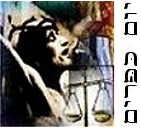
[ The following is related to our Torah reading for this week, parashat Acharei Mot... ]
04.20.21 (Iyyar 8, 5781) The holidays of Torah find their origin in the events of the Exodus, which were later commemorated as rituals at the Tabernacle. On the first of Nisan, two weeks before the Exodus, the LORD showed Moses the new moon and commenced the divine lunar calendar. This is called Rosh Chodashim. Two weeks later, God was ready to deliver the Israelites from their bondage in Egypt. Earlier that evening the Israelites kept the Passover Seder and sprinkled the blood of the lamb on their doorposts. At the stroke of midnight of Nisan 15 the LORD sent the last of the ten plagues on the Egyptians, killing all their firstborn. On the 6th of Sivan, exactly seven weeks after the Exodus (49 days), Moses first ascended Sinai to receive the Torah (Shavuot). Just forty days later, on the 17th of Tammuz, the tablets were broken. Moses then interceded for Israel for another forty days until he was called back up to Sinai on Elul 1 and received the revelation of Name YHVH (Exod. 34:4-8). After this, he was given the Second Tablets and returned to the camp on Tishri 10, which later was called Yom Kippur. Moses' face was shining with radiance in wonder of the coming New Covenant which was prefigured in the rituals of the Day of Atonement (Exod. 34:10).
 |
Recall that there were two revelations of the Name YHVH, first as "I AM WHO I AM" (a play on the Hebrew verb hayah [הָיָה] given to Moses in Exodus 3:14-15 which was later "incarnated" during the intervention of the Exodus (Exod. 6:1-8)), and the later revelation of YHVH's mercy disclosed after the sin of the Golden Calf (Exod. 34:6-7). It is the later revelation that foretold God's Name of the new covenant, just as the second tablets took the place of the former tablets that were shattered. Ultimately Yeshua is the "wonder" of the covenant of the LORD (Exod. 34:10), the manifestation of the attributes of God's mercy (middot rachamim).
Hebrew Lesson:
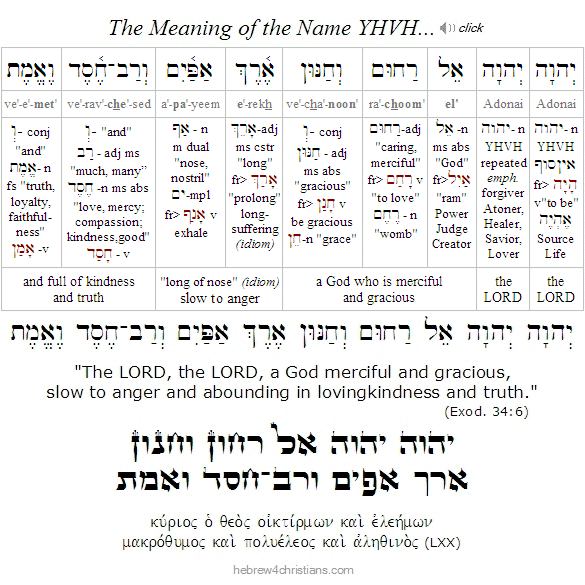 |
It is wonderful to see how this revelation prefigures the New Covenant that was given to Israel. Just as the first set of tablets, based as they were on the justice and holiness of God, were broken, so a second set was given based on the middot (attributes) of the LORD's mercy and grace. Indeed, Yeshua was broken on behalf of the law but was raised again so that all who trust in Him can truly understand that God is "merciful and gracious, slow to anger and abounding in steadfast love and truth" (Exod. 34:6, Psalm 86:15, 103:8).
For more information about topic this see: "The Eight Aliyot of Moses."
Forsake me not, O LORD...
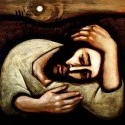
04.19.21 (Iyyar 7, 5781) Though it is true that God will never leave nor forsake us, he nevertheless allows trouble in our lives so that we will learn to call upon him and know his heart... For how else will we understand the truth of our great need for him, and how else his great provision? "Blessed are the poor in spirit," describes the poignant awareness of our inner poverty, our bankruptcy of heart, the destitution of our condition (Matt. 5:3). We cry inwardly, "Forsake me not, O LORD: O my God, be not far from me" (Psalm 38:21) because we realize our need for deliverance from ourselves; we understand that we cannot take a step in his way apart from his upholding. "Hold thou me up, and I shall be safe: and I will have respect unto thy statutes continually" (Psalm 119:117). "Do not forsake me, O LORD, is the mantra in our darkness, the antiphon of God's promised Presence; it is the cry of the heart that knows that only God can get us through the next moment and its temptation to despair. "Do not forsake me, O LORD, lest I be swallowed up by my pain, my fear, my sadness, my anguish of heart; do not forsake me, for I am nothing but the anguish of the moment, the sorrow of loneliness, the fear of my own heart as I tremble before you in my desperation...
O LORD, You came to heal the sick; you spoke life to those who are without strength or remedy; you came to seek the lost, to find those who are without a place or sense of belonging in this world. O Lord, you know that without you I can do nothing; you know that I weak, poor, and needy; my path is perilous and I have no hope apart from you. Be not far from me; do not leave me to my own devices nor the counsel of my own soul. Save me, O God, for the glory of your Name; be magnified in your heart of love and faithfulness. Amen.
Hebrew Lesson:
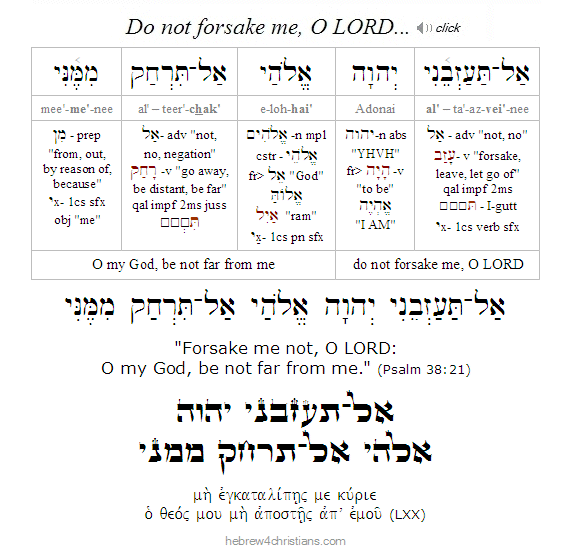 |
Our Common Struggle...

04.19.21 (Iyyar 7, 5781) We all struggle with sin in our lives, and each of us needs deliverance from various attachments and fears that keep us from the deeper life... The problem is within ourselves, that is, the contradiction of heart we experience in our double-mindedness, our ambivalence, and our unbelief (Jer. 17:9). We may recite the Shema every day and say that we love God with all our being, but in the ordinary moments of daily life we are drawn to other concerns, alien affections, other "gods." Indeed, whatever matters most to us, whatever consumes our attention, time, resources, and our interest, is something we "worship," that is, something we esteem as worthy and valuable...
People necessarily value things, and therefore every person alive is a "worshiper" (i.e., a person who finds "worth" in something). This applies equally to a devout atheist or pious skeptic as much as it does a deeply religious person... The question that matters, however, is what is your ultimate concern? What do you really want? Only when we begin to understand what draws and attracts us can we begin to discern what we really need. Therefore we must first acknowledge our false worship, our radical selfishness, and our sundry attachments in order to be set free. We must confess the truth that we are slaves.
Pride blinds us to the truth of our sickness of heart, persuading us to deny our problems, to cover them up, and to try harder and harder to "control" ourselves. This is a spiritual dead-end, a vicious circle, the "law of sin and death." We are set free, however, when we die to ourselves, that is, when we surrender to the love of God and receive the miracle of promised deliverance. Since we are powerless to change ourselves, to reform our lower nature, and to be healed by our own best efforts, we must abandon our "religion" and rely entirely upon the God for the power to heal. This is an ongoing venture: We die daily; we take up the cross daily, we walk with a limp from our inner struggle, and we cling to God alone show us the way and to guide our steps. Beloved, we have been crucified with Messiah and the old nature has lost its power over us; we are alive by the miracle of God's power. "If we live by the Spirit, let us also walk in the Spirit" (Gal. 5:25).
Hebrew Lesson:
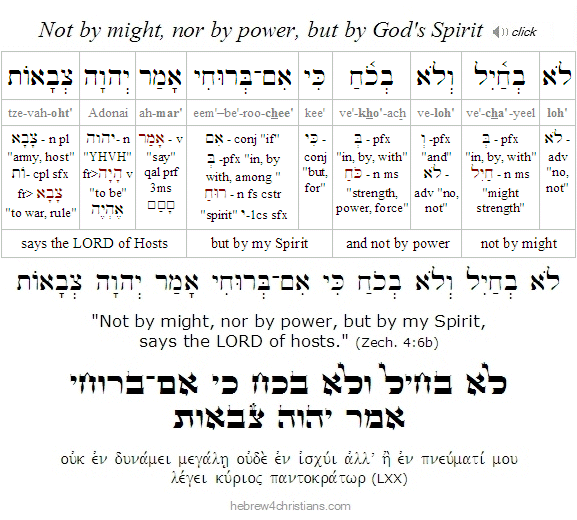 |
04.18.21 (Iyyar 6, 5781) Shavuah tov, chaverim. This week we have a "double portion" of Torah. Our first Torah portion is called Acharei Mot (אחרי מות). This portion transitions from the preceding readings regarding ritual purity (i.e., tahora) to recall the tragic incident of Nadab and Abihu, the two sons of Aaron who were killed when they offered "strange fire" upon the Altar of Incense during the dedication of the Tabernacle (see Lev. 10:1-2). Because these priests came close to the Holy of Holies in an incorrect manner, the LORD further commanded Moses to instruct Aaron that he should enter the innermost chamber only in a carefully prescribed manner once a year - on the tenth day of the seventh month - during the sacred time called Yom Kippur (i.e., the "Day of Atonement"). The portion then describes the elaborate Yom Kippur ritual to purify the people as well as various dietary laws.
Hebrew Lesson:
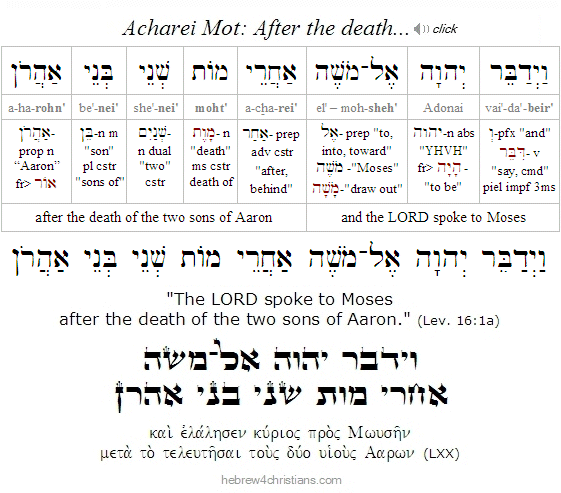 |
Our second Torah portion, called Kedoshim (קדשׁים), provides a series of social and ethical commandments concerning the practical expression of holiness in daily life: "Speak to all the congregation of the people of Israel and say to them, You shall be holy (קדשׁים תהיו), for I the LORD your God am holy" (Lev. 19:2). Indeed this portion lists more mitzvot (commandments) regarding practical ethics (musar) than any other of the Torah, thereby directly connecting the holiness of the community with obedience to God's moral truth.
Hebrew Lesson:
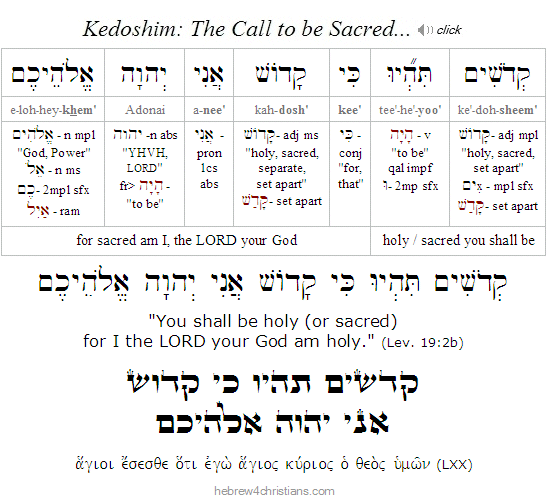 |
After stating the fundamental call to be holy, the LORD begins to explain, "Each of you must respect (i.e., yirah: יִרְאָה) his mother and his father, and you must keep my Sabbaths. I am the LORD your God" (Lev. 19:3). The duty to revere (or honor) one's parents recalls the Fifth Commandment (Exod. 20:12), which is the starting point of learning to respect other people in our lives. Notice that the word for "my Sabbaths" (שַׁבְּתתַי) implies both the keeping of the weekly Sabbath as well as the "appointed times" of the LORD. As we will see, sanctifying time is a way we can express practical holiness in our lives...
Various practical commandments are given in this Torah portion through which a Jew is sanctified, or set apart to be kadosh - holy - and therefore fit for relationship with God. God is not only "wholly Other" (i.e., transcendent) but also pervades all of creation (i.e., "immanent"), and those who are called into His Presence must therefore be holy themselves. Such practical holiness results in sanctification obtained through the observance of commandments (mitzvot). These commandments include both mitzvot aseh (commandments to do something) and mitzvot lo ta'aseh (commandments to refrain from doing something). In addition, chukkim, or "statutes" are given that further separate the Jew from the customs and profanity of the surrounding nations.
Acharei Mot - Kedoshim Resources:
The Will to Believe...

04.16.21 (Iyyar 4, 5781) The central issue of your spiritual life is the willingness to do God's will, or the willingness to believe, since these amount to the same thing.... Believe what? That God is real, that He has (personally) called you by name, that he has particularly redeemed you by Yeshua's own blood poured out for your sins, and that therefore that your identity and life are bound up with his mercy and truth... Perhaps this message seems too good to be true, and yet it is the heart's duty to take hold of hope and to refuse to yield to despair, as it is written: "Let not love and truth forsake you; bind them around your neck; write them on the tablet of your heart" (Prov. 3:3).
The spiritual danger here is being "pulled apart" in opposite directions, dissipating the soul so that it will not be unified, focused and directed. Both loving and hating the good is a state of painful inner conflict, ambivalence, and self-contradiction. "Who can bring a clean thing out of an unclean? there is not one" (Job 14:4), yet this is our starting point: "I find it to be a law that when I want to do right, evil lies close at hand" (Rom. 7:21). We are often willing and unwilling, or neither willing nor unwilling, and this makes us inwardly divided, weak, fragmented, anxious, and "soulless." An honest faith that "wills one thing" binds the soul into a unity, or an authentic "self." As King David said, "One thing have I asked of the LORD, that will I seek after: that I may dwell in the house of the LORD all the days of my life, to gaze upon the beauty of the LORD and to inquire in his temple" (Psalm 27:4).
The way to be healed of a divided heart is to earnestly make a decision: "Draw near to God, and he will draw near to you" (James 4:8). There are no conditions given here -- other than your raw need to connect with God for help. "Purify your hearts, you double-minded ones" (δίψυχοι, lit. "two-souled ones"); make up your mind and be unified within your heart: "How long will you go limping between two different opinions?" (1 Kings 18:21). You are invited to come; God has made the way; your place at the table has been set and prepared...
Our Heavenly Father "sees in secret.." As William James once said: "The deepest thing in our nature is this region of heart in which we dwell alone with our willingnesses and our unwillingnesses, our faiths and our fears" (James: Is Life Worth Living, 1896). Or as Albert Camus later wrote, "There is but one truly serious philosophical problem, and that is suicide. Judging whether life is or is not worth living amounts to answering the fundamental question of philosophy" (Myth of Sisyphus, 1942). It is there, in the secret place of the heart, that the sound of the "knock" is either heard or disregarded (Rev 3:20); the stakes are nothing less than everything. May the Lord give us the willingness to do His will and the courage to believe in His love. And may God deliver us from doubt and from every other fear. May we all be strong in faith, not staggering over the promises, but giving glory to God for the miracle of Yeshua our LORD. May we all be rooted and grounded in love so that we are empowered to apprehend the very "breadth and length and height and depth" of the love of God given to us in Messiah, so that we shall all be filled with all the fullness of God (Eph. 3:14-19). Amen.
Hebrew Lesson:
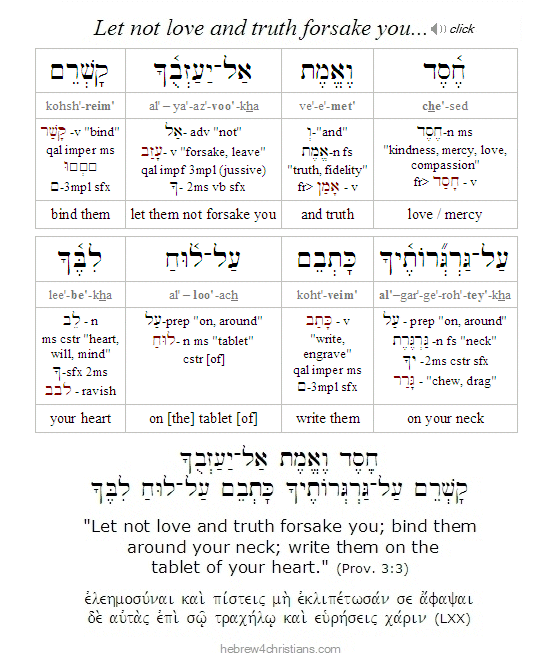 |
Finding Your Focal Point...

04.16.21 (Iyyar 4, 5781) Our faith is expressed every day by what we regard as most important. What do you treasure in life? What is your "pearl of great price"? Some people will say that loving God is their greatest blessing, though their choices indicate that they are focused on various temporal and worldly concerns. The life of faith requires the whole heart and singleness of vision, as King David said, "One thing I ask of the Lord; that is what I will seek." David asked for one thing – not many things. He did not come with a litany of requests. He was not double minded. As Kierkegaard said, "purity of the heart is to will one thing." Despite his troubles and pains, David sought the best he could find.
The most important thing in life is to decide what is the most important thing in life - and then to act accordingly. Time is short for all of us, and it is more vital than ever to find healing for our woundedness. We have to quit pretending to be what we aren't and learn to be honest and vulnerable. Spirituality without honesty and humility is a sham. If you don't know how to begin, then begin there - by knowing your confusion and your need for the miracle of God to teach you... For instance, if you don't know how to really love, then confess your heart's loss and pray for the miracle you need. As it is written, "God has compassion for the lowly and broken, and saves the souls of the powerless."
Hebrew Lesson:
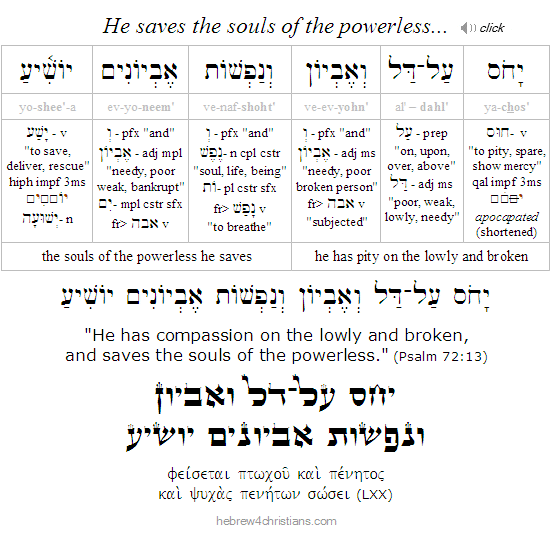 |
When God said, "Let there be light, and there was light" (Gen. 1:3), He seemed to put on light as a robe of the Divine Majesty and Kingship: He wrapped Himself with radiance as a tallit gadol... Da lifnei mi attah omed (דַּע לִפְנֵי מִי אַתָּה עוֹמֵד) – "Know before whom you stand." The whole earth is lit up with God's glory, and every bush of the field is aflame before us -- if we have eyes to see (Isa. 6:3). May it please the LORD to open our spiritual eyes so that we can behold more of His glory and majesty in this hour... Amen.
Priests and Lepers...
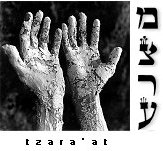
04.16.21 (Iyyar 4, 5781) In our Torah portion for this week (Tazria) we read: "When a person (i.e., adam: אָדָם) has on the skin of his body a swelling (שְׂאֵת) or a scab (סַפַּחַת) or a bright spot (בְּהֶרֶת)... he shall be brought to the priest" (Lev. 13:2). Here the sages note three common afflictions that befall the "children of Adam," namely, 1) swelling (i.e., שְׂאֵת), representing arrogance; 2) scabs (סַפַּחַת), representing worldly vanity (from a root (סָפַח) that means to "join together"); and 3) bright spots such as moles or macula (i.e., בַּהֶרֶת), from a root (בָּהָר) meaning to enlighten, representing the light of carnal reasoning to understand the ways of God. When we see only the affliction, we must go to the priest – to one who helps mediate the Divine Presence – to see how deep the affliction is and what its root might be... Symbolically, since we are all priests to one another (see Exod. 19:6; 1 Pet. 2:5,9; Rev. 1:6), we share our afflictions with one another, allowing ourselves to be seen, and to confess our need for healing. "Therefore, disclose (ἐξομολογέω, lit. 'confess out') your sins to one another and pray (εὔχομαι) for one another, that you may be healed..." (James 5:16).
Followers of Yeshua are intended by God to be healers (Luke 9:1). The most common word for healing in the New Testament is therapeuo (θεραπεύω), a word that means to serve, to care for, and to restore to health. Unlike some ministers who draw crowds to demonstrate the power of miraculous "faith healing," true spiritual healers take the time to listen to others, to hear their inward pain, and to extend compassion and grace to them. They help open the inner eyes of the heart by extending hope and a new vision about what is real... Indeed, lasting healing focuses less on being cured than on finding hope that will never die.
Hebrew Lesson:
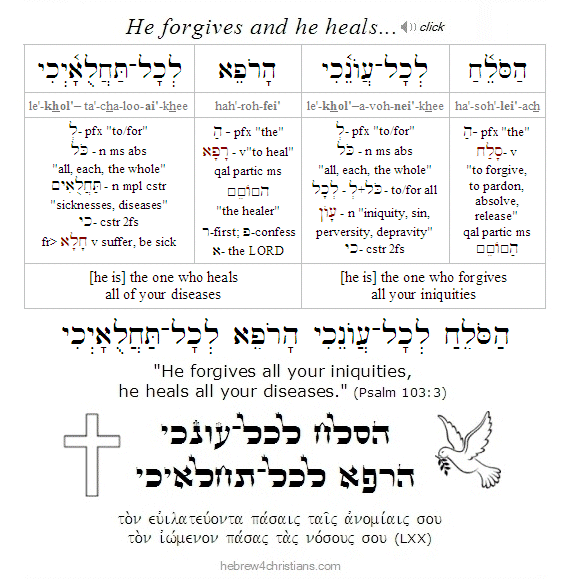 |
Words and Healing...
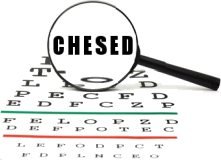
[ The following is related to our Torah reading this week, parashat Tazria-Metzora.... ]
04.15.21 (Iyyar 3, 5781) Just as a body can become sick with illness, so can a soul: "I said, 'O LORD, have mercy on me; heal my soul (רְפָאָה נַפְשִׁי), for I have sinned against you'" (Psalm 41:4). Likewise we understand that fear profoundly affects the way the brain processes images and messages. Fear colors the way we see and hear things. And since the mind and body are intricately interconnected, fear is often the root cause of many physiological problems such as heart disease, high blood pressure, clinical depression, and other ailments. Left unchecked, fear can be deadly. Note the connection between fear, lashon hara (evil thoughts/words), and sickness (tzara'at), which are themes of this week's Torah portion...
The targum Onkelos states that God breathed into Adam the ability to think and to speak. In other words, thought and speech are two primary characteristics of the image (tzelem) and likeness (demut) of God. Since our use of words is directly linked to the "breath of God" within us, lashon hara (לָשׁוֹן הָרָה) defaces God's image within us.... Using words to inflict pain therefore perverts the image of God, since God created man to use language to "build up" others in love. This is part of the reason the metzora (i.e., one afflicted with tzara'at) was regarded as "dead" and in need of rebirth.
Lashon hara is really a symptom of the "evil eye" (ayin hara). "Evil comes to one who searches (דָּרַשׁ) for it" (Prov. 11:27). We must train ourselves to use the "good eye" (ayin tovah) and extend kaf zechut - the "hand of merit" to others. Genuine faith is optimistic and involves hakarat tovah, that is, recognizing the good in others and in life's circumstances. Gam zu l'tovah: "This too is for the good" (Rom. 8:28). The Midrash states that God afflicted houses with tzara'at so that treasure hidden within the walls would be discovered. The good eye finds "hidden treasure" in every person and experience.
King David said (Psalm 35:13): "May what I prayed for happen to me!" (literally, tefillati al-cheki tashuv - "may it return upon my own breast"). Some of our prayers are conscious words spoken to God, whereas others are unconscious expressions of our inner heart attitudes. When we harbor indifference, ill will, or unforgiveness toward others, we are only hurting ourselves. It is very sobering to realize that our thoughts are essentially prayers being offered up to God... When we seek the good of others we find God's favor, healing and life. Yeshua spoke of "good and evil treasures of the heart" that produce actions that are expressed in our words (Luke 6:45). A midrash states that if someone speaks well of another, the angels above will then speak well of him before the Holy One.
In light of the enigma of "spiritual impurity" (i.e., tumah) and its ultimate expression revealed in the corruption of death, it is all the more telling that we should heed the cry of the Spirit: "Choose Life!" (Deut. 30:19). Sin is a type of "spiritual suicide" that seduces us to exchange eternal good for the petty and trivial. The nachash (serpent) in the garden of Eden was the first to speak lashon hara. He slandered God and lied to Eve about how to discern between good and evil. He is a murderer and the father of lies. Resist his wiles with the truth of God.
May it please the LORD to help each of us be entirely mindful of the power and sanctity of our words... May it please Him to help us use our words for the purpose of strengthening and upbuilding (οἰκοδομὴν) one another (Eph. 4:29). May God help us take every thought "captive" to the obedience of the Messiah, thereby enabling us to always behold and express the truth of God's unfailing love.
Hebrew Lesson:
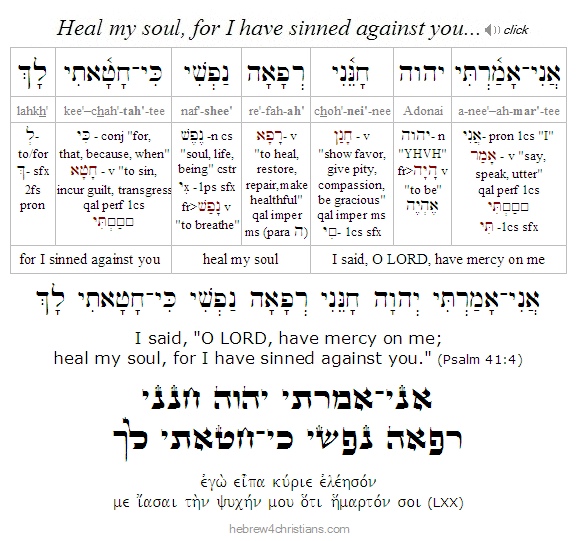 |
Spelling out "Repentance"

04.15.21 (Iyyar 3, 5781) Rabbi Sussya of Anipol once said: "There are five verses in the bible that constitute the essence of the Torah. These verses begin in Hebrew with one of these letters: Tav (תּ), Shin (שׁ), Vav (ו), Bet (בּ), and Hey (ה), which together form the word for repentance, or "teshuvah" (תְּשׁובָה).
The five verses are: 1) Tamim tiheyeh (תָּמִים תִּהְיֶה): "Be wholehearted before God" (Deut. 18:13); 2) Shiviti Adonai (שִׁוִּיתִי יְהוָה): "I have set the LORD always before me" (Psalm 16:8); 3) Va'ahavta lere'akha (וְאָהַבְתָּ לְרֵעֲךָ): "Love your neighbor as yourself" (Lev. 19:18); 4) Bekhol derakekha (בְּכָל־דְּרָכֶיךָ): "In all your ways know Him" (Prov. 3:6); and 5) Higid lekha (הִגִּיד לְךָ): "Walk humbly with your God" (Micah 6:8).
הִגִּיד לְךָ אָדָם מַה־טּוֹב
וּמָה־יְהוָה דּוֹרֵשׁ מִמְּךָ
כִּי אִם־עֲשׂוֹת מִשְׁפָּט וְאַהֲבַת חֶסֶד
וְהַצְנֵעַ לֶכֶת עִם־אֱלהֶיךָ
hee·geed · le·kha · a·dam · mah-tov
oo'mah · Adonai · do·resh · mee·me·kha
kee · eem-a·soht · meesh·paht · ve·a·ha·vaht · che'·sed
ve·hatz·ne'·a · le'·chet · eem-e·lo·hey'·kha

"He has told you, O man, what is good,
and what the LORD requires of you:
Only to do justice, and to love mercy,
and to walk humbly with your God." (Micah 6:8)

Hebrew Study Card
In other words, the word teshuvah may be seen as an acronym that stands for being wholehearted, honoring God, loving others, acknowledging God in all your ways, and walking in humility. May the LORD our God impart the miracle of teshuvah to each of us today.
The Friend of Sinners...

04.15.21 (Iyyar 3, 5781) "The Son of Man came ... and they say, 'Look at him! A glutton and a drunkard, a friend of tax collectors and sinners!'" (Matt. 11:19). People, especially the religious people, were scandalized by Yeshua because he was a "friend of tax collectors and sinners!" Yet what sickness of heart is this, to despise those who are sick? It is a sorrow of heart to realize that religion often creates an "in-group" mentality that attains its status at the expense of the "outsider," the "stranger," the "sinner," and so on... The prayer of the self-righteous is always: 'God, I thank you that I am not like other people: extortionists, unrighteous people, adulterers – or even like this tax collector" (Luke 18:11).
The religious leaders of Yeshua's day were offended because he "welcomed sinners" and enjoyed eating meals with them (Luke 15:2). We can almost hear their disapproving whispers and their dismissive accusations: "How could a good Jew behave like this? Does he not understand the call to personal holiness? Does he not know the Torah of "clean" and "unclean"? If a man is known by the company he keeps, we know enough about Yeshua to know that he's not truly pious..." And to this very day the self-righteous find offensive the idea that God welcomes the sinful, the needy, the broken, the despised, and the "outsider" into His presence... As Yeshua said, "those who are well have no need of a physician," and indeed offering them God's cure will always be regarded as a kind of poison...
We greatly rejoice that God indeed is the friend of sinners; He is the Good Shepherd who seeks and saves the lost. Thank the Lord that he comes not for the "righteous" but for those who are brokenhearted, for those mortally wounded by their own sin... Any so-called theology or religion that repudiates or minimizes God's love for the sinful, the needy, the broken, is little more than a shrine to human pride and vanity... On the contrary: the heart of the Compassionate One always welcomes a sinner who sincerely turns to Him.
Hebrew Lesson:
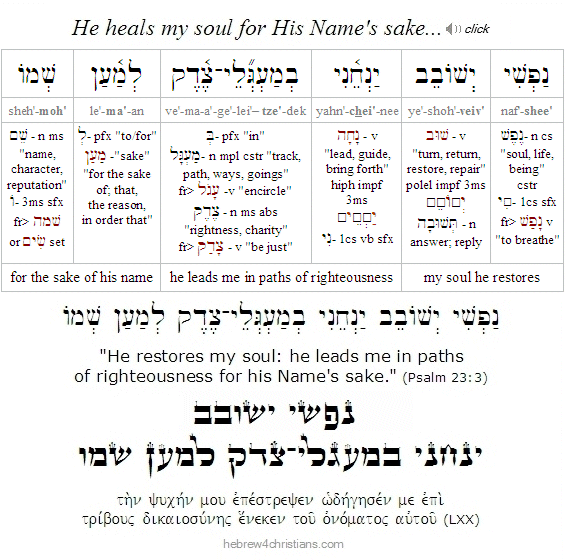 |
Peace and Affliction...

04.14.21 (Iyyar 2, 5781) When we undergo affliction, we often cannot discern its deeper purpose because the pain pulls us back to the present moment... The hidden blessing of affliction (ברכה סוֹדית) is only perceived later, in hindsight, where we discover a deeper longing for heaven has been instilled within our souls. Affliction helps us become more willing to let go of our attachments to this world; it teaches us to look upward, for the high country of heavenly consolation. The pleasures and expectations of this world distract our hearts from what we most need, and our troubles and afflictions therefore open us to the truth of God.
When we genuinely accept that God defines the truth for our lives, we realize that affliction is sovereignly given to us so that we can learn abide in Him without constraint. Life is a "school" for the soul. God is the Teacher, we are "disciples" (i.e., talmidim: תַּלְמִידִים, "learners"), and affliction is our divinely appointed tutor. Many of us are slow to learn, but God is patient with those whom He disciplines. The goal is to never lose sight of what's most important, which is God Himself. If you find yourself in a place of resistance, then you must decide whether or not you will trust the Teacher. The key lies in surrendering to God's will by submitting to His rule over all things. Yielding to God's will is the path of serenity and inner peace.
Hebrew Lesson:
 |
Israel and the Church:
What's the Connection?

[ The following is related to Yom Ha'atzmaut, or Israel's Independence Day... ]
04.14.21 (Iyyar 2, 5781) When studying the "Jewish roots" of our faith, certain questions often arise regarding the nature of the "church," the nature of "Israel," and the relationship between them. Do Gentile Christians become "Jewish" on account of their relationship to Yeshua? Does the "Church" somehow replace the Jewish people in God's plan as the "new Israel"? Exactly how should we understand the relationship between the church and Israel today? In order to answer these questions we must carefully study the meaning of the word "Israel," the meaning of the word "Church," and the meaning of the word "remnant," and then consider the logical relationships between these categories or groups...
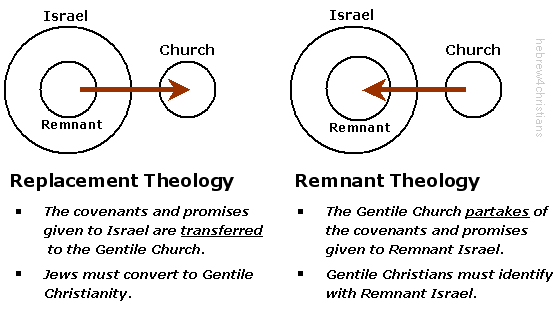 |
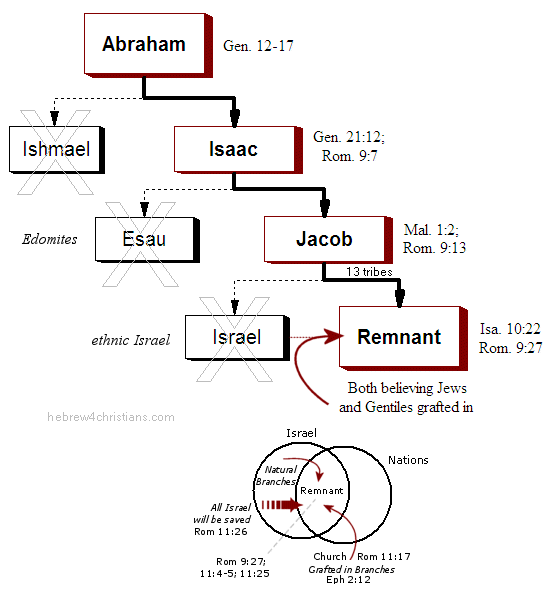 |
It's important to realize that "Remnant Theology" understands that the church is "grafted in" or "in-placed" within remnant Israel, and not the other way around -- i.e., remnant Israel is not understood to be placed within the church. This is a vital distinction, since otherwise the church would be guilty of "boasting" that its "branches" have been grafted into the Olive Tree, rather than remembering that the root is what sustains the church (Rom. 11:18). While only some ethnic Jews are part of the faithful remnant, all saved Gentiles are spiritually made Jewish (see Rom. 2:29; Rom. 4:16; Eph. 2:12-19), and therefore are made partakers of the covenantal blessings given to remnant Israel. But it is crucial to understand that the church is incorporated into the chosen remnant of Israel, and not the other way around.
For more on this topic, see:
Hebrew Lesson:
The Divine Present...
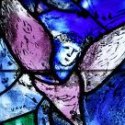
04.14.21 (Iyyar 2, 5781) Recently we prayed for a friend who was given a terminal diagnosis... Confronting the prospect death sobers the heart and focuses our perspective. For example, when we "casually" discuss theology, there may arise a temptation to become proud and to assume that we have a sort of "theological superiority" in our thinking. We may get into hairsplitting distinctions and hotly argue our convictions with others. Be careful! We just don't have all the answers. After all, what do we really know about God, the LORD, as He is in Himself? Do we know Him as did our father Abraham? Do we know Him when our understanding fails us? God told Moses that his Name means that He is Present in every moment - past, present, and future. The Name God is "shorthand" for "I AM with you always." In other words, there is no moment, just as there is no place, where God is not "there" for us. This includes our times of testing, darkness, and even death itself. The LORD our God does not abandon us, even when He seems hidden, powerless, or unwilling to intervene. Faith trusts that He is present there, in moments when we are vulnerable, weak, afraid, and seemingly all alone... The Lord does not take away those fears common to life in this fallen world, but he instead gives us courage produced by the faith in his presence. Faith receives God as always present, the substance of our hope of eternal healing and eternal life. And He is present here, now, as you read these words...
Hebrew Lesson:
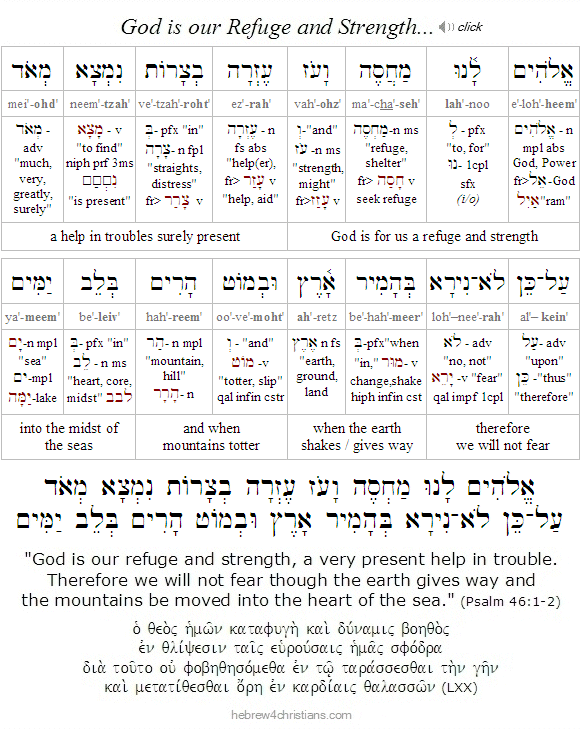 |
Keeping your Focus...

04.13.21 (Iyyar 1, 5781) "Seek ye first the kingdom of God and his righteousness" (Matt. 6:33). This is the right approach to life: Open your heart to heaven and seek God's presence before you do anything else (Prov. 3:5-6). This is particularly important at this time, friends. Do you want your mind to be confused, excited, depressed or angry? Do you want others to decide what is important and "real" for you? Then turn your attention to this world and its rumors and news. The mass media thrives on trouble - whether real or imagined - and serves to manipulates people by making them afraid. The newsmakers of this world understand that fearful people make their most loyal consumers...
Consider the godless assumptions that underlie the "obvious" news of the this world, however. Purported experts are lined up; the dialog is scripted; sound bites are repeated on a relentless schedule, images and videos are crafted, yet you will hear nary a word to call upon God for healing and deliverance. God is simply "not there"; he is not part of the narrative of the present crisis or trouble. Yet nothing could be further than the truth!
The LORD God must be the first principle of our thinking or else we will become deceived, regardless of the formal validity of our reasoning. There is a difference between soundness and validity, and if we do not begin with truth, our thinking will be impaired, even if we accidentally make inferences that turn out to be empirically true. Therefore we must be vigilant and vigorously challenge ideas that attempt to seduce us away from the truth and divide our affections. We must learn to identify the false assumptions that deny the knowledge of God and take "every thought captive" to Messiah. We must be on guard for subtle and calculated appeals to compromise our faith (2 Cor. 10:5). If we find ourselves in a state of recurring temptation, we must examine the underlying assumptions that are at work in our thinking. If we dig deeper, we are likely to discover that we are doubting that God cares for us, or we are fearful that God will not meet our needs. We must therefore counter such faithless assumptions with God's revealed truth, and that means regularly studying and reviewing the Scriptures to remind ourselves about what is real rather than what is illusory. We then can learn to look at life as it really is - a spiritual world, a "valley of decision," a corridor that irresistibly leads to the world to come. Each soul is on a journey to meet with God for judgment... God does not leave us comfortless. He has promised to never leave nor forsake those trusting in Him. He is your Good Shepherd who walks with you during your sojourn through this temporal world (Psalm 23).
Hebrew Lesson:
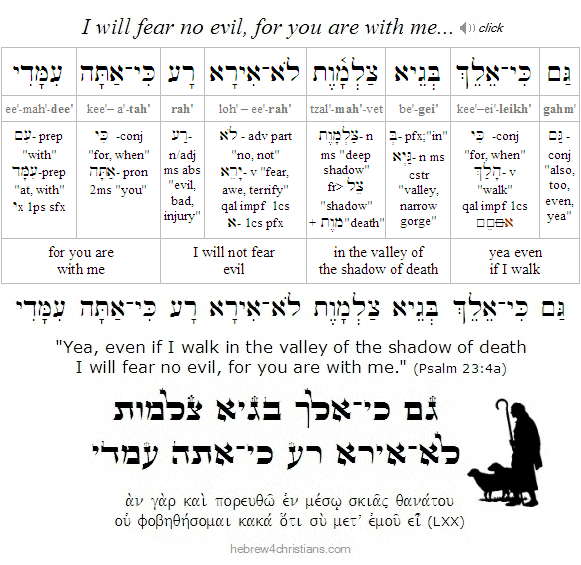 |
Watching your Tongue - שְׁמִירַת הַלָּשׁוֹן

[ The following is related to our Torah reading this week, parashat Tazria-Metzora.... ]
04.13.21 (Iyyar 1, 5781) According to the sages, tzara'at ("leprosy") was a punishment for evil speech, or "lashon hara" (לָשׁוֹן הָרָה). In midrashic literature, lashon hara is regarded as equal to idol worship, sexual immorality, and murder, and the one who indulges in it defiles his mouth so that even words of Torah and prayer are corrupted. "From the same mouth come blessing and cursing; brothers, these things ought not to be so" (James 3:10). The sages even go further: "Lashon Hara is worse than murder. One who murders, murders but one; however, one who speaks lashon hara kills three: the one who speaks it, the one who hears it, and the one of whom it is spoken." Lashon hara is likened to "emotional homicide" caused by publicly shaming another. According to the Talmud, the shamed person's face is drained of blood and turns white, and therefore humiliation is called "whitening the face" (i.e., halbanat panim: הלבנת הפנים). Therefore the sages identify the metzora (i.e., leper) with hamotzi ra, "one who brings forth evil," and they stress shemirat ha-lashon, the "guarding of the tongue," as a cardinal virtue of the righteous.
"Suffering is a sign that you're out of touch with the truth. Suffering is given to you that you might open your eyes to the truth, that you might understand that there's falsehood somewhere, just as physical pain is given to you so you will understand that there is disease or illness somewhere. Suffering points out that there is falsehood somewhere. Suffering occurs when you clash with reality. When your illusions clash with reality when your falsehoods clash with the truth, then you have suffering. Otherwise there is no suffering." - De Mello: Awareness, 1992
Those who think it easy to control the tongue have likely never really tried to do so. "The tongue is a small member, yet it boasts of great things. How great a forest is set ablaze by such a small fire! And the tongue is a fire, a world of unrighteousness. The tongue is set among our members, staining the whole body, setting on fire the entire course of life, and set on fire by hell" (James 3:5-6). Ultimately, controlling your tongue (i.e., shemirat ha'lashon: שְׁמִירַת הַלָּשׁוֹן) is a matter of controlling your inner thoughts, your heart, and your attitude (shemirat ha-lev). Therefore we are admonished to be "quick to hear, slow to speak, slow to anger," since the anger of man never works the righteousness of God (James 1:19). May the LORD our God help us always to speak with grace, "seasoned with salt" (Col. 4:6); and may we all "speak the truth in love to grow up in every way" (Eph. 4:15).
Hebrew Lesson
Note: For more on this important topic, click here.
Affliction and Teshuvah...
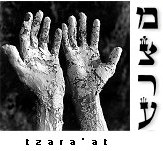
[ The following is related to our Torah reading this week, parashat Tazria-Metzora... ]
04.13.21 (Iyyar 1, 5781) In one of his comments on tzara'at (often mistranslated as "leprosy"), the French medieval commentator Shlomo Yitzhaki, or "Rashi," says that affliction comes from haughtiness, and to be healed requires teshuvah (repentance). However, there is no genuine teshuvah until a person truly understands the greatness of God. After all, a person can be humbled from a broken heart, from serious illness, from poverty, and so on, but were these conditions different there may be a return to haughtiness, as we see in the case of Pharaoh. True humility is unconditioned and is based on the recognition and acceptance of the magnificence and glory of God. Yes, there is godly sorrow that leads to repentance, but ultimately repentance resolves upon the goodness and greatness of God, and without keeping that greater end in view, there is little practical difference between repentance and regret, despair, and shame. May the awe of the LORD be upon us...
Hebrew Lesson:
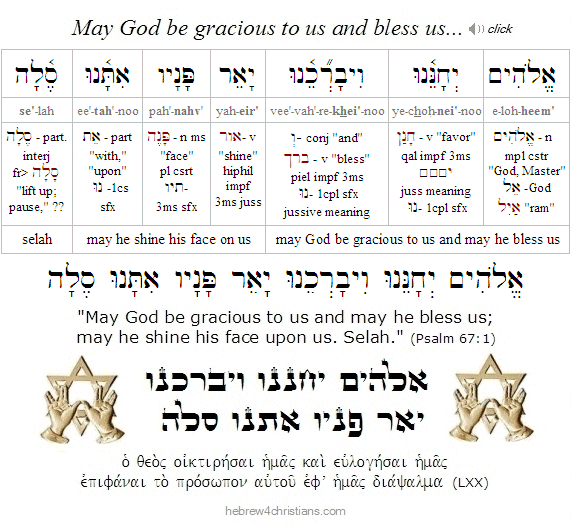 |
Not the Author of Chaos...
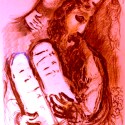
04.12.21 (Nisan 30, 5781) These are lawless days, where worldly culture celebrates moral anarchy and teaches the narcissistic philosophy that everyone "should" do what is right in his or her own eyes... These are like the "days of Noach," where the wickedness has become great in the earth, and intention of the thoughts of people's hearts has become evil continually (Gen. 6:5). Because worldly culture has suppressed and exiled the truth of God from the public domain, God has pronounced "like-for-like" judgment by giving people over to the tyranny of their darkened passions, resulting in inner chaos and self-destructive impulses. The very worst judgment of God is when He removes his hand and says, "Have it your way..." (Rom. 1:28). We now live in a stupefied age wherein people are unable to think clearly or use logic, but instead resort to violence and ad hominem attacks on others because of their impaired thinking and hardened hearts...
The importance of the Torah, or the "law" of God, cannot be overstated, friends. Yeshua plainly said to his followers: "Do not think that I have come to abolish the Law or the Prophets; I have not come to abolish them but to fulfill them. I tell you the truth, until heaven and earth pass away not the smallest letter or even a stroke of a letter (קוצו שׁל יוד) will pass from the law until everything comes to pass. So anyone who breaks one of the least of these commands and teaches others to do so will be called least in the kingdom of heaven, but whoever obeys them and teaches others to do so will be called great in the kingdom of heaven" (Matt. 5:17-19). He further solemnly warned: "Not everyone who says to me, 'Lord, Lord,' will enter into the kingdom of heaven– only the one who does the will of my Father in heaven. On that day, many will say to me, 'Lord, Lord, didn't we prophesy in your name, and in your name cast out demons and do many powerful deeds?' Then I will declare to them, 'I never knew you. Go away from me, you workers of lawlessness' (Matt. 7:21-23).
To the ungodly, "freedom" means being lawless, that is, acting under their own authority apart from the will of God. This of course was the original temptation in Eden, when the nachash (serpent) told Eve that if she acted under her own authority, her eyes would be "opened" and she would be "like God," knowing both good and evil (Gen. 3:5). That is always the creed of the wicked: "Do as thou wilt..." True freedom, however, is not the supposed right to do whatever you want, but instead is the power to do what is right, living in harmony with moral reality, and being liberated from the slavery of impulses to do evil. The moral law of God, then, is the blessing of having boundaries, order, and moral sanity within our lives, and that is why the Holy Spirit inscribes the law "within" us - to help guide our steps, protect our way, and to empower us to live in obedience to the truth of God (Jer. 31:33). If you are led by the Spirit, you are no longer enslaved to the law of sin and death -- that is, the lower nature and its idolatrous impulses -- but you will bear the fruit of righteousness, goodness and truth (Gal. 5:18; Eph. 5:9). Let no one deceive you with vain words. "By this it is evident who are the children of God, and who are the children of the devil: whoever does not practice righteousness is not of God, nor is the one who does not love his brother" (1 John 3:10).
Hebrew Lesson:
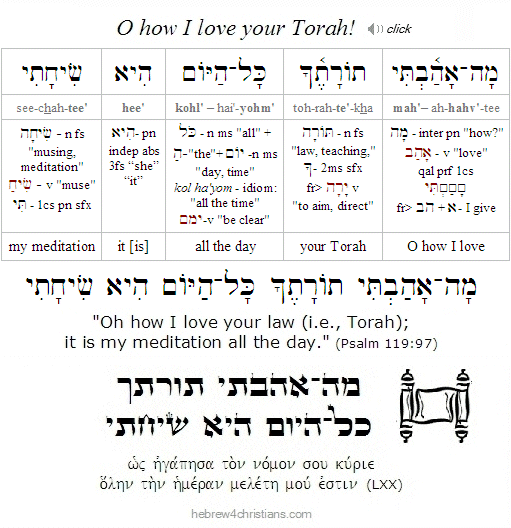 |
Letting go of fear...

04.12.21 (Nisan 30, 5781) "Cast your burden upon the Lord, and he will sustain you" (Psalm 55:22). It is important to fully appreciate what this means. When you truly "cast your burden upon the Lord," you are insisting on peace of mind, refusing all worry, and resolving to let go of your anxieties... When you are tempted to consider trouble, when you hear the whisper of fear within, remember to cast your burden upon the Lord and he will sustain you, for "he will never permit the righteous to be moved..." But what of unutterable pain or sorrow? What of intractable sickness or irrecoverable loss? What if you cannot express the burden you carry? Then get alone with God and lay your soul bare: the heart has its own voice regardless of the words we are able to articulate. As it is written: בטחוּ בוֹ בכל־עת - "Trust in him at all times, O people; pour out your heart before him; God is a refuge for us" (Psalm 62:8). The Holy Spirit repeatedly calls out: al tira, "do not be afraid." Let not your heart be troubled; be anxious for nothing; believe that the LORD faithfully cares for you (John 14:27; Psalm 42:5; 1 Pet. 5:7).
Pouring your heart out to God in an honest, spontaneous, and intensely personal way is sometimes called "hitbodedut" (הִתְבּוֹדְּדוּת) in Hebrew. After we "talk our hearts out" before the Lord, in our emptiness we can begin to truly listen, as it says, "In returning and rest you shall be saved; in quietness and in trust shall be your strength" (Isa. 30:15). Only after we sigh deeply and surrender are we receptive to the voice of the Spirit's whisper. אַשְׁרֵי כָּל־חוֹכֵי לוֹ - "Blessed are all those who wait for Him" (Isa. 30:18). We wait, we abide, we persevere -- even when God seems to "take his time" or does not immediately intervene in ways we might apprehend. We must not lose heart, for we find strength when we trust in God's love... The Light of the world still shines: Yeshua, be my inner word, my heart, and my groaning for life today, and forevermore, amen.
Hebrew Lesson:
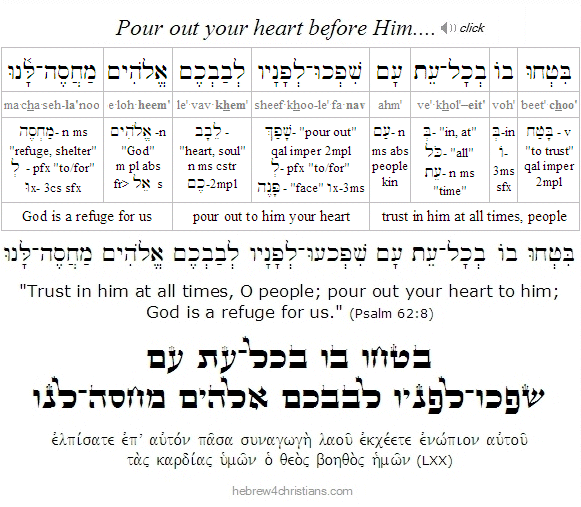 |
God's "Super Sign" of Israel...
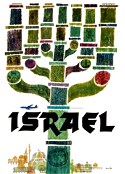
[ We observe Yom Ha'aztmaut April 14 at sundown through the following day (April 15th). ]
04.12.21 (Nisan 30, 5781) After the Jewish people had suffered for nearly 2,000 years of exile as clearly foretold by Moses (see Lev. 26:38, 44; Deut. 28:64-64) and the other Hebrew prophets (Isa. 43:5-6; Jer. 30:11; Joel 3:2; Ezek. 36:8-10; Hos. 9:1-10, etc.), Israel was miraculously reborn as a nation in their ancient homeland on May 14, 1948 (Iyyar 5, 5708). Today Jews across the world celebrate Iyyar 5 as Israeli Independence Day (this year we observe it earlier to so it will not fall on the Sabbath).
Israel's Independence Day is called Yom Ha'atzma'ut (יום העצמאות), the "day of independence." In Hebrew, the word independence (atzma'ut) comes from atzmi - "my bones" (i.e., etzem: עֶצֶם), so the name itself alludes to God's glorious promise to revive the "dry bones" (עֲצָמוֹת) of Israel by bringing the Jewish people back from their long exile during the End of Days (Ezek. 37:1-6). "Son of man, can these bones live?"
Hebrew Lesson:
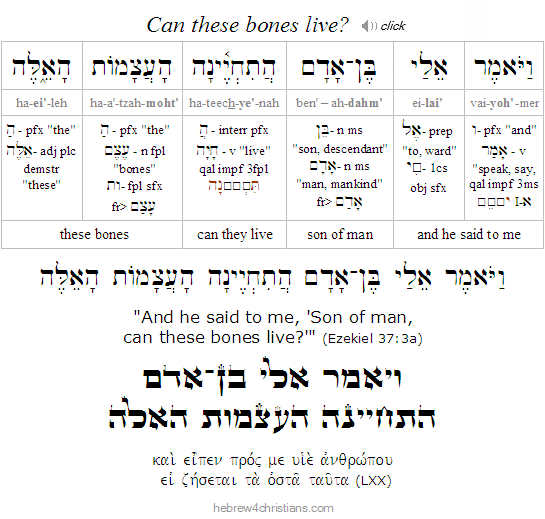 |
But why should Christians care about ethnic Israel? After all, many Christian denominations advocate some version of "Replacement Theology" and regard the promises God made to the Jewish people as belonging exclusively to their church... The existence of the modern State of Israel therefore evokes little thanks to God from these groups, and some of their ranks even regard Israel's revived presence on the world stage as an embarrassment to their typically "liberal" theology. Hence we see the (remarkably bad) phenomena of so-called "Christian" church denominations that express anti-Israel sentiment, even asking their followers to divest investments in Israel on behalf of the "Palestinians," etc.
The title "Christ" refers to the anointed King of Israel, the Mashiach (מָשִׁיחַ)... To say "Jesus Christ" is therefore to affirm that Yeshua is none other than the Messiah, the rightful King of Israel (מֶלֶךְ יִשְׂרָאֵל). Followers of Jesus, the One born "King of the Jews" (Matt. 2:2), should therefore care deeply about Israel because the existence of Jewish people - and of the nation of Israel in particular - demonstrates that the LORD (יהוה) is completely faithful to the covenant promises He made to our patriarchs (e.g., Gen. 15:9-21). Indeed, the Scriptures teach that the Name of God is forever designated as אלהי אברהם אלהי יצחק ואלהי יעקב - "the God of Abraham, the God of Isaac, and the God of Jacob" (Exod. 3:15), just as it is also the "LORD God of Israel" (יְהוָה אֱלהֵי יִשְׂרָאֵל). The perpetuity of the Jewish people - despite so much satanic hatred over the millennia - is an awesome testimony of God's loyal love (Jer. 31:35-37). עַם יִשְׂרָאֵל חַי / am Yisrael chai: "The people of Israel live!" Israel is a sign of the "sure mercies of David" (חַסְדֵי דָוִד הַנֶּאֱמָנִים) that are revealed in Yeshua, the Jewish Messiah (Isa. 55:1-6). Moreover, the New Covenant itself, as foretold by the prophet Jeremiah, explicitly promises the perpetuity of the Jewish people throughout the ages:
Behold, the days are coming, declares the LORD (יהוה), when I will make a new covenant (בְּרִית חֲדָשָׁה) with the house of Israel and the house of Judah, not like the covenant that I made with their fathers on the day when I took them by the hand to bring them out of the land of Egypt, my covenant that they broke, though I was their husband, declares the LORD. But this is the covenant that I will make with the house of Israel after those days, declares the LORD: I will put my Torah (תּוֹרָה) within them, and I will write it on their hearts. And I will be their God, and they shall be my people. And no longer shall each one teach his neighbor and each his brother, saying, 'Know the LORD,' for they shall all know me, from the least of them to the greatest, declares the LORD. For I will forgive their iniquity, and I will remember their sin no more."
Thus says the LORD, who gives the sun for light by day and the fixed order of the moon and the stars for light by night, who stirs up the sea so that its waves roar - the LORD of hosts is his Name: "If this fixed order departs from before me, declares the LORD, then shall the offspring of Israel (זֶרַע יִשְׂרָאֵל) cease from being a nation before me forever." Thus says the LORD: "If the heavens above can be measured, and the foundations of the earth below can be explored, then I will cast off all the offspring of Israel for all that they have done, declares the LORD. (Jer. 31:31-37)
According to this theologically critical passage, if you saw the sun shine today or the stars in the night sky, you can be assured that God's promise to preserve the "offspring of Israel" -- (i.e., zera Yisrael: זֶרַע יִשְׂרָאֵל) -- is in effect. Indeed, in the world to come, heavenly Jerusalem will have the names of the twelve tribes of Israel engraved upon its gates (Rev. 21:12). Note well that this is the only occurrence in the entire Tanakh (i.e., "Old Testament") that the New Covenant (בְּרִית חֲדָשָׁה) is explicitly mentioned... It is a foundational passage of Scripture for those who claim to be followers of the Jewish Messiah.
The spiritual blessings Christians enjoy come from the root of God's covenants with Israel... Yeshua our Savior was born the King of the Jews, and he plainly said הַיְשׁוּעָה מֵאֵת הַיְּהוּדִים הִיא- "salvation is from the Jews" (Matt. 2:2; 27:11; John 4:22). The Apostle Paul clearly warned those who think the church has "replaced" Israel: "Remember it is not you who support the root, but the root that supports you" (Rom. 11:18). This doctrine is so foundational that it may be rightly said that how you think about Israel will affect every other area of your theology. Indeed, the nation of Israel is God's "super sign" that He is faithful to His covenant promises (Jer. 31:35-37). Celebrating Israel's existence acknowledges God's loyal love for us all! For more on this subject, see the article, "Is Christianity Anti-Jewish?"
In the holy Torah we read how God said to Moses, "Say this to the people of Israel, 'The LORD, the God of your fathers, the God of Abraham, the God of Isaac, and the God of Jacob (אלהי אברהם אלהי יצחק ואלהי יעקב), has sent me to you.' This is my name forever, and thus I am to be remembered throughout all generations'" (Exod. 3:15).
Hebrew Lesson:
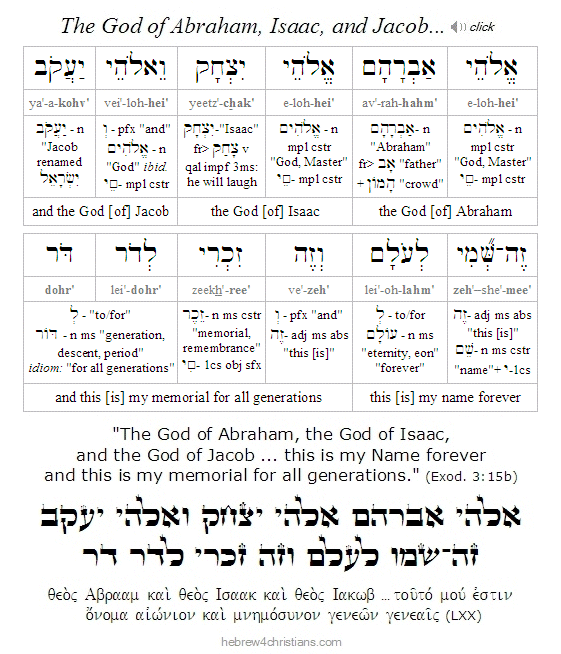 |
"Your Name, O LORD, endures forever, your renown, O LORD, throughout all ages" (Psalm 135:13). Therefore the prophet cries: "in the east give glory to the LORD; in the coastlands of the sea, give glory to the Name of the LORD, the God of Israel" (Isa. 24:15).
Hebrew Lesson:
Parashat Tazria and Parashat Metzora...

04.11.21 (Nisan 29, 5781) Shavuah tov, chaverim. This week we have a "double portion" of Torah to study, namely parashat Tazria (תזריע) and parashat Metzora (מצרע), both of which focus on the concept of being "clean" (i.e., tahor: טָהוֹר) and obtaining purification from a state of "uncleanness" (i.e, tamei: טָמֵא). The first portion, Tazria, continues the discussion of the laws of "purity" and "impurity" that began with parashat Tzav. Of particular interest are certain afflictions, collectively called tzara'at (צארעת), that caused the affected person (or thing) to be both ritually impure (tamei) and in a state of uncleanness (i.e., tumah: טומאה). Tzara'at was an a spiritual affliction (i.e., yisur: יסור) that could only be diagnosed by a kohen (priest) and not by a doctor... If someone was diagnosed with tzara'at, they were called a "metzora" (מצרע) and forced to live in a state of exile where they were instructed to do teshuvah (repentance) and seek spiritual healing.
After the metzora had apparently been healed, he or she would call for the priest to be reexamined. If the priest saw no sign of uncleanness, a second examination was scheduled seven days later, and if the person was still free from any sign of the disease, a process of purification (i.e., tahara: טָהֳרָה) would begin. The purification ceremony was somewhat like a "personal Yom Kippur" service. After the second examination, the priest required that the metzora bring the following items for his cleansing:
- An earthenware bowl filled with spring water (mayim chayim)
- Two birds of the same type (whether turtledoves or pigeons)
- A stick of cedar wood
- A hyssop branch
- A scarlet thread
The priest then commanded that one of the birds should be slaughtered over the earthen vessel filled with fresh water, with its blood mixing with the water. The living bird, the piece of cedar, and the hyssop branch were then tied together using the scarlet thread, and the entire bundle was dipped into the earthen vessel. The blood and water mixture was then sprinkled seven times on the healed metzora, and the living bird was then set free.
Once completed, the healed person washed their clothes, shaved off all their hair (including the eyebrows), and was immersed in a mikveh (ritual pool for cleansing). On the eighth day the person would bathe again and offer sacrifices, the blood of which was mixed with oil and applied to the earlobe, thumb and foot -- similar to the blood applied to the priests during their ordination. Only after all this was the person pronounced tahor (clean) by the priest. The time of uncleanness would be over, and he would be like a person brought back from the dead to new life. In a very literal sense, then, we see how the metzora was "reborn" by water and by the blood (John 3:5; 19:34; Heb. 9:19).
Notice how the purification ritual corresponded with other rituals revealed in the Torah. The sprinkling of the hyssop by the priest recalled both the blood of the Passover lamb and the sprinkling of the ashes of the Red Heifer that cleanse from contact with death; the offering made of the two birds - one which was sacrificed and the other set free - recalled the scapegoat of the Yom Kippur ritual. The washing of garments, the shaving of all hair, and the immersion in a mikveh recalled the birth of the Jewish people at the Sea of Reeds. The blood of the guilt offering applied to the earlobe, thumb and foot, recalled the dedication of Aaron and his sons as the priests of Israel (Lev. 14:14). In other words, the individual purification process mirrored the purification of the community of Israel, and healing ultimately meant being re-identified as a redeemed child of God.
Healer of the Brokenhearted...
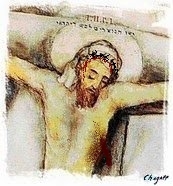
04.10.21 (Nisan 28, 5781) Our Lord is able to save "to the uttermost" those who come to God through Him, since He ever lives to make intercession for them (Heb. 7:25)... There is no realm beyond his reach, no depth of darkness that overcomes His light, and no fearful heart that is not drawn close by means of the glory of his outstretched arms...
Hebrew Lesson:
The Gospel of Surrender...

[ Are you "saved"? Do you understand what "salvation" really means? This brief article explores some of the issues regarding these questions... ]
04.09.21 (Nisan 27, 5781) Yeshua solemnly warned those who professed faith: "Not everyone who says to me, 'Lord, Lord,' will enter the kingdom of heaven, but the one who does the will of my Father who is in heaven. On that day many will say to me, 'Lord, Lord, did we not prophesy in your name, and cast out demons in your name, and do many mighty works in your name?' And then will I declare to them, 'I never knew you; depart from me, you workers of lawlessness'" (Matt. 7:21-23). Despite the practice and profession of their faith, these people were essentially strangers to God... They had a false sense of assurance, believing that they were "serving God" while they really were not... In light of this dreadful possibility, the crucial question here is whether Yeshua truly knows you. You may know a lot about God, religion, spirituality, and yet you may remain unknown by him... So where do you find life? What are you loving? Where are you going?
The call to follow Yeshua implies surrendering your entire being in service to him; it is a radical decision that will affect every aspect of your life, leading you to "die to yourself" and to undergo the crucifixion of your world. Following Yeshua marks the end of your life on your own terms, submitting yourself to him as "my Lord and my God" (John 20:28). As Bonhoeffer once wrote, "When Christ calls a man, he bids him come and die" (Cost of Discipleship).
From a "natural" point of view following Yeshua is quite impossible, since the "flesh" (i.e., the principle of autonomous self-life) is hostile to the authority of God and intractably refuses to yield to God's will (Rom. 8:7). Indeed the "carnal" or "natural" self is inherently selfish and unable to free itself from its enslaving and self-serving impulses. As it is written, "The heart is deceitful above all things, and incurably sick; who can understand it?" (Jer. 17:9).
The miracle of grace (נס החסד), on the other hand, occurs when what is impossible for man is made possible by God's intervention, that is, when a spiritually dead heart is somehow enabled to genuinely first apprehend and then to respond to spiritual reality. This "divine encounter" is more than merely acknowledging the truth intellectually but involves surrendering to God from the heart - turning your will and your life over to the care and direction of God in trust. Again this is a matter of the heart - surrendering to God's authority, presence, and love... This is how we find Reality – by turning to the truth (teshuvah) and accepting its terms. As we receive God's love, as we embrace it as our own, the truth of Messiah becomes inwardly visible. This comes from a place of surrender and acceptance. As Paul Tillich said, "Sometimes in a moment of weakness light breaks into darkness, and it is as though a voice says, 'You are accepted; you are accepted... Do not seek for anything; do not perform anything; do not intend anything. Simply accept the fact that you are accepted.' If that happens to you, then you experience grace, and everything will be transformed."
Such a miracle may happen suddenly (as an epiphany or radical transformation) but more often it occurs as a "slow-motion" realization, an increasing awareness that turns to settled conviction that God is real and is knowable within your heart. In either case, however, the "flesh dies hard," and therefore it is an ongoing struggle to surrender to God's will (Gal. 5:17; Rom. 7:15-25). Often we learn by revisiting waste places of our lives, becoming "sick of our sickness," and finally letting go of the old ways of coping with our fear and pain....
For many people the idea of personal Savior who loves us, forgives us, and promises us healing is comforting, but they may struggle to submit to God's authority and yield to Him as the LORD in their daily lives. They may accept "the LORD" as an abstract concept, though the idea of Adonai (אדני), literally "my LORD," suddenly makes the issue intensely personal.
Dietrich Bonhoeffer once said that "only those who believe obey, and only those who obey believe," though it is important to understand that the obedience spoken of is not to the law of God - since no one can keep the law perfectly - but instead refers to the obedience of faith itself, that is to trust that God is "for you" and is your Healer (John 6:29). Indeed the very first word of the Ten Commandments is to believe that the LORD is your God -- to accept the message of hope and to believe in your personal deliverance from bondage (Exod. 20:2).
Following Yeshua is not a sort of "moral reformation" or self-improvement program to make us acceptable to God. Yeshua did not die on the cross so that we could become followers of the rabbis... No! He is LORD and Master and we find salvation in His acts of deliverance done on our behalf and for our benefit. The temptation is always to go back to the law of sin and death (i.e., the principle of self-justification), but as Luther once said, "The sin underneath all our sins is the lie of the serpent that we cannot trust the love and grace of Christ and that we must take matters into our own hands." In other words, whenever we emphasize the role of our obedience to the law we implicitly impugn the righteousness of God that justifies the ungodly and who alone can transform the human heart... The focus must be on Yeshua.
On the other hand, Yeshua did not suffer and die a bloody and incomprehensibly painful death upon the cross so that we would regard our sins lightly or to minimize their offence before heaven. Indeed regarding grace as something "cheap" is an affront to great price God paid for our healing remedy. We must find a balance here, as Bonhoeffer also said: "The truth is that so long as we hold both sides of the proposition together they contain nothing inconsistent with right belief, but as soon as one is divorced from the other, it is bound to prove a stumbling block. 'Only those who believe obey' is what we say to that part of a believer's soul which obeys, and 'only those who obey believe' is what we say to that part of the soul of the obedient which believes. If the first half of the proposition stands alone, the believer is exposed to the danger of cheap grace, which is another word for damnation. If the second half stands alone, the believer is exposed to the danger of salvation through works, which is also another word for damnation" (Cost of Discipleship). Yes, balance is essential.
"If you confess with your mouth that Yeshua is LORD and believe in your heart that God raised him from the dead, you will be saved" (Rom. 10:9). Confessing that Yeshua is the LORD (ישוע הוא יהוה) means affirming that he is God the Savior (אלוהים המושיע), the LORD of Glory (מלך הכּבוד) before whom every knee shall bow and every tongue shall confess (see Isa. 45:22-23; Rom. 14:11; Phil. 2:10). As Thomas confessed before the resurrected Savior: אדני ואלהי - "You are my Lord and my God" (John 20:28). Indeed Yeshua is the Creator and Sustainer of Reality, the Source of Life, and the true Judge and Moral Authority (John 1:3-2; Heb. 1:3; Isa. 33:22; John 5:22). And because he is the LORD, your LORD - Adonai (אדני) - you are to surrender to his authority and serve him b'khol levavkah - "with all your heart," as it is written: "And now, Israel, what does the LORD your God require of you, but to fear the LORD your God, to walk in all his ways, to love him, to serve the LORD your God with all your heart and with all your soul, and to keep the commandments and statutes of the LORD, which I am commanding you today for your good?" (Deut. 10:12-13).
In the Greek New Testament, Yeshua is called ho kurios (ὁ κύριος), "the Lord," the word chosen to translate the original Hebrew word YHVH (יהוה), as well as ho despotes (ὁ δεσπότης), the word chosen to translate the Hebrew word Adonai (אדני). Yeshua is the Sole Sovereign (ריבונו של עולם), the "Most High" or Ascended God (אל עליון), the King of Kings (מלך המלכים), the LORD of Lords (אדני האדנים), the God of gods (אלהי האלהים), the Shepherd of Israel (רעה ישׂראל), the true Judge (השופט), the Governor of Reality (מושל היקום), the Holy One (קדושׁ ישׂראל), the Redeemer of Israel (גואל ישׂראל), the God who is with us (עמנו אל), the Light of the world (אוֹר העולם), the Prince of Peace (שׂר־שׁלום), the Mighty God (אל גבור), the Everlasting Father (אביעד), and so on.
Followers of the LORD are called avdei YHVH (עבדי יהוה), that is, "servants (or slaves) of the LORD." In the Greek New Testament they are called douloi kurios (δοῦλοι κύριος). Both terms imply being entirely subject to the LORD as a "purchased" (i.e., redeemed) slave is subject to a master. The analogue is the Exodus from Egypt: God redeems his people from slavery to dark powers so that they could serve Him in the light and blessing of His presence. The redemption from Egypt led directly to the revelation at Sinai where we are taught the meaning of freedom as our personal responsibility to live according to the truth. However, we were also taught something else, namely that the revelation of the moral law of God revealed our need for a deeper deliverance - not from external conditions of oppression (Pharaoh) but from the oppression and impulses of our own egos. The tragedy of the Golden Calf and the image of the broken tablets reveals the shattered state of our lives. The message of the gospel (implicit in the Mishkan and the sacrificial system) is that God heals those who cannot heal themselves, for it was blood given by God that was used for our atonement upon the altar. The curse of the law (i.e., tochechah: תוֹכֵחָה) reveals the severity of our need for a Deliverer - not just from captivity to external forces, but more radically from the inner hell of the heart. The law which is "holy and just and good" reflects the despair of ourselves.
Now some Christians have fallen into the error of promoting "grace" as a form of resignation that reasons that since we cannot heal ourselves, we must remain unhealed - and yet such passivity effectually denies the instrumentality of grace as it works within the heart to transform and sanctify our character... We must remember that the sanctifying power of the God will make a real difference in the way we live our lives. Redemption is therefore an ongoing passion. We were redeemed from bondage only to be shown our inability to live without God's blessing and strength, and therefore we need redemption from our inner corruption by means of God's grace. Therefore Yeshua said to his followers, "I no longer call you slaves (δούλοι) but friends (φίλοι), because I have made known to you the heart of the Father (John 15:15). We are set free from the bondage to our sin by Yeshua, and the evidence of this freedom is a new direction, a new way of being. The grace of God - that is, his love working within us - is the means by which we are truly changed. Torah is moved within the heart, which is to say that God's will becomes a matter of our heart connection with Him, trusting in his forgiveness, love, and blessing so that we can serve him in the truth. This is effected by the Holy Spirit who empowers us to do God's will (1 Cor. 2:15). The Greek word "metanoia" (μετάνοια) conveys a similar idea - going "beyond" (i.e., meta: μετά) our everyday thinking (i.e., nous: νοῦς) to apprehend the realm of the sacred, the superlative wonder of existence, and the blessing of life. Teshuvah therefore is an ongoing turning to God for the blessing of life -- a matter of practicing the presence of God by abiding in his love. "Walking in love" changes our focus and direction so that we live in accordance with God's will for our lives.
Hebrew Lesson:
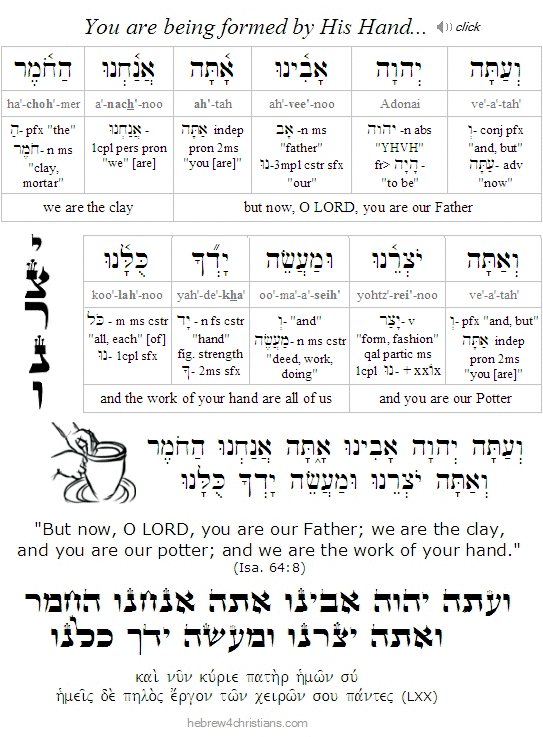 |
When Yeshua said you must be "born again," he was revealing our need for something beyond the realm of religious practices. This "something" is the righteousness of God that is "apart from the law" - a saving grace - that delivers us from ourselves.... We take hold of this righteousness when we confess our great need for God's salvation given in Yeshua. The first step is that of faith, looking to God for healing from our sickness unto death. "As Moses lifted up the serpent (נחשׁ נחשׁת) in the wilderness, so must the Son of Man be lifted up, that whoever believes in him may have eternal life" (John 3:14-15). Humanity as a whole has been "bitten by the snake" and needs to be delivered from its deadly venom. Just as the image made in the likeness of the destroying snake was lifted up for Israel's healing, so the One made in the likeness of sinful flesh was to be lifted up as the Healer of the world (Rom. 8:3). All we need to do is "look up and believe..."
The Spirit of God cries out, bacharta ba'chayim! - "Choose life - that you may live! For this commandment [i.e., choosing life] is not too hard for you; nor is it beyond your reach: it is very near to you - as close as your breath and as near as your heart (Deut. 30:11-14). You must "choose life," which which implies that is your personal responsibility to believe in the Reality of God, to trust in his providential care for your life, to affirm that "all is well and all manner of thing shall be well" for you, and to understand that your present struggle is designed by heaven to help you grow in grace and the knowledge of the truth (1 Pet. 3:16). All things work for our good (Rom. 8:28) and therefore "choose life" both in happier moments when all goes well, but also (and especially) in the midst of our afflictions, in the panting of our hearts for deliverance, in the loneliness of our heartaches, and in the laments of our soul over the pain of our sins. Faith courageously refuses the messages of fear, silences angry voices of this world, and resists the idols of the age that offer spurious respite from the struggle at hand... "If we live by the Spirit let us also walk in the Spirit" (Gal. 5:25). When you ask God to help you choose life, what are you doing if you are not asking God to grant you the ability to believe in the miracle of love? Choosing life involves the surrender of your heart and your will to the promise of God, choosing to receive the blessing of the Divine Presence – his word, his promise, and his healing – and resolutely deciding to live in light of that hope today. Dear friend, may you choose life this very hour...
 |
Suffering and Deliverance...
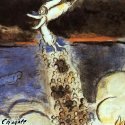
04.09.21 (Nisan 27, 5781) Sometimes suffering comes not from any lack of faith, but in the midst of faith, or even because of faith, since the LORD often uses affliction as the means of upbuilding the soul and developing spiritual resilience and maturity (Prov. 3:1-2). In light of God's sovereign power over all things, and God's great love for you, regard your suffering a blessing from your heavenly Father to help you grow (Job 5:17; Psalm 94:12; 119:71). Persevering in the midst of your struggle develops patience and humility, teaching you to know your own nothingness and to utterly rely upon the goodness and mercy of God. Over time, suffering strips away your illusions, so that nothing remains except the naked heart and the treasures of faith. Only then does the heart find its blessing in God alone.
People tend to believe whatever they want to believe until they are faced with reality, and therefore God orchestrates tests and challenges to awaken people from their illusions and to help them realize their need for deliverance. Such afflictions are sometimes called the "troubles of love" (יִסּוּרֵי אַהֲבָה). Thus we read in the Torah how the people groaned because of their slavery and then cried out to heaven for help: "And God heard their groaning; he remembered his covenant ... and God saw the people of Israel, and God knew" (Exod. 2:24-25). God knows our profound need for Him. Affliction teaches us that wishful thinking is unable to sustain the weight of reality, and only God Himself can truly save us...
I am amazed that pagans cling to the idea that their lives have real value despite their rejection of transcendent worth and beauty and goodness as revealed in the Jewish Scriptures. Their everyday assumptions are lifted from the Judeo-Christian tradition, yet their underlying logical and semantic foundation is quite simply an illusion…. I'd like to listen to them justify the reason for getting out of bed in the morning using just the language that is entailed by their metaphysical assumptions. If seriously questioned, especially in light of the traction of their own personal heartache and disappointments, it is doubtless that they, like Nietzsche, would find themselves going insane as they attempt to (re)define the most meaningful aspects of life....
Where it is written, "The troubles of my heart are enlarged; bring me out of my distresses" (Psalm 25:17), we understand that it is God who hems us in and limits us (the word "troubles" (צָרוֹת) derives from a root (צַר) that means to limit or constrict), for the purpose of "bringing us out" of our distresses, just as God brought our ancestors out of "Egypt" (i.e., from mitzrayim: -מ, "from," and צַר, "narrow places") so they could experience freedom and newness of life.. The first step of lasting deliverance (יְשׁוּעָה) is to believe the revelation: "I AM the Lord your God," which begins the healing (Exod. 20:2). We are then set free from our bonds to surface appearances as we trust in God's Presence, since we now understand everything in relationship with the sacred Ground and Source of all life (Acts 17:28).
Regarding the cry of the heart: "How long shall I take counsel in my soul, having sorrow in my heart daily" (Psalm 13:2), the sages remark that just as long as we take counsel in our own soul there will be despair, since only after we realize that no further counsel can help us do we give up and confess our need for God's salvation. Therefore deliverance comes as we trust in the LORD with all our heart, and do not rely on our own understanding (Prov. 3:5).
Hebrew Lesson:
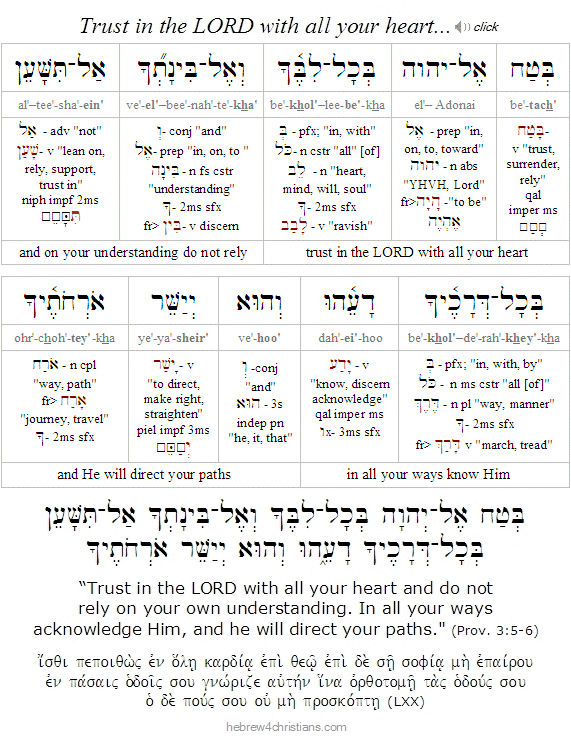 |
Trust in the Silence...
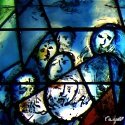
04.09.21 (Nisan 27, 5781) "I believe. I believe in the sun even when it is not shining; I believe in love even when feeling it not; and I believe in God, even when God is silent" (from an anonymous poem found on the wall of a cellar in Cologne, Germany, where some Jews hid from the Nazis).
קוּמִי רנִּי בַלַּיְלָה לְראשׁ אַשְׁמֻרוֹת
שִׁפְכִי כַמַּיִם לִבֵּךְ נכַח פְּנֵי אֲדנָי
שְׂאִי אֵלָיו כַּפַּיִךְ עַל־נֶפֶשׁ עוֹלָלַיִךְ
koo·mee · roh·nee · va·lai'·lah · le·rosh · ash·moo·roht
sheef·khee · kha·ma'·yeem · lee·bekh · noh·khach · pe·nei · A·do·nai
se·'ee · e·lav · ka·pa'·yeekh · al-ne'·fesh · oh·la·lai'·yeekh

"Arise, cry out in the night, at the beginning of the night watches!
Pour out your heart like water before the face of the LORD!
Lift your hands to him for the lives of your children."
(Lam. 2:19)
Teshuvah and Confession...
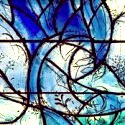
04.08.21 (Nisan 26, 5781) Part of the process of teshuvah - of turning to God - is turning to yourself, that is, learning to honestly observe yourself. Often it is not that we sometimes entertain bad thoughts, but rather we engage in a process of bad thinking, or more accurately, we unquestioningly accept assumptions based on fear and fantasy. Because of this, our reasoning becomes distorted and we lose our ability to see what is real. We then "play god" by justifying ourselves, unaware how we are being driven by fear and a profound sense of inadequacy. The remedy is to change your thinking, to question the assumptions at work in your reasoning, and to gain new perspective. For example, instead of seeing angrily, see your own anger and then ask what really lies behind it. Is it pride? fear? hurt? Look deeper and then come to God... Confession means making peace with reality, "owning" the truth about what's inside your heart. Often we do not find lasting deliverance because we fail to see the real issue. You can pray all day to be free from lust, for example, but the real issue might be fear of intimacy or fear of rejection, and so on.
Hebrew Lesson:
Psalm 32:5 Hebrew reading:
 |
Undoubtedly the root of a lot of suffering comes from the vain attempt to fill the infinite emptiness we feel with something other than God. The pride of the ego puts the self as the center, but this comes from a place of inner poverty... We demand to be the center because we are afraid we are nothing. Only the Lord can save us from ourselves - and we rely on Him to correct our thinking and show us the way of inner honesty and truth:
Hebrew Lesson:
The unexamined life -- especially as a follower of Yeshua -- is not worth living, and the practice of suppressing the truth about our sinful condition can lead to self-deception and even death (1 Cor. 11:30). "If we say we have no sin, we deceive ourselves, and the truth is not in us; if we confess our sins, he is faithful and just to forgive us our sins and to cleanse us from all unrighteousness" (1 John 1:7-8). "Therefore, confess (ἐξομολογέω, lit. 'confess out') your sins to one another and pray (εὔχομαι) for one another, that you may be healed. The prayer of a righteous person (tzaddik) works great power" (James 5:16).
Notice the link between confessing our sins and praying for one another with healing... Being yashar - honest and upright - produces spiritual power and life. The word translated "pray" (euchomai) means to "wish (εὐχὴ) for oneself (or for another) the good." Prayer is always reciprocal, as King David said in Psalm 35:13: "may what I prayed for happen to me!" (literally, tefillati al-cheki tashuv - "may it return upon my own breast").
We must begin by asking God for courage and strength... We must let go of the fear that we will discover the truth about who we really are -- about what we've done, what we've thought, about who we've allowed ourselves to become. Confession (ὁμολογία) means bringing yourself naked before the Divine Light to agree with the truth about who you are. Indeed, the word homologeo literally means "saying the same thing" - from ὁμός (same) and λόγος (word). We need to confess the truth if we are to be free from the pain of the past. When King David wrote, "The LORD is my Light and my salvation; whom shall I fear? (Psalm 27:1), he implied that he should even be free of fear of himself and of his past.... We also need to understand our sin in relationship to the wounds of the Savior, since without that connection, our repentance will be vain indeed....
Addendum: What is Sin?
The New Testament connects moral evil (or sin) with the absence of faith in the Lord: πᾶν δὲ ὃ οὐκ ἐκ πίστεως, ἁμαρτία ἐστίν, "All that is not from faith is sin" (Rom 14:23). Sin is also defined as rebellion and anarchy of the heart: ἡ ἁμαρτία ἐστὶν ἡ ἀνομία, i.e., "sin is lawlessness (i.e., anomia: ἀνομία), that is, the repudiation of God's authority as the definer and judge of moral reality (1 John 3:4). The apostle John further defined sin as "unrighteousness": Πᾶσα ἀδικία ἁμαρτία ἐστίν, "all unrighteousness is sin" (1 John 5:17), which may be further correlated with Paul's statement that "the wrath of God is revealed from heaven against all "ungodliness" (i.e., ἀσέβεια, profanity, lack of reverence for the gift of life) and unrighteousness of men (i.e., ἀδικία, injustice, cruelty), who by their unrighteousness suppress (i.e., κατέχω, put down, "smother") the truth, because what can be known about God is manifest in them (φανερόν ἐστιν ἐν αὐτοῖς, that is, it appears within them), because God himself has revealed it to them" (Rom. 1:18-19).
Sin therefore may be defined as the willful denial or disregard of reality, the deliberate squelching of the voice of conscience (i.e., consciousness of what is morally right and wrong), and the idolatrous exaltation of the ego as the ultimate concern of life. A life characterized by the ongoing practice of sin is marked by anarchy and chaos (תהוּ ובהוּ) that inevitably leads to loss and trouble. The "payback" for sin is death which is retribution for walking contrary to the truth. "The one who sins is the one who will die" (Ezek. 18:20). The divine judgment upon sin is spiritual and eternal separation from the reality and blessing of the Divine Presence... Hell is therefore the dreadful spiritual condition of living in a state of unending delusion and despair, removed from sanity and the truth of love that sets the soul free.
 |
The Fear of the LORD...
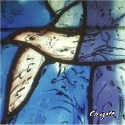
04.08.21 (Nisan 26, 5781) Some people are afraid that God will punish them for their sins, but the true fear of God, yirat shamayim (יִרְאָת שָׁמַיִם), is the tragedy of losing our closeness to Him... This is the fear of the Lord. The sages note that where it is written, "What does the LORD ask of you except to fear the LORD" (Deut. 10:12), we should read instead, "fear with the LORD" (לְיִרְאָה אֶת־יְהוָה), that is, we share his concern that we could forfeit the sanctity of a heart-relationship with Him due to carelessness and sin... We fear our sin because it blinds us from awareness of God's care and love. The fear of God can therefore be understood as God's fear that we will miss the blessing of intimately knowing him.
Similarly, where we read: "You shall be holy, for I, the LORD your God am holy" (Lev. 11:44; 19:2; 20:7; 20:26; 1 Pet. 1:15-16), understand that the Lord is grieved when we do not esteem ourselves and our lives as sacred, as "set apart" and of infinite importance... How else can we even begin to apprehend the sanctity of God and others if we do not simultaneously realize that we are set apart to be sacred? This is not ego-worship but the sober truth of the Spirit: we are to respect our lives and esteem them as sacred, since God has elevated us to be his children by means of the gift of Yeshua our Messiah...
Though most sages say that the greatest principle of Torah is to love your neighbor as yourself, Ben Azzai said that even greater is believing that God created human beings in His likeness (בִּדְמוּת), since then one cannot say, "Since I despise myself I can despise another as well; since I curse myself, let the other be accursed as well." Being made in God's likeness implies that how we regard ourselves and others is the same measure we regard God Himself (1 John 4:20). Therefore the first commandment is always, "I am the LORD thy God..." (Exod. 20:2), since apart from faith, there is no Torah of any kind....
The LORD has promised to never leave nor forsake us, though we can choose to turn away from his love and care for our lives... We are not permitted to fear other than that we have no fear of God, for that indeed is a fearful state of soul. May it please God to help each us never to leave nor forsake ourselves by choosing to become lost, by forgetting what is real, and by abandoning hope in the miracle for our lives... May the LORD help us not be grieved, not to hurt ourselves, and never to abandon our hearts to the despair of shame.
Hebrew Lesson:
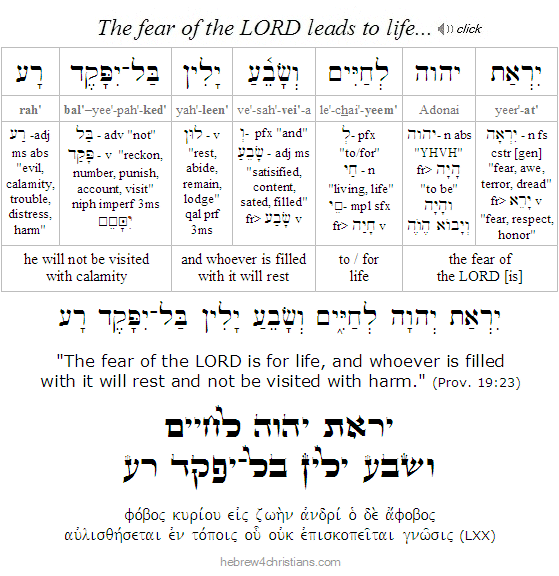 |
Deliver Us from Ourselves...

[ Yom HaShoah, or Holocaust Memorial Day, is observed April 7th (and 8th) this year... ]
04.08.21 (Nisan 26, 5781) Holocaust survivor Viktor Frankl wrote, "No man should judge unless he asks himself in absolute honesty whether in a similar situation he might not have done the same" (Man's Search for Meaning, 1946). There is a "shadow" or darker side to ourselves that we normally keep hidden from view, even from ourselves. Yeshua said "out of the heart come evil thoughts, murder, adultery, sexual immorality, theft, false witness, slander, and these are what defile a person" (Matt. 15:19-20). If you were given a magic ring which when placed on your finger made you invisible, would your behavior change? Would you be completely moral if you were entirely sure that you wouldn't be held accountable? Why is it difficult to understand our true motives and to "own" the darker impulses that sometimes rise within us? Each of us can act like a petty Pharaoh, and - dare I say it - even like a cruel Nazi at times, blaming others to pardon our own evil ways... When we come to the light to confess the truth, we become more aware of what we really need, and we can then ask God for healing; we then can forgive ourselves and begin to "lift off" our stuff from others.
Hebrew Lesson:
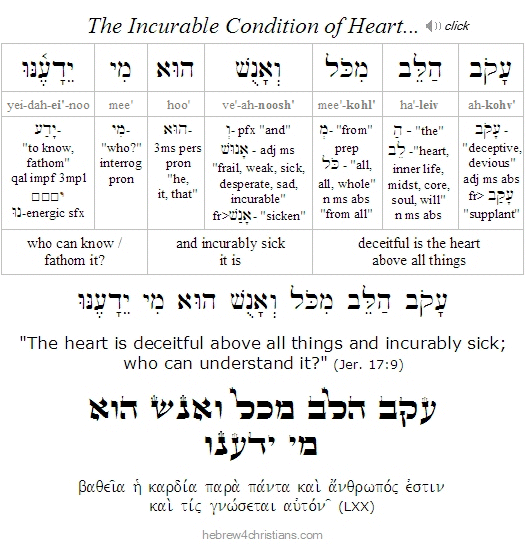 |
The heart is deceitful above all things, and incurably sick - mi yadeinu? - who can understand it? But how is the heart sick? By seeking excuses to evade the truth of its great need; by denying its own inner poverty... "No person is saved except by grace, yes; but there is one sin that makes grace impossible, and that is dishonesty; and there is one thing God must unconditionally require, and that is honesty" (Kierkegaard).
Julian of Norwich said, "All shall be well, and all shall be well and all manner of thing shall be well," and yet the darkest pitch of depression is precisely the inability to take hold of such hope... Faith in the midst of darkness must yet affirm that despite own sin, our own wretchedness, nothing will hinder nor overcome the working of God's goodness...
The Evils of Social Fascism...

[ When asked how it was possible that they basically ignored the Jewish Holocaust, one man replied, "We all knew. Nobody knew." ]
04.07.21 (Nisan 25, 5781) Tonight at sundown marks Yom HaShoah, or "Holocaust Remembrance Day," which again provides us with an opportunity to ask some difficult questions about the nature of evil, and in particular, the nature of political evil, and how it is possible that such evil is at first tolerated by society and then justified to establish and sustain a culture of fear and oppression that leads eventually to the madness of genocide...
A typical refrain heard at this time is Le'olam lo od - "Never again! Le'olam lo od - "Never again!" and yet it needs to be emphasized that not only could the madness of Nazi socialist fascism happen again, it is indeed already here, since the same dialectical mechanisms of social fascism are clearly at work in the world today - though in today's techno-fascist world the propaganda is global in scope, the scripted disinformation and cognitive dissonance are broadcast across cultures as a call for "unity," and the lockdown mindset is now ubiquitous... People have become self-censoring and the "cancel culture" suppresses freedom of thought and speech. "Groupthink" and sound bites have supplanted clear thinking and logical reasoning. You are now tagged as an enemy of the state if you dare question the official narrative or raise honest questions regarding the "science" that is used to justify the extreme measures of social control we are seeing today... The Vaccine Passport is the "Yellow Star" of today; those who do not "show their papers" will be either sent to "reeducation camps" or so ostracized that they will be unable to buy or sell in the globalist dystopian economy to come...
How did this happen? Why did people around the world surrender their God-given ability to use logic, to ask questions, and to seek for truth? What agitated the masses of humanity to abandon their personal freedoms for the sake of mere rumors and "politically manufactured" science? The answer, of course, is the power of the "Big Lie," the tactic that evil people have used for several centuries to foment disorder and insurrection - and then seize power. When asked how it was possible that they basically ignored the Jewish Holocaust, one man replied, "We all knew. Nobody knew." Today we see it in the threats of violence created by various "community organizers," in the "Antifa" movements funded by George Soros, and in Saul Alinsky's "Rules for Radicals" that even a former president studied so well...
Alisnky wrote: "[You must help] the people in the community ... feel so frustrated, so defeated, so lost, so futureless in the prevailing system that they are willing to let go of the past and chance the future. [An] organizer must shake up the prevailing patterns of their lives – agitate, create disenchantment and discontent with the current values, to produce, if not a passion for change, at least a passive, affirmative, non-challenging climate. [You must] fan the embers of hopelessness into a flame of fight" (Alinsky: Rules for Radicals). That's the recipe to create a "new world" according to many "community organizers." Create a sense of victimization to destroy the old order; rewrite the narrative of history; and then go on to enslave once again. What a cursed way of thinking...
Read this excerpt from the book "They Thought They Were Free, The Germans, 1933-45" by Milton Mayer (University of Chicago Press):
"What happened here was the gradual habituation of the people, little by little, to being governed by surprise; to receiving decisions deliberated in secret; to believing that the situation was so complicated that the government had to act on information which the people could not understand, or so dangerous that, even if the people could not understand it, it could not be released because of national security. And their sense of identification with Hitler, their trust in him, made it easier to widen this gap and reassured those who would otherwise have worried about it.
This separation of government from people, this widening of the gap, took place so gradually and so insensibly, each step disguised (perhaps not even intentionally) as a temporary emergency measure or associated with true patriotic allegiance or with real social purposes. And all the crises and reforms (real reforms, too) so occupied the people that they did not see the slow motion underneath, of the whole process of government growing remoter and remoter.
"You see," my colleague went on, "one doesn't see exactly where or how to move. Believe me, this is true. Each act, each occasion, is worse than the last, but only a little worse. You wait for the next and the next. You wait for one great shocking occasion, thinking that others, when such a shock comes, will join with you in resisting somehow. You don't want to act, or even talk, alone; you don't want to 'go out of your way to make trouble.' Why not?—Well, you are not in the habit of doing it. And it is not just fear, fear of standing alone, that restrains you; it is also genuine uncertainty.
Uncertainty is a very important factor, and, instead of decreasing as time goes on, it grows. Outside, in the streets, in the general community, 'everyone' is happy. One hears no protest, and certainly sees none. You know, in France or Italy there would be slogans against the government painted on walls and fences; in Germany, outside the great cities, perhaps, there is not even this. In the university community, in your own community, you speak privately to your colleagues, some of whom certainly feel as you do; but what do they say? They say, 'It's not so bad' or 'You're seeing things' or 'You're an alarmist.'
And you are an alarmist. You are saying that this must lead to this, and you can't prove it. These are the beginnings, yes; but how do you know for sure when you don't know the end, and how do you know, or even surmise, the end? On the one hand, your enemies, the law, the regime, the Party, intimidate you. On the other, your colleagues pooh-pooh you as pessimistic or even neurotic. You are left with your close friends, who are, naturally, people who have always thought as you have" (Chapter 13, "But Then It Was Too Late" Mayer: 1955).
The Holocaust was the result of cowardice and self-deception... The systematic, institutionalized, and "politically correct" genocide of the Jewish people was made possible solely because so many others - including nominal "Christians" - forfeited their God-given responsibility to live as authentic individuals by passively surrendering their will to "the crowd." But giving up your identity to join a gang inevitably leads to fragmentation of the soul, potentially inviting in a "legion of demons..." Regardless of whether it's a gang of thugs running an inner city neighborhood, or the pressure to keep quiet over ethical misconduct at your place of work, or the desire to feel "approved" as a good citizen of the state, or even the pressure to conform to a particular religious group, in either case, "losing yourself" in the midst of the crowd is an evasion, a cop-out, and a desecration of the image of God within you. Indeed following the crowd is a form of slavery where you surrender your freedom for the sake of a supposed sense of security... You become self-deceived because you no longer "own" yourself but became the ward of "another." Becoming a member of a crowd makes you into a copy or similitude, a shadow rather than a person of substance.
Popular leaders know how to work and bribe the crowd - whether they are big business leaders, professional politicians, or leaders of large religious organizations. Often they have the charisma that appeals to human vanity and oratory to "tickle the ears" of those who hear them speak. Politicians and "community organizers" understand how the crowd marginalizes the individual, how the voice of reason and conscience are suppressed, thereby eradicating the conviction and character of the solitary individual. Therefore the true prophet is always "a voice crying in the wilderness," an outsider to the crowd, always in collision with the world and its devices. The crowd-pleaser, on the other hand, carefully crafts his words for the applause of the mob. The crowd-pleaser is a flatterer and therefore the very antithesis of the prophet. Politicians and demagogues are masters at appealing to the gut instincts and lusts of a crowd, and therefore they are inveterate liars. They entice subgroups to follow their directives, to form self-regulating gangs, and to reward those who unquestioningly accept their "group-think." Leaders of the crowd invariably "see past" the individual and regard only numbers, general popularity, special interests, and the abstract role of "the people" in general. They justify their fascist thinking by making appeals to "the greatest good for the greatest number of people" and therefore sacrifice the dignity of the individual for the sake of the herd they wish to control...
The Kingdom of heaven is nothing like this at all, of course. Yeshua said: "You know that the rulers of the Gentiles lord it over them, and their 'great ones' exercise authority over them. It shall not be so among you. But whoever would be great among you must be your servant, and whoever would be first among you must be your slave" (Matt. 20:25-27). This is a call to recognize the sanctity of the lowly individual, to turn away from the evil vanity and abstractions of "political power" and worldly honor. As C.S. Lewis once remarked: "There are no ordinary people. You have never talked to a mere mortal. Nations, cultures, arts, civilizations - these are mortal, and their life is to ours as the life of a gnat. But it is immortals whom we joke with, work with, marry, snub and exploit - immortal horrors or everlasting splendors" (Weight of Glory: 1949).
For more information see:
Yom HaShoah Audio Podcast...
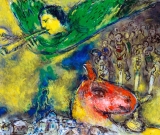
[ Yom HaShoah, or Holocaust Memorial Day, begins this evening at sundown... ]
04.07.21 (Nisan 25, 5781) Shalom chaverim. I made an audio podcast for Yom HaShoah, or Holocaust Remembrance Day (see the link below) wherein I discuss some of the philosophical influences that led to the atrocities of the attempted genocide of the Jewish people, including the rise of the idealism of G.W. Hegel and the pragmatic concept of the "dialectic" that was used to negate the value of the individual in preference to the collective.... Hegel directly influenced Karl Marx and his godless materialism and social revolutionary theories, and in general it may be said that German idealism led both to the nihilism of Friedrich Nietzsche and to barbarity of Adolf Hitler's national socialism. Though the subject matter is a bit philosophical, I nevertheless hope you will find it helpful.
Hating what is Evil...
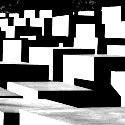
04.07.21 (Nisan 25, 5781) Contrary to the philosophy of this moribund world, the essence of love hates what is evil; just as it is hateful to be "tolerant" of what is wicked... Followers of Yeshua must love the truth and abhor the lie. Tolerating sin in a world ripe for judgment is a tacit form of "collaboration" with the enemy... Indeed, the only thing regarded as intolerable in the devil's world is the objection that people have a supposed "liberty" to sin. But the LORD is clear on this point: those who call evil good and good evil are subject to divine wrath and judgment. Therefore we are enjoined: "O you who love the LORD, hate evil" (Psalm 97:10). Yes, hate what is evil and love what is good (Amos 5:15). As King David said, "Do I not hate those who hate you, O LORD? And do I not loathe those who rise up against you? I hate them with complete hatred; I count them my enemies" (Psalm 139:21-22). The connection between loving God and hating evil is repeated in the New Testament: "Let your love be genuine (i.e., without a "mask" put on): abhor what is evil; cling to what is good (Rom. 12:9). If we truly love the LORD, let us walk in the awe of His great Name by hating what is evil.
Every day we make decisions regarding good and evil, and therefore every day we are deciding (i.e., proclaiming, teaching, attesting) what we love and what we hate. Choosing not to chose is itself a choice.... The issue is not whether we love or whether we hate, but what we love and what we hate. As it is written, "The fear of the LORD is to hate what is evil; pride and boasting, and the way of evil and perverted speech I hate."
Hebrew Lesson:
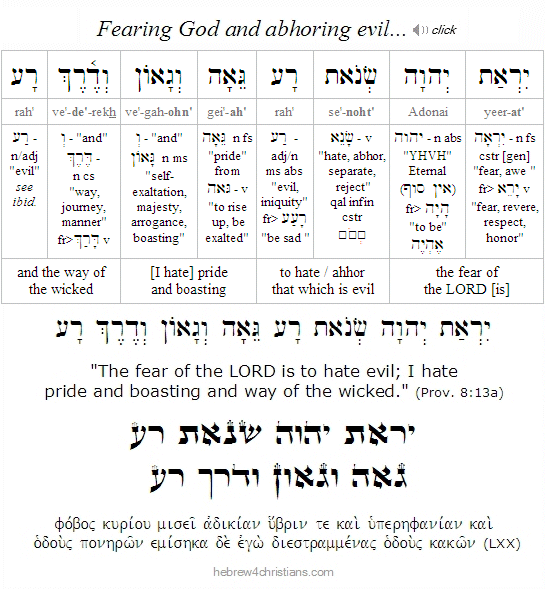 |
The Scriptures do not mince words with this issue. "There are six things that the LORD hates, seven that are an abomination to him: haughty eyes, a lying tongue, and hands that shed innocent blood, a heart that devises wicked plans, feet that make haste to run to evil, a false witness who breathes out lies, and one who sows discord among brothers" (Prov. 6:16-19). "I hate and abhor lying, but I love Your law" (Psalm 119:163). "Take no part in the works of darkness, but instead expose them" (Eph. 5:11). The cross of Messiah is meaningless if God does not really hate sin, violence, and evil... The heartcry of the tzaddik adjures: "O you who love the LORD, hate evil" (Psalm 97:10).
"There may be times when we are powerless to prevent injustice, but there must never be a time when we fail to protest." - Elie Wiesel
Of course it is usually best to use the "good eye" and to be spontaneous in our recognition and pursuit of the good, though there are times - as there were in the days of Hitler's Germany and perhaps today - when the fight comes to our door, so to speak, and we must deal with it... Part of the reason popular culture has become so decadent, at least in America, is because people have confused "loving others" with tolerating evil. We must be careful here. It is not loving to ignore the spiritual needs of others, nor is it kindness to pretend not to see what enslaves and harms people. We have a duty to speak the truth in love, even if that is offensive to a culture that intractably seeks the so-called liberty to do evil...
Beauty for Ashes...
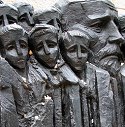
[ Yom HaShoah, or Holocaust Memorial Day, begins this evening at sundown... ]
04.07.21 (Nisan 25, 5781) Some people mark the date of November 9, 1938 as the start of the Jewish Holocaust. On that dreadful night - called Kristallnacht, "the Night of Broken Glass" - thousands of Germans, organized by the Nazis, destroyed over 1,000 synagogues, burned precious Torah scrolls and prayer books in town squares, ransacked and looted over 7,000 Jewish businesses, and invaded and terrorized many Jewish homes. Many Jews were killed during the attacks, and 30,000 Jewish men were arrested and taken away to the concentration camps. Kristallnacht was followed by further persecution of the Jews and is viewed by most historians as the pogram that initiated the infamous "Final Solution."
To readily identify who was a Jew to the authorities, Hitler ordered all subjugated peoples of Jewish descent to wear yellow stars of David on their clothing. Hitler relied on non-Jews to spy on and identify all those who did not comply. When the order to wear the star was issued in Holland, however, an underground newspaper made 300,000 yellow stars that said, "Jews and non-Jews stand united in their struggle," and distributed them to the public to express their solidarity with the plight of the Jewish people. In Denmark, too, the "yellow star law" was rebuffed, and King Christian X was reported to have said that if the law were to be enforced by the Nazis, he pledged to wear one himself, as would all the other people of Denmark. Later, the Danish resistance movement (with the help of ordinary Danish citizens) opposed the Nazis by safely evacuating the Jews to nearby neutral Sweden.
By far the largest act of civil resistance against Hitler and the Nazis occurred during the Warsaw Ghetto Uprising, which took place in Poland on the eve of Passover, April 19, 1943. Unfortunately most Jews were unable to defend themselves because oppressive gun control laws had disarmed the population; nevertheless, it still took the Nazi war machine nearly a month to vanquish the ghetto - longer than it took for Hitler to overcome the entire country of Poland. Because the Warsaw Ghetto Uprising symbolized Jewish resistance against the Nazis, in 1953, after the State of Israel was formed, it was proposed to observe Yom HaShoah on the anniversary of the uprising -- on the 14th of Nisan -- but this date was rejected because it marked the start of Passover. After considerable debate, the memorial was postponed until after the Passover holiday week was over, on the 27th of Nisan, eight days before Yom Ha'atzma'ut, or Israeli Independence Day.
While there is no official "haggadah" for the Yom HaShoah memorial, it is traditional to light a yellow yahrzeit candle for those who died, to attend a Yom HaShoah memorial service, and to recite kaddish. Some people prepare a lavish meal using recipes written from memory by the starving women of Theresienstadt (salvaged after the war). Many of these recipes are for rich desserts and cakes, recalling days of joy before the women and their families were rounded up and brought to the concentration camps. During the memorial meal, stories of Jews who died are told, as well of those of survivors. Many survivors tell stories about the "hidden children" who were saved by righteous Gentiles (חֲסִידֵי אוּמוֹת הָעוֹלָם). These young survivors were either hidden in secret places (like Anne Frank) or were "adopted" by Christian families who pretended they were their own children.
Though we can't control what happens in this dangerous world, we can trust that God is working all things together for good, even during times of severe testing, and even in things that are blatantly evil (Rom. 8:28; Gen. 50:20). And while we instinctively recoil at the prospect of physical death, there are decidedly things worse than death itself, namely, losing hope in life, walking in the darkness of despair, living a joyless existence because of fear. As much as we abhor evil - and we must resist it with all our hearts - even more must we love the good - and cling to God (וּלְדָבְקָה־בוֹ) with all that is within us.
Ultimately, the most important thing to remember regarding death is the truth about God's salvation (יְשׁוּעָה). After all, God assuredly hates death and provides each of us with its eternal remedy: By clothing himself in human flesh, Yeshua embraced mortality itself and willingly bore the penalty for your sins, exchanging his life for yours, thereby destroying the one who had the power of death, namely the devil, and by so doing, set you free from slavery to the dread of death (Heb. 2:14-15). To those who belong to belong to Messiah, death represents a passage to eternal life and the loving presence of God Himself.
Only the miracle of faith can see hope in the face of radical evil... and yet that is the very message of the cross of the Messiah... Our Lord demonstrated that He is the the Killer of death itself; the Slayer of the Serpent; and the ultimate Triumph of God's Light over the realm of despair and everlasting darkness... He is the First and the Last, the Living One who died, and behold is alive forevermore, the true Keyholder of Death and Hell (Rev. 1:18).
Hebrew Lesson:
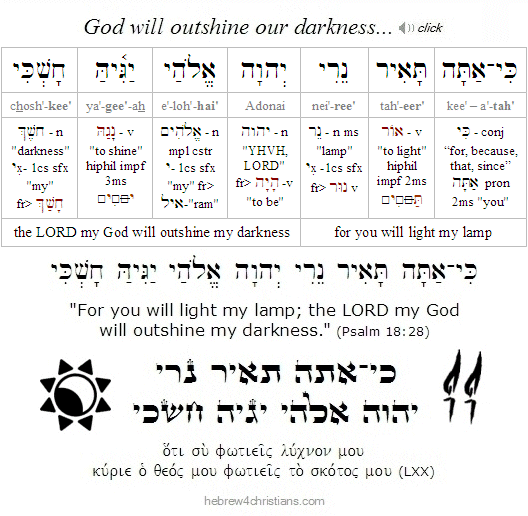 |
Kaddish and Providence...

[ The following is related to Yom HaShoah, or Holocaust Memorial Day... ]
04.06.21 (Nisan 24, 5781) Since we are required to both affirm and to trust that "all things work together for good" (Rom. 8:28), we must bless God for perceived evil as well as for perceived good, since all circumstances of life come from the hand of the LORD our God (Job 2:10). Despite appearances that sometimes seem to the contrary, we believe that the all-powerful, supreme LORD has not abandoned the world but actively sustains and upholds it with benevolent intent (Heb. 1:3). "We walk by faith and not by sight" (2 Cor. 5:7). When bad things happen to the righteous, we trust in God's personal care for their ultimate good, despite their present troubles. As the prophet Job said: "Though he slay me, I will trust in Him" (Job 13:15). This is the heart behind the Kaddish, the mourner's prayer, that expresses acceptance of God's world, despite the pain, sorrow, loss, and so on.
The term hashgachah pratit (השׁגחה פרטית) refers to God's personal supervision of our lives (hashgachah means "supervision," and pratit means "individual" or "particular"). Since He is the Master of the Universe, God's supervision reaches to the smallest of details of creation - from subatomic particles to the great motions of the cosmos. God not only calls each star by its own name (Psalm 147:4), but knows each particular lily and sparrow (Matt. 6:28-30, 10:29). Each person created in the likeness of God is therefore under the direct, personal supervision of God Himself -- whether that soul is conscious of that fact or not. As Yeshua said, even the hairs on your head are all numbered (Matt. 10:30). Indeed, the God of Israel is called אלהי הרוּחת לכל־בּשׂר / Elohei ha-ruchot lekhol-basar: "The God of the spirits of all flesh" (Num. 16:22), and that means He is LORD even over those who vainly attempt to suppress His Presence and reality. "Can a man hide himself in secret places so that I cannot see him? declares the LORD. Do I not fill heaven and earth?" (Jer. 23:24).
The Talmud says that when Moses asked God, "Please show me your glory" (Exod. 33:18), he was asking for God's vindication in the light of the gnawing question: "Why do the righteous suffer while the wicked prosper?" Moses was not given an explicit answer, and some of the sages said he wrote the enigmatic Book of Job to demonstrate that the question can only be reduced to God's inscrutable will: "Where were you when I laid the earth's foundation?" (Job 38:4). In other words, the question can only be answered by the One who knows the beginning from the end, the Infinite One who sees the implications and concatenation of all things. As finite beings, we see only a fraction of the big picture, and therefore we must yield our trust to the Wisdom and Power of Almighty God (Deut. 32:4).
It is written, "Your eyes saw me when I was inside the womb; in your scroll everything was written, my days were ordained before they came into existence" (Psalm 139:16). In light of God's providential ordering of our lives, Blaise Pascal asked, "What is left for us but to unite our will to that of God himself, to will in him, with him, and for him the thing that he has eternally willed in us and for us." The Mishnah says it this way: "Do His will as if it was your will that He may do your will as if it was His will" (Avot 2:4). In other words, what else can we do but learn to trust, accept, and to say "yes" to life -- even if at times we may feel like orphans, lost in a fatherless world... All our days are recorded in God's scroll.
Hebrew Lesson:
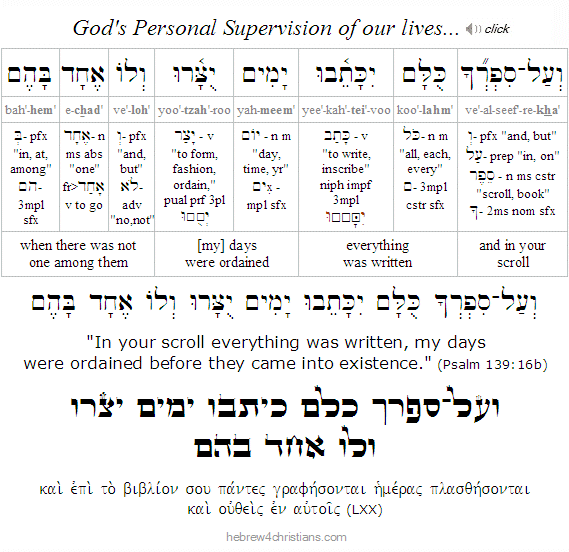 |
There is a dark temptation to refuse to accept God's sovereign will, which includes objecting to his "tolerance" of evil (for a season) until his greater plan for the redemption is fully manifest... We need to be careful lest we become hardhearted, bitter, and despair over the purpose for life - like Ivan in The Brother's Karamazov (Dostoevsky) who, though he intellectually gave assent to God's providential plan, refused to accept it because of the unspeakable cruelty and senseless suffering he saw in the world. His disillusionment moved him to say to his sincerely devout brother: "It's not God that I don't accept, Alyosha, only I most respectfully return him the ticket." How tragic that the heart can turn away from God because the present moment seems incomprehensible and broken.... How many people have so despaired when, if they had but held on for awhile longer, they may have received solace and comfort... For me it helps to remain humble, to confess my ignorance of much, and to "remember the future" wherein glory and beauty will be soon be revealed (Psalm 31:19).
Hebrew Lesson
Psalm 31:19a reading (click):
 |
For more on this, see the meditation entitled "Paradox and Presence."
Beware of Christian Anti-Semitism...
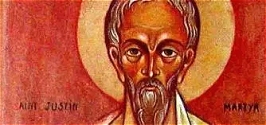
[ The following is related to Yom HaShoah, or "Holocaust Remembrance Day"... ]
04.06.21 (Nisan 24, 5781) We must always be vigilant whenever we hear expressions of "anti-Semitism," especially from those who claim they are followers of Yeshua the Messiah... Recently I listened to a sermon on the resurrection delivered by a well-known evangelical minister who repeatedly made various anti-Semitic statements during his sermon. For example, this preacher said, "The Jews had tried to get rid of Jesus since he first arrived; they tried, when he was just a young child, to get rid of him by pulling off a mass murder of all the male children in the Bethlehem area. They pronounced curses on him; they ascribed him to demonic power in efforts to discredit him... they used injustice to sentence him, false witnesses to tell lies about him, blackmail against Pilate to get him executed... and bribery to silence the truth of the resurrection." The preacher went on to decry the lies of "the Jews," collectively blaming them for their unbelief and treachery, lamenting their deceptive tactics, and so on. It was grievous for me to hear this...
Friends, we must learn to think clearly and to get our terms properly defined before we make such inflammatory statements. Certainly not all of the Jewish people rejected Jesus and his message, and indeed the Jews were his first followers -- and many even died for their faith in him. Nevertheless I became alarmed as I listened to this popular preacher emphatically saying that "the Jews" sought to murder Yeshua when he was just a young child -- referring of course to Herod's murder of the children as described in Matthew's gospel -- without understanding that this heinous decree did not originate from the Jewish people but rather from a psychopathic despot who was not even ethnically Jewish (Herod "the Great" was an "Idumean," that is, a descendant of Esau, and a puppet of pagan Rome). To say or even insinuate, then, that "the Jews" tried to murder Jesus in this case is therefore both inaccurate, inflammatory, and based on ignorance. It is like saying "all Germans were Nazis," or "all African Americans are democrats," or "all who study the Torah are legalists," or some other racist or obtuse generalization.
I do not want to belabor this point, but it is essential that we learn to think clearly when we draw our conclusions from the Scriptures. The general term "the Jews" as used in the New Testament (οἱ ᾽Ιουδαῖοι) needs to be qualified to understand what is meant by that word in a given context. Meaning is always determined by context. After all, Jesus himself was a Jew, born the "King of the Jews," his family was Jewish, his first followers were all Jews, and many of the "lost sheep of the house of Israel" believed in him. Moreover Jesus plainly said, "Salvation is of the Jews" (John 4:22). Remember that the early "church" was a Jewish movement and it was considered scandalous that a Gentile could find salvation at all! Keep in mind that genuinely Christian theology is firmly rooted in the Jewish Scriptures and that the message of the gospel is impaired and even lost if the church forgets that it is "grafted in" to the covenants, promises, and blessings given to the Jewish people (Eph. 2:11-12).
Hebrew Lesson:
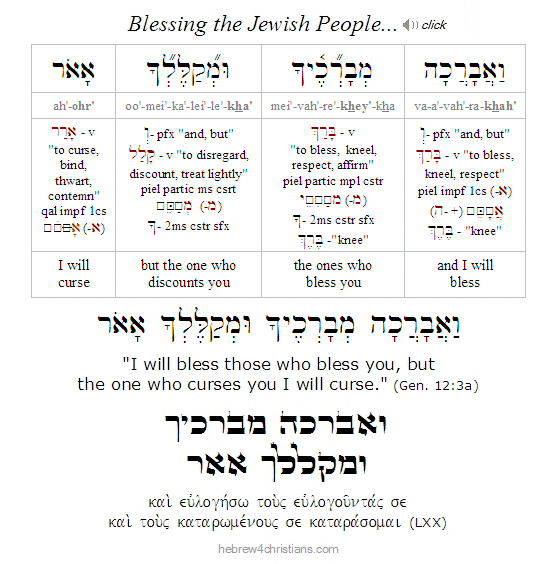 |
So pastors and teachers -- be careful with your words. Learn to identify your theological assumptions and how they affect our thinking. This admonition should be obvious enough, though it is all too common for people to make misjudgments because they devalue the effort required to carefully (and honestly) think through an issue. As William James once said, "A great many people think they are thinking when they are merely rearranging their prejudices." When it comes to questions about the gospel, however, God regards such carelessness to be blameworthy (Acts 17:30-31). Brothers and sisters, we have an "epistemic duty" to think clearly and to use right reason (2 Tim. 2:15). Again, the LORD holds us personally accountable for what we think, believe, and say -- especially when it comes to the reality and mission of His Son (Matt. 7:21-23; 12:36-37).
False teachers inevitably "twist the Scriptures" by offering unsound interpretations contrary to the ruach, or spirit of the Hebrew prophets, and by evading the commandment to "rightly divide" the word of Truth according to basic logic and clear thinking (2 Tim. 2:15; 2 Pet. 1:20-21; 3:16). In Christian circles, they often come in the name of the law (legalism) or in the name of grace (licentiousness), but rarely do they take the trouble to carefully (and equitably) work through the paradoxical tensions. False teachers are uncomfortable humbly confessing they don't know something, and therefore they are quick to style themselves as an infallible prophet or source of authoritative wisdom...
There is no substitute for taking the time and energy to humbly study Torah, friends, and we should be suspicious of those who claim special insight when it is evident that they have not really labored working through the Scriptures... All disciples of Yeshua are called "students," or talmidim (תלמידים), a word that comes from lamad (לָמַד) meaning "to learn" (the study of Scripture is called talmud Torah (תַלְמוּד תּוֹרָה) from the same root). Among other things, then, following Yeshua means becoming a student of the Jewish Scriptures that he both loved and perfectly fulfilled (Matt. 5:17-18; Luke 24:44-45). Only after learning the truth of the Scriptures will you be equipped to "go to all the nations and teach" others (Matt. 28:19). This is accomplished not merely by explaining (propositional) doctrine but by kiddush HaShem -- sanctifying the LORD in our lives (1 Pet. 1:15-16). "You shall know them by their fruits..."
Let me add that the problem of generalization is not restricted to statements made about "the Jews" in the Gospels, but is really a challenge we face throughout Scripture. For instance, the word "law" (i.e., νόμος, "nomos") has a range of semantic meanings in Koine Greek and therefore should not automatically be regarded as an equivalent for the term "Torah" (תורה). As I've explained over the years, the word "Torah" is derived from the verb yarah (ירה) meaning to "shoot" (as an arrow), or to indicate direction. It is therefore a general term that refers to instruction or guidance, and should be carefully distinguished from other Hebrew words such as "commandment" (i.e., mitzvah: מצוה), "statutes" (i.e., chukkim: חקים), "judgments" (i.e., mishpatim: משׁפתים), and so on. To traditional Jewish thinking, the legal aspect of Torah is generally called halakhah (from halakh: הָלַךְ, "to walk") and includes the ideas of case law (i.e., takkanah: תַּקָּנָה), custom (ie.., minhag: מִנְהָג), and the use of tradition (i.e., masorah: מָסרֶת) as expressed within the Oral Law. The legal aspects of Torah have roots in the system of judges (i.e., shoftim: שּׁפְטִים) that Moses commissioned (Exod. 18:13-24; Deut. 16:18, 19:17-18, etc.) and in the Bet Din (בֵּית דִן), or religious system of justice that culminated in the supreme court (or great assembly) of Israel called the Sanhedrin (סַנְהֶדְרִין). So you see, then, that saying "the law" is this or that must be carefully qualified lest you generalize and speak untruth...
In light of this, it is "awkward" that the ancient Jewish translators of the Scriptures (i.e., the Septuagint) chose to use the word "law" (i.e., nomos) for the word Torah, since this can easily lead to misunderstanding about the meaning of the Torah. From a new covenant point of view it is crucial to distinguish between the language of commandment and the language of covenant. We are not "under the law" in terms of the Sinai covenant, but that does not mean we are without Torah or are "lawless" people (Matt. 5:17-19). Again, we must be careful to make the proper distinctions in Scripture lest we fall into serious error. God tests our hearts, friends, as we read and study the Scriptures. Humbly ask Him for wisdom and remember to be honest that sometimes we just don't have all the information to form an dogmatic conclusion about a particular issue. Shalom.
Some Related Topics:
Seeing the Sacred...

04.06.21 (Nisan 24, 5781) From our Torah reading for this week (i.e, parashat Shemini) we read: "This is the thing that the LORD commanded you to do, so that the glory of the LORD may appear to you" (Lev. 9:6). The sages here comment that if you wish to know if your action is something God wills, then see if leads to the revelation of the glory of God... In other words, "the thing" (זֶה הַדָּבָר) that God wants for us is to behold the Sacred Presence that pervades and upholds all things. Indeed the Hebrew word for seeing, ra'ah (רָאָה) is connected with the word "awe," yarah (יִרְאָה). When we really see life as it is, we will be filled with wonder over the glory of it all. Every bush will be aflame with the Presence of God and the ground we walk upon shall suddenly be perceived as holy (Exod. 3:2-5). Nothing will seem small, trivial, or insignificant. May it please you, O LORD, to so open our eyes... Amen.
Hebrew Lesson:
The Sanctity of Love...

[ The following is related to our Torah reading this week, parashat Shemini... ]
04.06.21 (Nisan 24, 5781) Our Torah portion for this week provides a summary statement about the intent of God's heart for those whom he has called: "For I am the LORD who brought you up out of the land of Egypt to be your God. וִהְיִיתֶם קְדשִׁים כִּי קָדוֹשׁ אָנִי - You shall therefore be holy, for I am holy" (Lev. 11:45, cp. 1 Pet. 2:16). This is repeated throughout Torah: "You shall be holy to me, for I the LORD am holy and have separated you from the peoples, that you should be mine" (Lev. 20:26); "For you are a people holy to the LORD your God, and the LORD has chosen you to be a people for his treasured possession, out of all the peoples who are on the face of the earth" (Deut. 7:6). We are chosen to be a "kingdom of priests," a set-apart people, and a light to the nations (Exod. 19:6; Isa. 42:6; 1 Pet. 2:9). Indeed this is the starting point for all true holiness: to understand that you are beloved of God, cherished and set apart to live in the fellowship of his love...
Hebrew Lesson
Lev. 11:45b Hebrew reading:
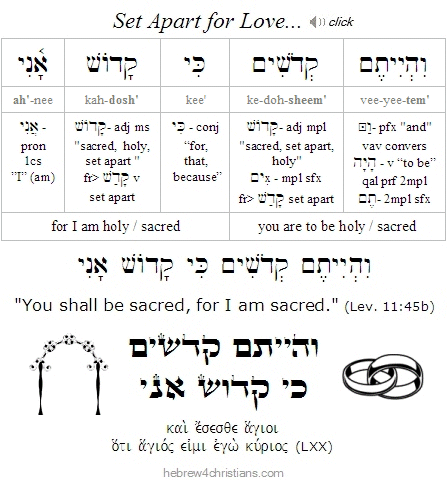 |
|


























































